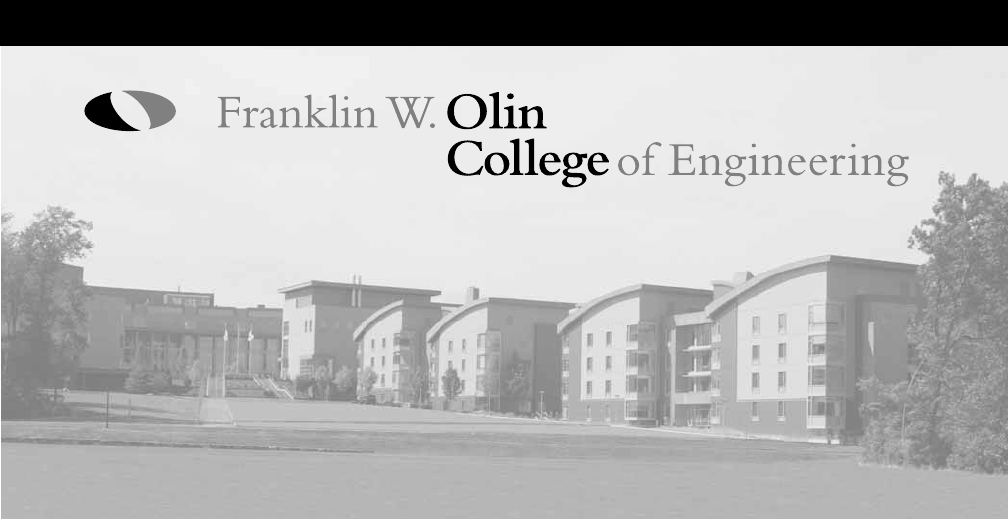
Catalog 2007
–
08

Photos: M.J. Maloney, Mark C. Flannery (aerial photos)
© 2007, Franklin W. Olin College of Engineering
Message from the Vice President for Academic Affairs 3
Olin Mission 4
Olin History 5
Program Descriptions 7
Course Listings 25
Academic Policies 55
Student Life Overview 67
Admission, Expenses, and Need-Based Aid 73
Faculty Profiles 79
Board of Trustees, President’s Council, and Senior Administration 95
Appendices 105
Academic Partnerships
Accreditation Statement
ABET Accreditation Status
Non-discrimination Statement
Academic Calendar for 2007–08 109
TABLE OF CONTENTS ■
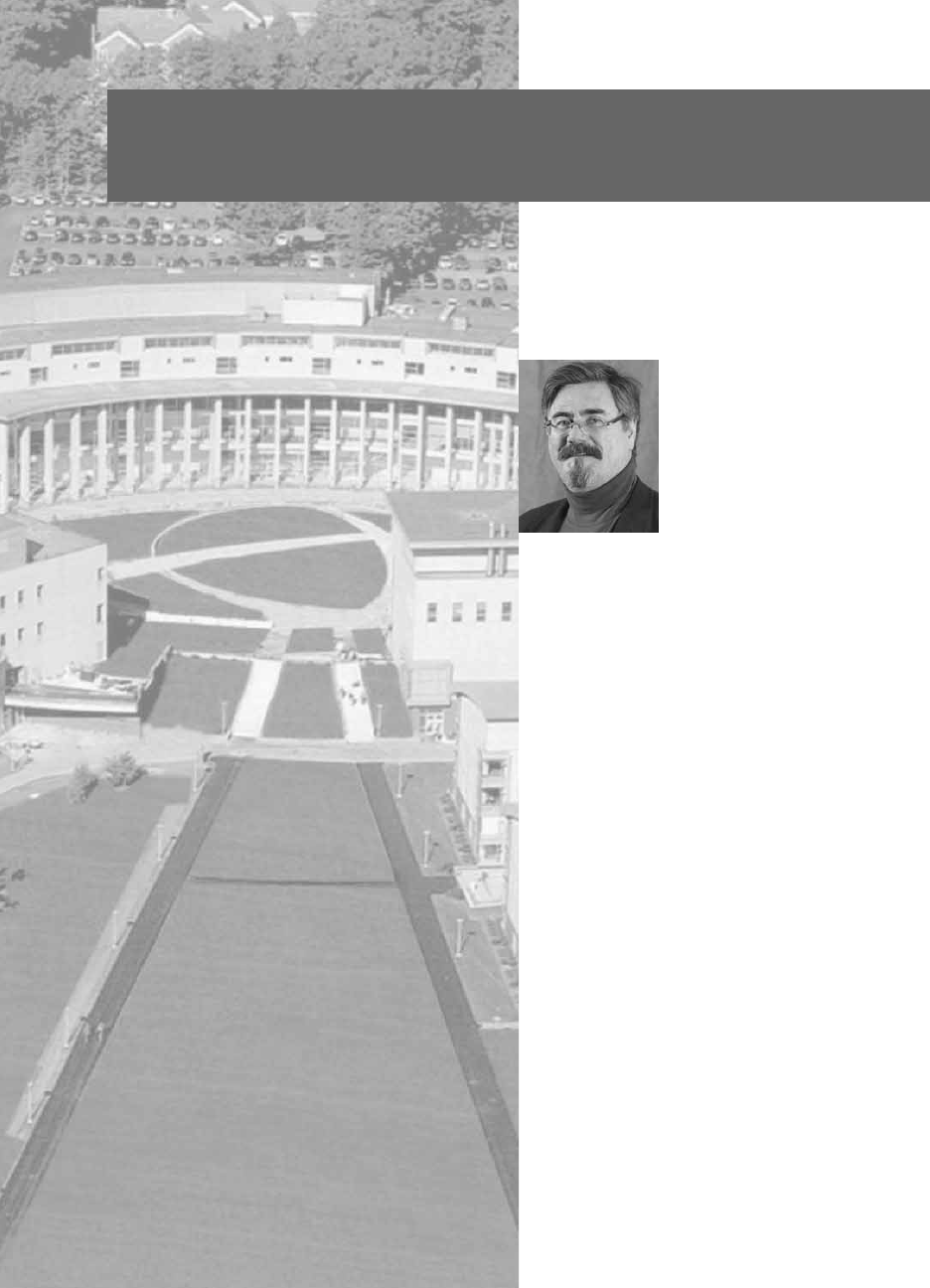
From its inception, Olin College has been about
innovation and high standards. Our curriculum
is the product of an unusual collaboration
among faculty, staff, and students that is aimed
at continually improving our
academic program. In a sense,
our curriculum will never be
a finished product. We will
always be enhancing it in
pursuit of our mission of
providing a superb engineering
education to the nation’s brightest and most
enterprising students.
As you will see when you look through this cat-
alog, Olin’s academic program consists of more
than just traditional engineering courses. Olin
students often work in interdisciplinary teams
in a project-based learning environment. The
curriculum provides not only a first-rate engi-
neering education, but also opportunities to
explore entrepreneurship and a broad selection
of the liberal arts.
Olin views its program as a “learning continu-
um” that connects and often blends the formal
academic program to co-curricular activities,
research with faculty, clubs, community service
and “Passionate Pursuits.” The learning contin-
uum is vital for the kind of vibrant, student-
centered culture we have created at Olin — a
culture that fosters hands-on learning, creativity,
entrepreneurial thinking, and discovery. We
invite you to explore Olin College.
Dr. Michael E. Moody
Vice President for Academic Affairs
and Dean of Faculty
Message from the Vice President
for Academic Affairs

College Mission Statement
Olin College prepares future leaders through an
innovative engineering education that bridges
science and technology, enterprise, and society.
Skilled in independent learning and the art of design,
our graduates will seek opportunities and take
initiative to make a positive difference in the world.
Long-term Aspiration
Olin College aspires to establish and maintain a position as
a national leader in the development of new and effective
approaches to undergraduate engineering education. It is our
intent that, as we realize our mission, the educational and
student life concepts and approaches we develop will inspire
change at other respected engineering schools.

Olin History
Olin, the Man
Franklin W. Olin (1860–1951) was an engineer,
entrepreneur, and professional baseball player.
Raised in Vermont lumber camps and lacking a
high school diploma, he qualified for entrance
to Cornell University through self-instruction.
At Cornell he majored in civil engineering and
was captain of the baseball team. He even
played major league baseball during the sum-
mers to finance his education. He went on to
found the company known today as the Olin
Corporation, a Fortune 1000 company.
Olin, the Foundation: F. W. Olin
Foundation
In 1938, Mr. Olin transferred a large part of this
personal wealth to a private philanthropic foun-
dation. Over the subsequent two-thirds of a
century, the F. W. Olin Foundation awarded
grants totaling nearly $800 million to construct
and fully equip 78 buildings on 58 independent
college campuses. Recipients include Babson,
Bucknell, Carleton, Case-Western, Colgate,
Cornell, DePauw, Harvey Mudd, Johns
Hopkins, Marquette, Rose-Hulman Institute,
Tufts, University of San Diego, University of
Southern California, Vanderbilt and Worcester
Polytechnic. In 2004 the Foundation announced
its intention to transfer its remaining assets to
Olin College and close its doors. This final
grant brings the Foundation’s total commit-
ment to Olin College to more than $460 million,
which is one of the largest such commitments
in the history of American higher education.
Olin, the Vision
Starting in the late 1980’s, the National Science
Foundation and engineering community at-
large began calling for reform in engineering
education. In order to serve the needs of the
growing global economy, it was clear that
engineers needed to have business and
entrepreneurship skills, creativity and an
understanding of the social, political and
economic contexts of engineering. The F. W.
Olin Foundation decided the best way to maxi-
mize its impact was to create a college from
scratch to address these emerging needs.
Olin, the College
The Franklin W. Olin College of Engineering
received its educational charter from the
Commonwealth of Massachusetts in 1997,
the same year the Foundation announced its
ambitious plans for the college. Planning and
architectural design work for a state-of-the-art
campus began almost immediately. By the
end of 1999, the new institution’s leadership
team had been hired and site development
work commenced on 70 acres adjacent to
Babson College. Olin’s first faculty members
joined the college by September 2000.
The college officially opened in fall 2002 to its
inaugural freshman class. In the year prior to
the opening, 30 student “partners” worked
with Olin’s world-class faculty to create and
test an innovative curriculum that infused a
rigorous engineering education with business
and entrepreneurship as well as the arts,
humanities and social sciences. They devel-
oped a hands-on, interdisciplinary approach
that better reflects actual engineering practice.
State-of-the-art facilities matched with first-rate
students, nationally renowned professors and
unbridled enthusiasm, have quickly established
Olin as a nationally recognized center for inno-
vation and excellence in engineering educa-
tion. Olin graduated its first class in May 2006.
FRANKLIN W. OLIN COLLEGE OF ENGINEERING
■ OLIN HISTORY
CATALOG
5

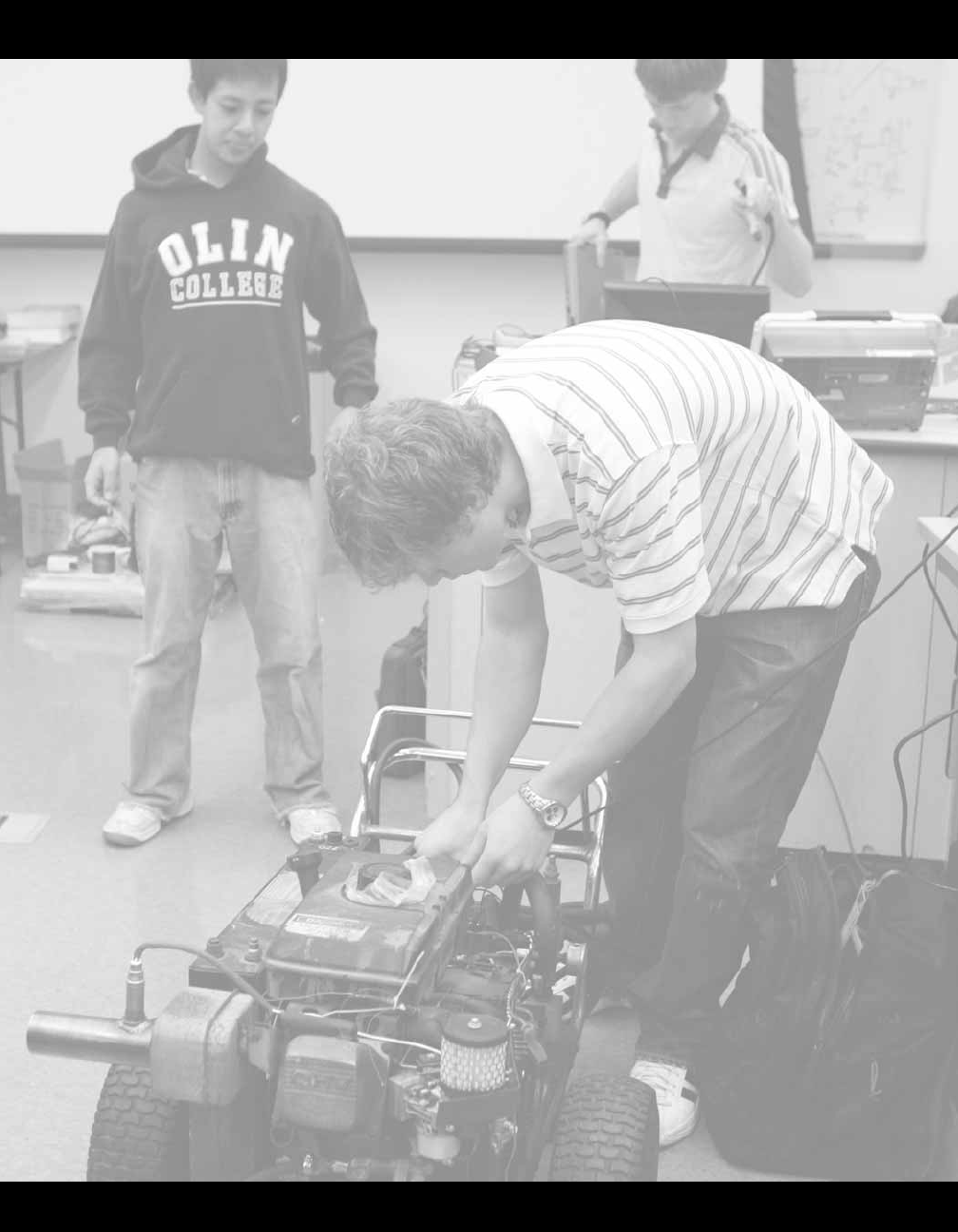
Program Descriptions

Objectives, Pedagogy and
Curriculum
Introduction
Engineering education at Olin is in the liberal
arts tradition, with a strong emphasis on the
Arts, Humanities, Social Sciences, and
Entrepreneurship. Olin is committed to prepar-
ing graduates who recognize the complexity of
the world, who appreciate the relationship of
their work to society, and who are dedicated to
creative enterprises for the good of humankind.
Olin College endeavors to provide its education
at little cost to the student.
Olin College strives to foster in students:
• a deep appreciation and comprehension
of the principles of engineering analysis
and design;
• a broad knowledge of social and
humanistic contexts;
• the ability to identify opportunities, articu-
late a vision, and see it to fruition; and
• dedication to intellectual vitality, commu-
nity involvement and lifelong personal
growth.
Objectives
Olin’s educational program helps students
become individuals who:
1. Can make a positive difference within
their profession and their community.
2. Demonstrate technical competence and
creative problem-solving skills that foster
success in a variety of postgraduate envi-
ronments, including professional practice
and graduate school.
3. Are prepared for and capable of appropri-
ate response to social, technical and
global changes.
We hope that, after graduation, our students
will increasingly demonstrate achievement of
these objectives as follows:
1. They will demonstrate the ability to rec-
ognize opportunity and to take initiative.
They will be able to communicate effec-
tively and to collaborate well with others.
They will understand the broad social,
economic and ethical implications of their
work, and will be cognizant of their pro-
fessional responsibilities.
2. They will have a solid grounding in fun-
damental principles of science and engi-
neering and the ability to apply this
knowledge to the design, analysis, and
diagnosis of engineering systems. They
will be able to develop creative design
solutions that are responsive to technical,
social, economic and other realistic con-
siderations.
3. They will demonstrate the results of a
broad education that spans math, sci-
ence, engineering, the arts, humanities,
social sciences, and entrepreneurship.
They will build on this foundation
throughout their careers by engaging in
independent learning in order to identify
and respond to emerging technical and
social developments.
Pedagogy
Olin College’s educational perspective provides
a distinctive student experience designed to
foster student engagement and development.
Some of the key features of the Olin College
experience are described in the following
paragraphs.
Hands-On Learning
Olin has a strong commitment to incorporating
hands-on educational experiences through lab
and project work in many courses. From the
outset of the curriculum, students build techni-
cal knowledge and develop practical skills by
analyzing, designing, or fabricating engineering
systems. First year Integrated Course Blocks
(ICBs) provide hands-on projects involving the
modeling, simulation, and analysis of engineer-
ing systems. Science courses offer opportuni-
8
CATALOG
FRANKLIN W. OLIN COLLEGE OF ENGINEERING
PROGRAM DESCRIPTIONS ■

FRANKLIN W. OLIN COLLEGE OF ENGINEERING
■ PROGRAM DESCRIPTIONS
CATALOG
9
ties for experimental design and the use of
modern instrumentation and testing tech-
niques. The design stream offers opportunities
for students to design, prototype, and test solu-
tions to authentic problems.
Open-Ended Project-Based Learning
Throughout the curriculum, Olin students grad-
ually build competency in solving open-ended
problems. Projects are found in all four years
of the curriculum, and project experiences
gradually increase in scale, complexity, and
realism as students develop their knowledge
and skills. In open-ended projects, student
teams identify and define problems, assess
opportunities, apply technical knowledge,
demonstrate understanding of contextual fac-
tors, muster appropriate resources to solve
problems, and apply skills such as teamwork,
communication, and idea generation. Olin’s
open-ended project emphasis culminates in an
ambitious two-semester SCOPE project that
engages student teams in significant design
problems with realistic constraints.
Multidisciplinary Integration
Olin experiences are designed to build connec-
tions between fundamental science, mathemat-
ics, and engineering; between different fields of
engineering; between the arts, humanities and
social sciences and technical disciplines; and
between business, entrepreneurship, and tech-
nology. As a result, the Olin curriculum is con-
ceived and taught in a highly interdisciplinary
way.
In the first year, students learn in Integrated
Course Blocks (ICBs) designed to take advan-
tage of the synergies that exist among mathe-
matics, science, and engineering topics,
including coordinated opportunities for stu-
dents to apply fundamental math and science
to real engineering problems and that further
elucidate important linkages among discipli-
nary topics.
In addition to the first-year ICBs, Olin builds
multidisciplinary connections through tightly
coupled, faculty team-taught courses such as
the Paul Revere: Tough as Nails course block
that links history of technology with materials
science. Many other courses feature teaching
or visits from faculty members who share dif-
ferent perspectives and thereby help students
understand the broader context and implica-
tions of their work.
Competency Assessment
In addition to course-based graduation require-
ments, Olin develops and assesses student
growth in a number of overarching competen-
cy areas. Through Olin’s competency learning
and assessment system, students demonstrate
skill in essential areas such as communication,
qualitative understanding and quantitative
analysis, teamwork, contextual thinking, oppor-
tunity assessment, diagnosis, design, and life-
long learning.
Feedback
Olin College fosters a culture of continual
feedback and improvement. Olin’s curriculum,
courses, and extra-curricular activities are
shaped by student input and feedback. Faculty
solicit student feedback and routinely adjust
course direction and areas of emphasis to
better address student educational needs.
Students are expected to be active learners
and participants in the process of continual
improvement.
Individualized and Student-Designed Options
Olin students may design or customize many
aspects of their educational experience. Many
Olin courses include student-designed compo-
nents such as projects, self-study modules, and
selection of emphasis areas. More substantial
student-designed and student-driven learning
may be found in the following activities:
Self-Study The Olin Self Study (OSS) is a four-
credit institutional requirement in which each
student works independently to select and
study a body of literature in an area of interest-
ed. It is an opportunity to develop the skills and
attitudes of life-long learning, a competency
Olin considers vital for engineers working in an
environment of rapidly-changing technology.
SCOPE and Capstones A student’s final year at
Olin centers on an ambitious year-long Senior

COnsulting Program for Engineering (SCOPE)
project. A typical SCOPE project is undertaken
by a team of four to eight students under the
supervision of an Olin faculty member and
serves an external partner. The SCOPE project
prepares students for life and work in their cho-
sen profession. In addition, each student
undertakes a self-designed one-semester
Capstone project in an area of interest within
the Arts, Humanities, Social Sciences, or
Entrepreneurship.
Cross Registration Most students choose to
complete some degree requirements at Olin’s
neighboring institutions. Cross registration
agreements are in place at Wellesley, Babson,
and Brandeis, enabling Olin students to benefit
from other institutions’ expertise in the arts,
humanities, social sciences, natural sciences,
and business topics.
Self-Designed Engineering (E) Degree
Concentrations Besides designated concentra-
tions, the Engineering (E) degree offers stu-
dents the opportunity to design their own
concentrations, subject to review and approval
by the Engineering Program Group.
Away Experience The Olin curriculum is
designed so that students who wish to spend
a semester away from the College can do so.
The away experience may take several forms
including experience abroad or at another U.S.
institution in a new cultural setting. The away
experience can occur during a semester or a
combination of a semester and summer.
Research Some students choose to enhance
their educational experience through participa-
tion in research activities. Olin offers many
opportunities for faculty-directed undergradu-
ate research, both during the academic year
and during the summer. Students may receive
either academic credit or pay for a research
activity. Students are encouraged to become
involved in research early in their undergradu-
ate career, and students may participate in
research as early as their first year.
Independent Study In independent study activi-
ties, students work with faculty members to
design and implement a learning and assess-
ment plan for the study of topics not covered
by listed Olin courses.
Passionate Pursuits Students are encouraged
to undertake non-degree credit activities in the
form of Passionate Pursuits. These programs
seek to recognize the diversity of technical,
artistic, entrepreneurial, humanist, and philan-
thropic interests that students bring to the
College. The College encourages the pursuit
of such activities for both personal and profes-
sional development. Olin supports these
endeavors by providing resources as well as
recognition on the transcript.
Curriculum
The Olin College curriculum provides a strong
foundation in engineering, mathematics, and
applied science subjects and promotes devel-
opment of engineering analysis, diagnosis,
modeling, and problem-solving skills.
Engineering
Engineering is using technical knowledge to
solve society’s problems. Every Olin graduate
takes a program of studies designed to provide
a superb grounding in the technical material of
engineering while simultaneously connecting
that material to its applications and contexts of
use. From the earliest modeling and simulation
activities of the Integrated Course Blocks (ICBs)
and the hands-on projects of Design Nature
through the project-intensive Principles of
Engineering and User Oriented Collaborative
Design courses, Olin students are continually
putting engineering knowledge to work.
Each Olin student also pursues a major pro-
gram or concentration that is broad, deep,
coherent, and rigorous in the field of Electrical
and Computer Engineering, Mechanical
Engineering, or another area of Engineering
of the student’s choice. Olin’s Engineering cur-
riculum culminates in the Senior COnsulting
Program for Engineering (SCOPE) project, in
which interdisciplinary teams of students work
for a full year to solve an authentic, intensive,
real-world engineering problem.
10
CATALOG
FRANKLIN W. OLIN COLLEGE OF ENGINEERING
PROGRAM DESCRIPTIONS ■

Math and Science
Olin’s math and science curriculum serves two
purposes. First, it provides students with an
understanding of the deep and precise ideas
that characterize science and math. Second, it
teaches fundamental ideas and techniques in
science and math whose application makes
engineering possible.
A student’s math and science education begins
at Olin with two Integrated Course Blocks
(ICBs) centered around the modeling, analysis,
and control of compartment and spatially dis-
tributed systems. Math in the ICBs is focused in
the first semester on differential and integral
calculus in the context of elementary numerical
analysis, and on vector calculus in the second
semester. Science is focused on physical
mechanics in the first semester and on electro-
magnetism and waves in the second semester.
Olin also requires all students to complete
coursework in Biology and in either Materials
Science and Applied Chemistry or General
Chemistry.
Design
Over the course of four years, students com-
plete design projects that enable them to apply
technical and non-technical knowledge and
skills, develop understanding of design
processes, identify and define problems,
explore contextual factors that contribute to
design decisions, and muster the resources
necessary to realize solutions. Students under-
take open-ended design problems in many
courses, but design learning is emphasized and
explicitly developed through a sequence of
required design courses. All students complete
Design Nature, User-Oriented Collaborative
Design, and a further design depth course in
an area of interest.
Arts, Humanities, and Social
Sciences (AHS)
Olin students study the Arts, Humanities and
Social Sciences in order to complete their liber-
al arts education, develop broad knowledge of
social, cultural, and humanistic contexts, and
foster their ability to apply contextual thinking
in the study of engineering and other disci-
plines. A firm foundation in AHS content, skills,
and attitudes is an essential aspect of an engi-
neering education. Students select AHS cours-
es from offerings at Olin and neighboring insti-
tutions (Wellesley, Brandeis and Babson) in
order to satisfy their individual needs and inter-
ests. All students complete a “foundation” AHS
course that offers an overview of an AHS disci-
pline, writing instruction and practice, an intro-
duction to contextual and critical thinking, and
integration of the content and perspectives of
different disciplines. In addition, students com-
plete additional AHS coursework in areas of
interest.
Each Olin student also designs a sequence of
AHS or Entrepreneurship courses to provide
greater depth in a single field. This sequence
culminates in a student-conceived AHS or
Entrepreneurship Capstone, requiring students
to integrate acquired skills and knowledge.
AHS Capstone experiences include research or
artistic works, service projects or advanced
study.
Entrepreneurship (E!)
Entrepreneurship is the process of identifying
opportunities, fulfilling human needs, and cre-
ating value. An understanding of the knowl-
edge, skills and behaviors required for success
in entrepreneurship will position students to
become better engineers and to make a posi-
tive difference in the world. To this end, Olin’s
curriculum supports the learning of entrepre-
neurship, broadly defined. Olin graduates will
demonstrate a capacity to identify social, tech-
nical, and economic opportunities, to predict
challenges and costs associated with the pur-
suit of opportunities, and to make decisions
about which opportunities are most worthy of
pursuit.
FRANKLIN W. OLIN COLLEGE OF ENGINEERING
■ PROGRAM DESCRIPTIONS
CATALOG
11
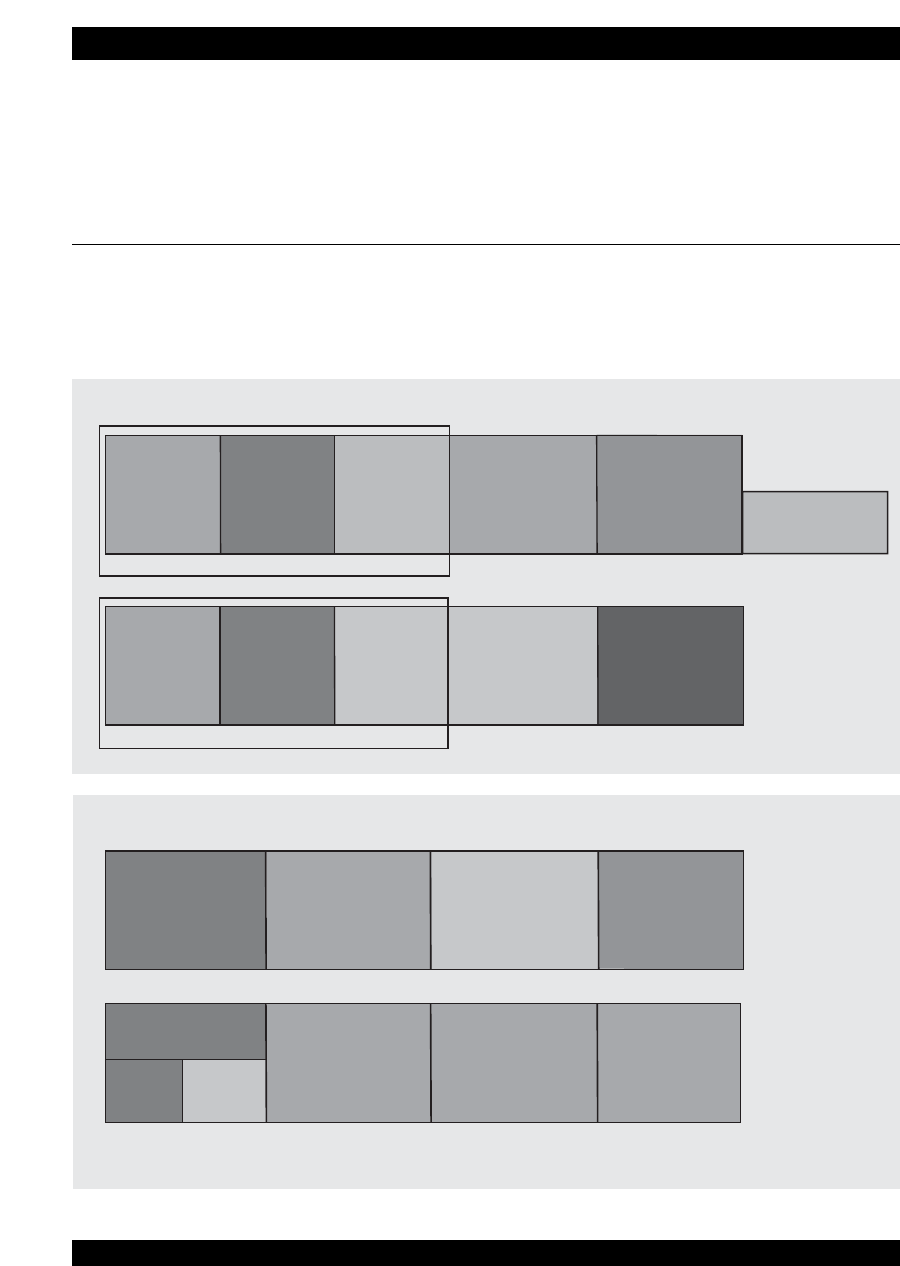
Olin students are required to complete a
Foundations of Business and Entrepreneurship
course and the entrepreneurial components of
design courses. Students have the opportunity
to enroll in courses relating to business at
Babson College, and interested students may
design a sequence of courses to explore an
entrepreneurship discipline in depth.
Many students will also explore entrepreneur-
ship and develop opportunity assessment
abilities through their SCOPE experience and
out-of-class activities such as student clubs,
12
CATALOG
FRANKLIN W. OLIN COLLEGE OF ENGINEERING
PROGRAM DESCRIPTIONS ■
1ST YEAR
1st Semester2nd Semester
= 16 or (optionally)
18 credits
= 16 credits
2ND YEAR
1st Semester2nd Semester
= 16 credits
= 16 credits
Introductory
Programming
(optional)
ENGINEERING
MC:
Compartment
Systems
MATH
Calculus
SCIENCE
Physics:
Mechanics
ENGINEERING
Design Nature
AHS
Arts, Humanities,
Social Science
Foundation
ENGINEERING
MC:
Spatially
Distributed
Systems
MATH
Vector Calculus
SCIENCE
Physics:
Electromag-
netism
and Waves
SCIENCE
e.g., Biology
OR Material Science
E! FOUNDATION
Foundations of
Business and
Entrepreneurship
MATH
Linear Algebra
Probability and
Statistics
ENGINEERING
Principles of
Engineering
SCIENCE
e.g., Chemistry
OR Math and Science
OR Materials Science
AHS
Arts, Humanities,
Social Science
MATH ENGINEERING
Program
Specific
Engineering
ENGINEERING
Program
Specific
Engineering
ENGINEERING
User-Oriented
Collaborative
Design
INTEGRATED COURSE BLOCK (ICB)
INTEGRATED COURSE BLOCK (ICB)
MATH or
SCIENCE
Sample Four-year Schedule
The curriculum provides for considerable flexibility and student choice about how to meet require-
ments. This chart is an example of one of many ways a student might progress through the four-
year program.
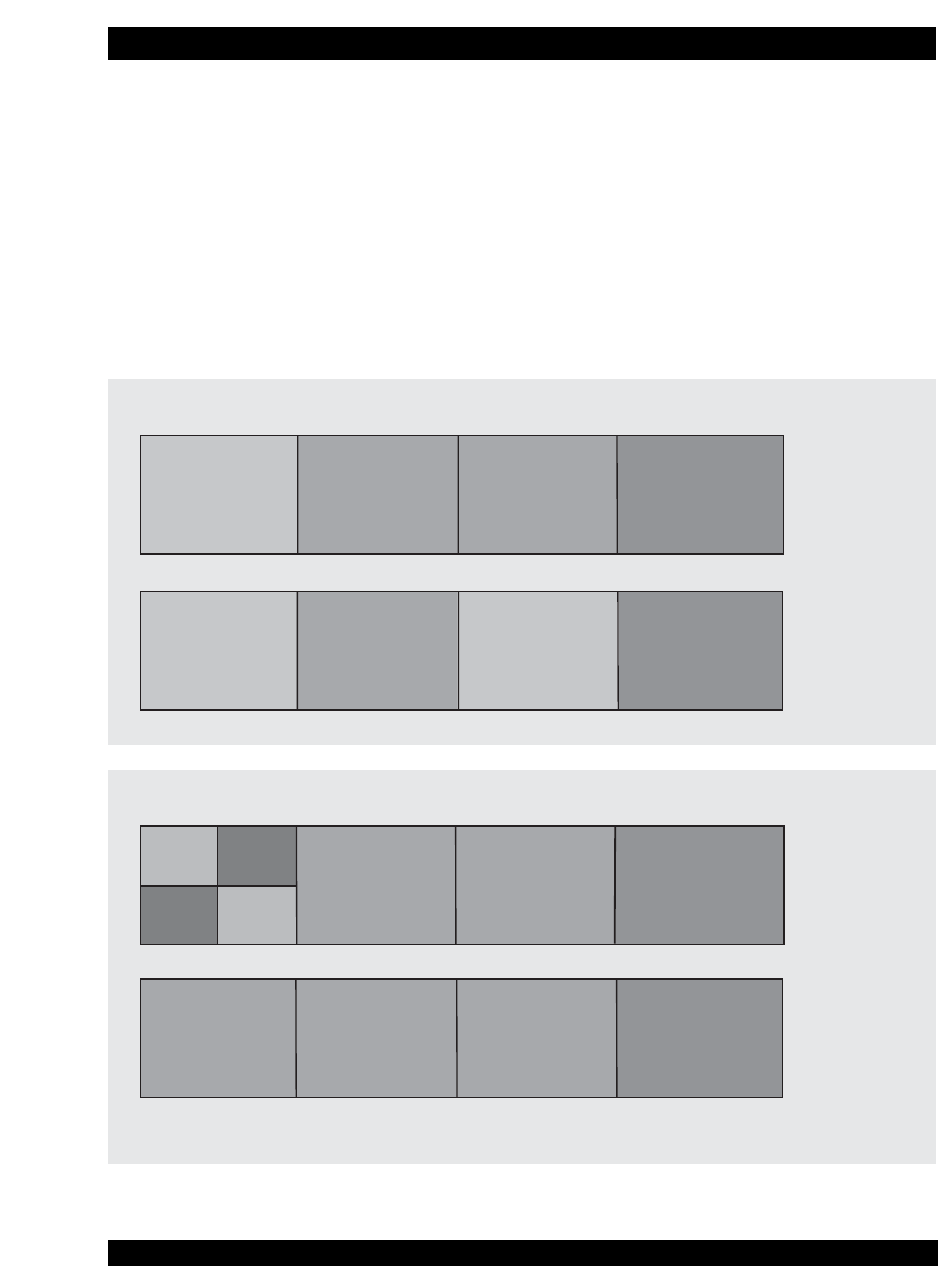
community service, and Passionate Pursuits.
The Entrepreneurship experience can culmi-
nate in an Entrepreneurship Capstone, requir-
ing students to integrate acquired skills and
knowledge.
Through a special arrangement with the
Babson College Graduate School, Olin students
have the opportunity for a “fast track” to a
Master’s Degree in Management with a special-
ization in Technical Entrepreneurship.
Communication
Throughout the curriculum, Olin College inte-
grates the instruction and practice of written,
spoken, visual, and graphical communication.
Thus, it is not only within the Arts, Humanities,
and Social Sciences that an Olin student can
expect communication-intensive course work.
The Olin curriculum reflects the college’s com-
mitment to the engineer as a highly skilled
communicator.
CATALOG
13
FRANKLIN W. OLIN COLLEGE OF ENGINEERING
■ PROGRAM DESCRIPTIONS
3RD YEAR
1st Semester2nd Semester
= 16 credits
= 16 credits
4TH YEAR
1st Semester2nd Semester
= 16 credits
= 16 credits
ELECTIVE ENGINEERING
Program
Specific
Engineering
ENGINEERING
Program
Specific
Engineering
AHS
Arts, Humanities,
Social Science
ELECTIVE ENGINEERING
Program
Specific
Engineering
ELECTIVE AHS/E!
Arts, Humanities,
Social Science or
Entrepreneurship
ENGINEERING
Design Depth
ENGINEERING
SCOPE
AHS/E!
Arts, Humanities,
Social Science or
Entrepreneurship
ENGINEERING
Olin
Self-Study
ENGINEERING
Program
Specific
Engineering
ENGINEERING
SCOPE
AHS/E!
Capstone
SCIENCE or MATH
MATH or SCIENCE

Graduation Requirements
Students must satisfy two classes of require-
ments in order to graduate from Olin:
General Requirements and Program-Specific
Requirements. General requirements must be
satisfied by all students regardless of degree or
concentration. Program-Specific Requirements
vary depending on the degree being sought
(ECE, ME or E) and, for the E degree, on the
chosen concentration.
General Requirements and Program-Specific
Requirements are further broken down into
Distribution Requirements and Course
Requirements, both of which must be satisfied.
Distribution Requirements specify the mini-
mum total number of credits that must be com-
pleted in each of five broad areas (Engineering,
Math, Science, AHS, and Entrepreneurship).
Course requirements specify which courses
must be completed. Some course requirements
can only be satisfied by completing a particular
course. Other course requirements allow more
choice. Some courses may be used to satisfy
one of several course requirements, but stu-
dents must choose which course requirement
such course’s completion is applied toward.
A course completion can only satisfy one
course requirement.
General Distribution and Course
Requirements
General Distribution Requirements
All students must complete a minimum of 120
credits appropriately distributed among five
areas of study. The table below gives the mini-
mum credits required in each area.
Area Minimum
Credits Required
Engineering 46
Math and Science 30 of which at least
10 must be Math
AHS and Entrepreneurship 28 of which at least
12 must be AHS*
A credit corresponds to an average of three
hours of student work each week throughout
an academic semester. Therefore, a four-credit
course (the most common course size at Olin)
generally requires students to spend 12 hours
each week attending classes, completing
homework, participating in laboratory activi-
ties, and fulfilling all other course responsibili-
ties.
The course catalog lists, for each course, the
number of credits earned and their area. Most
courses provide credit in only one area. Some
courses distribute their credits across more
than one area.
Students must register for at least 12 credits
but no more than 20 credits each semester.
Students typically register for approximately
16 credits per semester. First-year students are
limited to 18 credits in the first semester.
Some activities, like Passionate Pursuits and a
few classes, provide non-degree credit, which
appears on the transcript, but does not count
toward Credit Requirements. Non-degree credit
counts toward the maximum credits per
semester, but not toward the minimum.
* The AHS Capstone does not count toward the 12
credit AHS minimum.
14
CATALOG
FRANKLIN W. OLIN COLLEGE OF ENGINEERING
PROGRAM DESCRIPTIONS ■
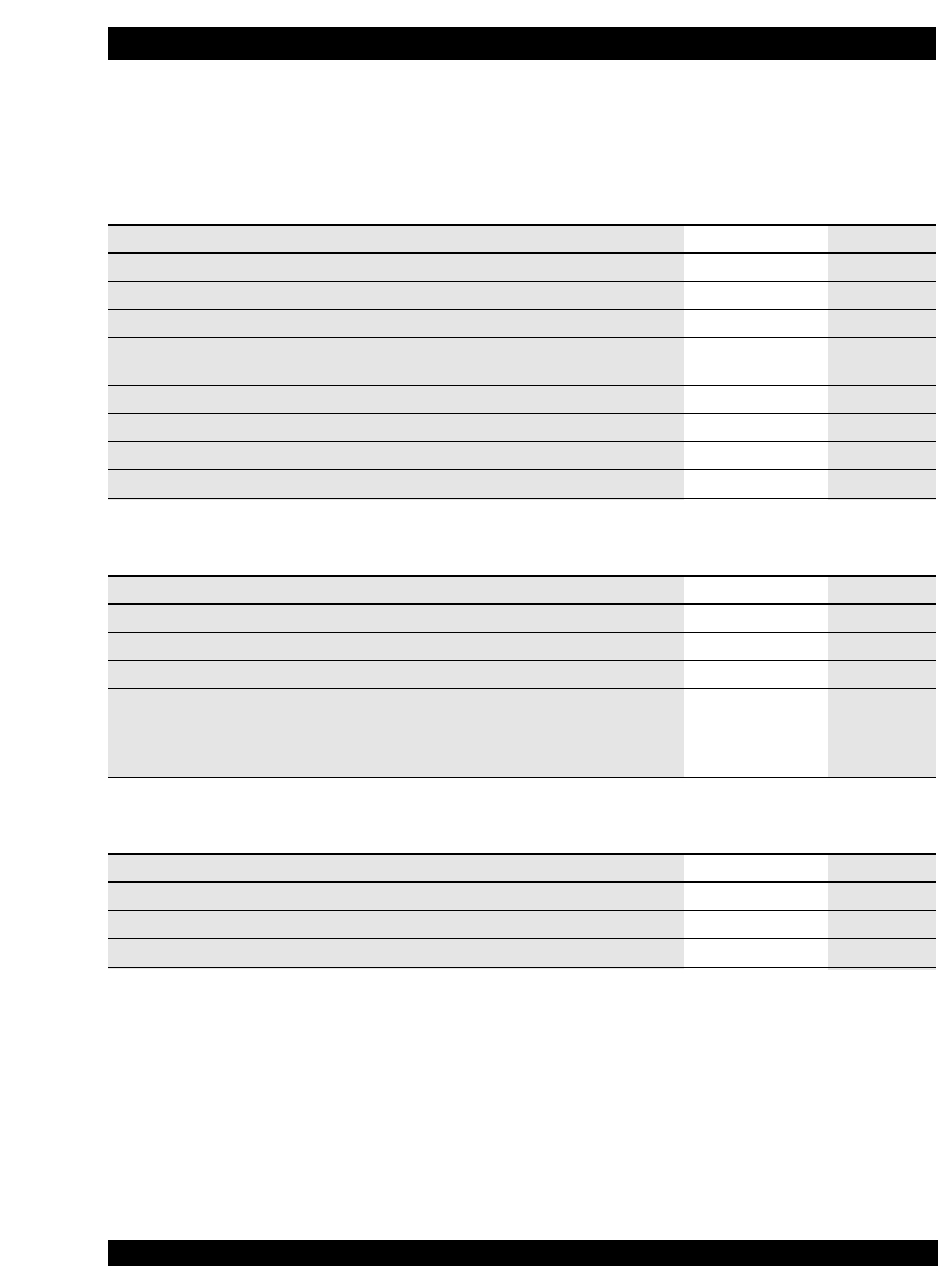
CATALOG
15
FRANKLIN W. OLIN COLLEGE OF ENGINEERING
■ PROGRAM DESCRIPTIONS
Integrated Course Blocks (ICBs)
Title Number Notes
Integrated Course Block 1 (ICB1)
• Math: Calculus MTH 1110
• Physics: Mechanics SCI 1110
• Engineering: Modeling and Control of ENGR 1110
Compartment Systems
Integrated Course Block 2 (ICB2)
• Math: Vector Calculus MTH 1120
• Physics: Electromagnetism and Waves SCI 1120
• Engineering: Modeling and Control of Spatially Distributed Systems ENGR 1120
Math and Science (in addition to ICBs)
Title Number Notes
Linear Algebra MTH 2120
Probability and Statistics MTH 2130
Foundations of Modern Biology (with laboratory) SCI 1210
Chemistry/Material Science — One of:
• Introduction to Chemistry (with laboratory) SCI 1310
• Materials Science and Solid State Chemistry (with laboratory) SCI 1410
• Organic Chemistry (with laboratory) SCI 2320
Engineering (in addition to ICBs)
Title Number Notes
Principles of Engineering ENGR 2210
SCOPE ENGR 4190
Olin Self Study ISR 4198
General Course Requirements
All Olin students, regardless of degree or concentration, must satisfy the following course require-
ments. The table includes one or more current classes that satisfy each requirement.

Design
Title Number Notes
Design Nature ENGR 1200
User-Oriented Collaborative Design ENGR 2250
Design Depth Course — One of:
• Sustainable Design ENGR 3210 See the current registration
• Human Factors and Interaction Design ENGR 3220 booklet for possible additional
• Design for Manufacturing ENGR 3380 options, including special topics
• Usable Products ENGR 3230 courses.
AHS and Entrepreneurship
Title Number Notes
AHS Foundation — One of: All AHS foundation courses offer:
• History of Technology: A Cultural and AHSE 1100 • an introduction and overview
Contextual Approach of an AHS discipline
• The Wired Ensemble — AHSE 1122 • writing instruction and practice
Instruments, Voices, Players • an introduction to contextual
• Seeing and Hearing: Communicating AHSE 1130 and critical thinking, and
with Photographs, Video and Sound • examples of how one might
• Culture & Difference: an Anthropological AHSE 1140 integrate the content and
Approach perspectives of different
• What is “I”? AHSE 1150 disciplines.
Foundations of Business and Entrepreneurship AHSE 1500
AHS or Entrepreneurship Concentration Students must design a sequence
of at least eight credits of courses
in an approved AHS or
Entrepreneurship discipline.
AHS or Entrepreneurship Capstone AHS 4190 or AHS 4590 Students must design and com-
plete an authentic, four credit AHS
or Entrepreneurship project in their
area of AHS or Entrepreneurship
concentration.
16
CATALOG
FRANKLIN W. OLIN COLLEGE OF ENGINEERING
PROGRAM DESCRIPTIONS ■

CATALOG
17
FRANKLIN W. OLIN COLLEGE OF ENGINEERING
■ PROGRAM DESCRIPTIONS
Self-Study
The Olin Self Study (OSS) is a four-credit self-study project in which students identify an area or
question of interest, develop and follow a plan of study in pursuit of understanding important con-
cepts in the proposed area or in pursuit of an answer to the proposed question, and write a report
of the knowledge gained, applied, analyzed, synthesized, and/or evaluated through the investiga-
tion. The OSS serves to (1) develop students’ skills in working independently to learn challenging
material and to tackle challenging problems; (2) develop students’ skills in independent writing;
and (3) hone students’ skills and attitudes enabling life-long learning, a competency Olin considers
vital for engineers working in an environment of rapidly changing technology.
Students can satisfy the OSS requirement by completing four credits of self-study that is relevant
to their SCOPE project and that is advised and evaluated by their SCOPE advisor. Students can also
work under the supervision of an Olin faculty member on projects not related to SCOPE.
Independent Study and Research
In independent study activities, students work with faculty members to design and implement a
learning and assessment plan for the study of topics not covered by listed Olin courses.
Olin offers opportunities for undergraduate research experiences both during the academic year
and during the summer. Students may receive academic credit or pay for a research activity, but
not both. Independent study and research credit may be applied toward credit requirements in par-
ticular areas (Math/Science/AHS/Entrepreneurship/Engineering) and toward the overall 120 credit
requirement. These activities are normally taken Pass/No Credit. In order to use independent study
to satisfy a course requirement, prior approval must be obtained from the CSTB and the activity
must be taken for a grade. Only in exceptional cases will research be approved to satisfy a course
requirement.

18
CATALOG
FRANKLIN W. OLIN COLLEGE OF ENGINEERING
PROGRAM DESCRIPTIONS ■
Program-Specific Requirements
Olin College offers three degrees: Bachelor of Science in Electrical and Computer Engineering (ECE),
Bachelor of Science in Mechanical Engineering (ME), and Bachelor of Science in Engineering (E).
Course Requirements for each of these degrees are outlined below. A course that is used to satisfy
a General Course Requirement cannot also be used to satisfy a Program-Specific Requirement
Electrical and Computer Engineering (ECE)
Electrical and Computer Engineering is a degree program designed to meet ABET Program Criteria
in Electrical and Computer Engineering. Olin’s ECE degree focuses on the devices and structure of
computing and communications systems, with an emphasis on hardware design. The Electrical
and Computer Engineering Program has the following three educational objectives:
Program Educational Objective I:
Our graduates will be recognized as individuals who can make a
positive difference within their profession and their community.
Elaboration: Our graduates will demonstrate the ability to recognize opportunity and to take ini-
tiative. They will be able to communicate effectively and to work effectively on teams. They will
understand the broad social, economic and ethical implications of their work, and will be cog-
nizant of their professional responsibilities.
Program Educational Objective II:
Our graduates will demonstrate technical competence in electri-
cal and computer engineering and creative problem-solving skills that foster success in a variety of
postgraduate environments, including professional practice and graduate school.
Elaboration: Our graduates will have a solid grounding in fundamental principles of science and
electrical and computer engineering and the ability to apply this knowledge to analyze and diag-
nose electrical and computer engineering systems. They will be able to develop creative design
solutions that are responsive to technical, social, economic and other considerations.
Program Educational Objective III:
Our graduates will be prepared for and capable of appropriate
response to social, technical and global changes during their lifetimes.
Elaboration: Our graduates will demonstrate the results of a broad education that focuses on
electrical and computer engineering, but also encompasses the arts, humanities, social sciences,
and entrepreneurship. They will build on this foundation by engaging in independent learning in
order to identify and respond to emerging technical and social developments.
The Course Requirements of the ECE program are:
Requirement Course Name Number
ECE Math — All of: Differential Equations MTH 2140
Discrete Mathematics MTH 2110
ECE — All of: Signals and Systems ENGR 2410
Introduction to Microelectronic Circuits ENGR 2420
Software Design ENGR 2510
Computer Architecture ENGR 3410
Analog and Digital Communications ENGR 3420
ECE — One of: Controls ENGR 3370
Robotics ENGR 3390
Digital VLSI ENGR 3430
Modern Sensors ENGR 3440
Semiconductor Devices ENGR 3450
Error Control Codes MTH 3140
Any level 3000 or higher E:C course, or
other course approved by ECE program group

CATALOG
19
FRANKLIN W. OLIN COLLEGE OF ENGINEERING
■ PROGRAM DESCRIPTIONS
Mechanical Engineering (ME)
Mechanical Engineering is a degree program designed to meet ABET Program Criteria in
Mechanical Engineering. The ME requirements emphasize the design of mechanical and
thermal/fluid systems. The Mechanical Engineering Program Educational Objectives are:
Program Educational Objective I:
Our graduates will be recognized as individuals who can make a
positive difference within their profession and their community.
Elaboration: Our graduates will demonstrate the ability to recognize opportunity and to take ini-
tiative. They will be able to communicate effectively and to work effectively on teams. They will
understand the broad social, economic and ethical implications of their work, and will be cog-
nizant of their professional responsibilities.
Program Educational Objective II:
Our graduates will demonstrate technical competence in
mechanical engineering and creative problem-solving skills that foster success in a variety of post-
graduate environments, including professional practice and graduate school.
Elaboration: Our graduates will have a solid grounding in fundamental principles of science and
mechanical engineering and the ability to apply this knowledge to analyze and diagnose
mechanical engineering systems. They will be able to develop creative design solutions that are
responsive to technical, social, economic and other considerations.
Program Educational Objective III:
Our graduates will be prepared for and capable of appropriate
response to social, technical and global changes during their lifetimes.
Elaboration: Our graduates will demonstrate the results of a broad education that focuses on
mechanical engineering, but also encompasses the arts, humanities, social sciences, and entre-
preneurship. They will build on this foundation by engaging in independent learning in order to
identify and respond to emerging technical and social developments.
The Course Requirements of the ME program are:
Requirement Course Name Number
ME Math: Differential Equations MTH 2140
One of:
• Partial Differential Equations MTH 3120
• Non-Linear Dynamics and Chaos MTH 3170
• other math course approved by ME program group
ME — All of: Transport Phenomena ENGR 3310
Mechanics of Solids and Structures ENGR 3320
Mechanical Design ENGR 3330
Dynamics ENGR 3340
Thermodynamics ENGR 3350
ME — One of: Topics in Fluid Dynamics ENGR 3360
Controls ENGR 3370
Design for Manufacturing ENGR 3380
Robotics ENGR 3390
Failure Analysis and Prevention ENGR 3820
Phase Transformation in Ceramic and Metallic Systems ENGR 3830
other course approved by ME program group

20
CATALOG
FRANKLIN W. OLIN COLLEGE OF ENGINEERING
PROGRAM DESCRIPTIONS ■
Engineering
The Engineering Degree program offers a major in Engineering that is both rigorous and flexible.
This program gives students the option to pursue new areas of engineering and interdisciplinary
combinations of engineering and other fields. It is also intended to give the college mechanisms
for investigating new areas and creating new concentrations. All paths to graduation with the engi-
neering degree provide for all outcomes required by the ABET General Criteria. The Engineering
Program has three educational objectives
Program Educational Objective I:
Our graduates will be able to make a positive difference within
their profession and their community.
Elaboration: Our graduates will demonstrate the ability to recognize opportunity and to take ini-
tiative. They will be able to communicate effectively and to work well on teams. They will under-
stand the broad social, economic and ethical implications of their work, and will be cognizant of
their professional responsibilities.
Program Educational Objective II:
Our graduates will demonstrate technical competence and cre-
ative problem-solving skills that foster success in a variety of postgraduate environments, includ-
ing professional practice and graduate school.
Elaboration: Our graduates will have a solid grounding in fundamental principles of mathemat-
ics, science, and engineering and the ability to apply this knowledge to the design, analysis and
diagnosis of engineering systems. They will be able to develop creative design solutions that
are responsive to technical, social, economic and other realistic constraints and considerations.
Program Educational Objective III:
Our graduates will be prepared for and capable of appropriate
response to social, technical and global changes during their careers.
Elaboration: Our graduates will possess a broad understanding of math, science, engineering,
the arts, humanities, social sciences, and entrepreneurship. They will build on this foundation
throughout their careers by engaging in independent learning in order to identify and respond
to emerging technical and social developments.
Students who choose the Engineering degree may specify a concentration, which is a set of class-
es that constitute a coherent area of study. A student’s concentration appears on the diploma but
not on the official transcript. The college offers designated concentrations in Bioengineering,
Computing, Materials Science, and Systems. Alternatively, students may design a concentration in
another area.
Students who choose the Engineering degree must submit a concentration plan along with their
declaration of major. The plan lists the courses the student intends to take to fulfill graduation
requirements, and demonstrates that these courses (along with additional required courses) consti-
tute a major in engineering that has depth, breadth, coherence, and rigor
The concentration plan must be signed by the student’s adviser and two faculty members whose
area of expertise is relevant to the proposed area of study (if the adviser’s area is relevant, the
adviser can count as one of the two).
Concentration plans are reviewed by the Engineering Program Group. This group is responsible for
checking the following criteria:
• Do the proposed courses constitute a major in Engineering that has breadth, depth, coherence
and rigor?
• Do the faculty who approved the plan have relevant expertise? Should other faculty be con-
sulted?

CATALOG
21
FRANKLIN W. OLIN COLLEGE OF ENGINEERING
■ PROGRAM DESCRIPTIONS
• Is the plan feasible based on a reasonable forecast of course offerings? The availability of
faculty and other resources determines which classes we can offer and their schedule, which
may limit a student’s ability to complete a particular concentration.
• Is the plan comparable to the designated concentrations and previous student-designed con-
centrations? If a student-designed concentration is named, is the proposed name accurate and
appropriate?
The designated concentrations are examples of recommended programs, but all course plans go
through the same review process. The concentration plan is provisional. If approved and complet-
ed, a student may use it to graduate. Minor substitutions may be made with adviser approval; sub-
stantive changes require approval of the Engineering Program Group.
Engineering: Bioengineering (E:Bio)
Bioengineering is an interdisciplinary concentration rooted in engineering, biology, and chemistry.
The E:Bio concentration prepares students to approach problems important to biology, medical
research, and clinical studies; it provides some of the background required for medical school.
Requirement Course Name Number
E:Bio Math Four credits of advanced Mathematics appropriate
to the program of study
E:Bio Biology Four credits of advanced Biology
E:Bio Chemistry/ Four credits of Chemistry, Materials Science, or SCI 1310, SCI 1410,
Materials Science Organic Chemistry in addition to the General SCI 2320
Course Requirements
E:Bio Bioengineering 12 credits of coursework appropriate to
Bioengineering
Students wishing to pursue the E: Bio concentration within the Engineering major must develop a
specific program of study in consultation with bioengineering faculty. Below are some guidelines
on course selection:
Advanced Mathematics courses include MTH 3120 Partial Differential Equations and MTH 3170
Nonlinear Dynamics and Chaos (note that both these courses have MTH 2140 Differential
Equations as a prerequisite). Advanced Biology courses include SCI 2210 Immunology and SCI
3210 Human Molecular Genetics in the Age of Genomics. Bioengineering courses include all ENGR
36xx-series courses, as well as ENGR 3810 Structural Biomaterials. E:Bio course plans may include
classes at Babson, Brandeis, Wellesley, or other institutions. Note that this is not an exhaustive list
of acceptable courses; other courses may be used to fulfill each of these requirements if they are
part of an approved course plan.
Students interested in pursuing medical, dental or veterinary school admission should contact Dr.
Janey Pratt, Olin Senior Partner in Health Science, as early in their Olin studies as possible, and
ensure that their course plan meets the requirements of the programs they are considering.

22
CATALOG
FRANKLIN W. OLIN COLLEGE OF ENGINEERING
PROGRAM DESCRIPTIONS ■
Engineering: Computing (E:C)
The Computing concentration integrates the study of computer science and software engineering
within a broad interdisciplinary context. The E:C concentration offers significant flexibility, particu-
larly with courses taken off-campus.
Requirement Course Name Number
E:C Math Discrete Mathematics MTH 2110
E:C — All of: Software Design ENGR 2510
Foundations of Computer Science ENGR 3520
Software Systems ENGR 3525
8 additional credits in computing.
Additional computing credits may include Olin courses such as ENGR 3410 Computer Architecture
or advanced computer science courses at Babson, Brandeis, Wellesley, or study away institutions.
ENGR 3220 Human Factors and Interaction Design may count toward the course requirements of
E:C, but only if it is not used to satisfy the Design Depth requirement.
Engineering: Materials Science (E:MS)
Materials Science is an inherently interdisciplinary field with a strong presence throughout most
engineering and science disciplines. Olin’s materials science concentration provides an integrated
approach to materials, merging a variety of engineering design principles with concepts from
solid-state physics and applied chemistry. Students who complete the E:MS concentration will
achieve an understanding of structure-property-processing-performance relationships in materials,
the ability to apply advanced scientific and engineering principles to materials systems, and the
skills to synthesize appropriate technical and contextual information to solve materials selection
and design problems.
Requirement Course Name Number
E:MS Math Differential Equations MTH 2140
E:MS 20 credits of engineering subjects appropriate
to the program of study with a minimum of twelve
credits in materials science subjects.
Students wishing to pursue the Materials Science concentration within the Engineering major must
develop a specific program of study in consultation with materials science and applied chemistry
faculty. Such programs may emphasize different aspects of materials science, such as structural
materials, solid state properties of materials, processing and manufacturing, or applied chemistry.
Engineering: Systems (E:SYS)
The Systems concentration focuses on the design of products that integrate significant technology
from multiple disciplines, with a focus on products that merge ECE and ME. Such products are par-
ticularly hard to create because designers tend to have specialized, rather than broad, knowledge
of disciplines.

CATALOG
23
FRANKLIN W. OLIN COLLEGE OF ENGINEERING
■ PROGRAM DESCRIPTIONS
Requirement Course Name Number
E:SYS Math Differential Equations MTH 2140
E:SYS ECE Signals and Systems ENGR 2410
Any two of: Introduction to Microelectronics Circuits ENGR 2420
Software Design ENGR 2510
Computer Architecture ENGR 3410
Analog and Digital Communications ENGR 3420
E:SYS ME Transport Phenomena ENGR 3310
Any two of: Mechanics of Solids and Structures ENGR 3320
Mechanical Design ENGR 3330
Dynamics ENGR 3340
Thermodynamics ENGR 3350
E:SYS Systems ENGR 3710

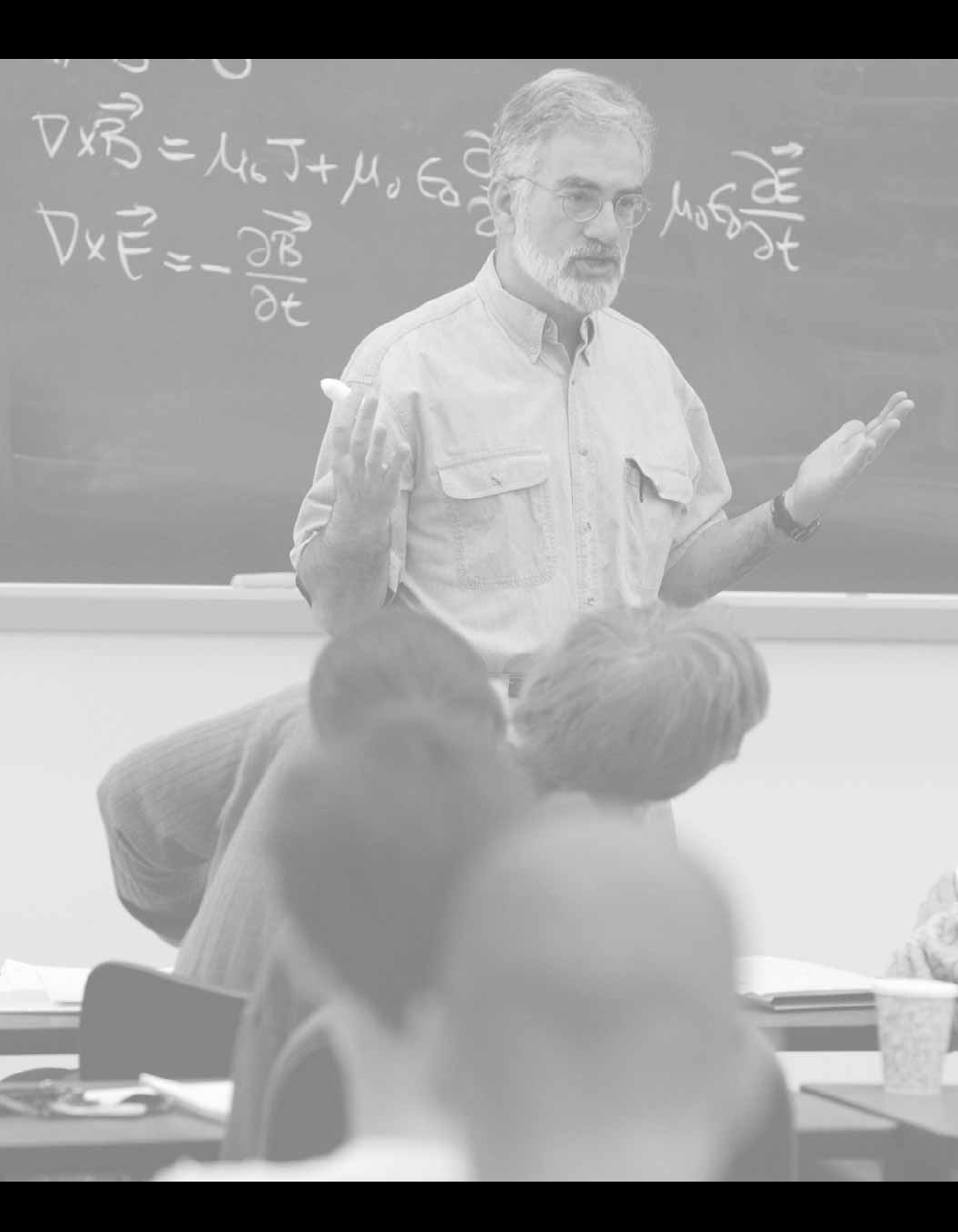
Course Listings

Offerings
Information in this catalog is subject to change.
Up-to-date information is available at the StAR
website: http://star.olin.edu.
Course Numbering
Nomenclature
Course numbers are composed of an alphabet-
ic prefix and a numeric suffix. The alphabetic
prefix indicates the primary area of the course,
according to the following table. Note that
some courses earn credit for multiple areas
(see Course Listings Table below).
Alphabetic Prefix Primary Area
AHSE AHS/Entrepreneurship
ENGR Engineering
MTH Mathematics
SCI Science
The first digit of the numeric suffix indicates
the nominal level of a course according to the
following table.
Numeric Suffix Level
0XXX Not Applicable
1XXX Introductory
2XXX Intermediate
3XXX Advanced
4XXX Summative/Capstone/SCOPE
Hours/Week
Nomenclature
To better allow teaching staff, facilities sched-
ulers, and students to manage the time
requirements of every course, the number of
expected hours per week is indicated by a
triple of numbers, as follows:
(Contact) – (Non-Contact) – (Preparation)
• Contact The first number indicates
approximately the number of hours per
week teaching staff and students will
spend together in scheduled school
facilities.
• Non-Contact The second number indi-
cates approximately the number of hours
students will spend each week working on
their own in scheduled school facilities.
• Preparation The third number indicates
approximately the number of hours per
week a well-prepared student with good
study habits should expect to spend
studying and completing homework,
reading assignments, projects, etc.
For example, the AHSE 1100 History of
Technology: A Cultural and Contextual
Approach course is described as a 4-0-8
course, so students in the course can expect
to spend four hours in class with an instructor,
and approximately eight hours outside of class
completing course-related assignments.
Prerequisites and
Co-requisites
Prerequisites and co-requisites may occasion-
ally be waived with permission of the course
instructor.
26
CATALOG
FRANKLIN W. OLIN COLLEGE OF ENGINEERING
COURSE LISTINGS ■

CATALOG
27
FRANKLIN W. OLIN COLLEGE OF ENGINEERING
■ COURSE LISTINGS
Course Listings Summary
Number Name Prerequisites Co-requisites Instructor Credits Hours Offered
AHSE 0112 The Olin Conductorless Audition Dabby 1 AHS 2-0-1 Fall,
Orchestra Spring
AHSE 1100 History of Technology: Martello 4 AHS 4-0-8 Fall
A Cultural and Contextual
Approach
AHSE 1122 The Wired Ensemble — Ability to read Dabby 4 AHS 4-0-8 Fall
Instruments, Voices, music
Players
AHSE 1130 Seeing and Hearing: Donis-Keller 4 AHS 4-0-8 Fall
Communicating with
Photographs, Video
and Sound
AHSE 1140 Culture and Difference: An Lynch 4 AHS 4-0-8 Fall
Anthropological Approach
AHSE 1150 What is “I”? Stein 4 AHS 4-0-8 Fall (not
offered
every year)
AHSE 1500 Foundations of Business Bourne, 4 AHSE 4-0-8 Fall,
and Entrepreneurship Schiffman Spring
AHSE 2110 The Stuff of History: SCI 1410 Martello 4 AHS 4-0-8 Spring
Materials and Culture in (not offered
Ancient, Revolutionary every year)
and Contemporary Times
AHSE 2112 Six Books that Changed AHS Foundation Martello 2 AHS 4-0-8 Spring
the World (1st half)
AHSE 2114 Science Fiction and AHS Foundation Martello 2 AHS 4-0-8 Spring
Historical Context (2nd half)
AHSE 2120 Heroes for the Dabby 4 AHS 3-0-9 Alt Spring
Renaissance Engineer: (odd
Leonardo, Nabokov, Bach, years)
Borodin
AHSE 2130 The Intersection of Art Donis-Keller 4 AHS 4-0-8 Alt Fall
and Science (even
years)
AHSE 2131 Responsive Drawing and Donis-Keller 4 AHS 4-0-8 Fall
Visual Thinking
AHSE 2140 Anthropology: Culture AHS Foundation Lynch 4 AHS 4-0-8 Spring
Knowledge and Creativity
AHSE 3130 Advanced Digital AHSE 1130 Donis-Keller 4 AHS 4-0-8 Alt Fall
Photography (odd
years)

28
CATALOG
FRANKLIN W. OLIN COLLEGE OF ENGINEERING
COURSE LISTINGS ■
Number Name Prerequisites Co-requisites Instructor Credits Hours Offered
AHSE 4190 AHS Capstone Permission of AHS Staff 4 AHS 4-0-8 Fall,
Instructor(s) Spring
AHSE 4590 Entrepreneurship Permission of Bourne, 4 AHSE 2-0-10 Fall,
Capstone Instructor(s) Schiffman Spring
ENGR 1110 ICB1 Engineering: SCI 1110 G. Pratt, 3 ENGR 3-3-3 Fall
Modeling and Control of and MTH 1110 Storey
Compartment Systems
ENGR 1120 ICB2 Engineering: SCI 1120 G. Pratt, 3 ENGR 3-3-3 Spring
Modeling and Control of and MTH 1120 Storey
Spatially Distributed
Systems
ENGR 1200 Design Nature Eris, Linder, 4 ENGR 6-4-2 Fall
Staff
ENGR 1510 Introductory Programming Downey 2 ENGR 2-1-1 Fall
ENGR 2210 Principles of Engineering ENGR 1120 Minch, 4 ENGR 4-4-4 Fall,
Mur-Miranda Spring
ENGR 2250 User Oriented Eris, Linder, 4 ENGR 4-4-4 Spring
Collaborative Design Staff
ENGR 2410 Signals and Systems Dabby, Yim 4 ENGR 2-2-8 Spring
ENGR 2420 Introduction to ENGR 1120 Minch 4 ENGR 4-4-4 Spring
Microelectronic Circuits
ENGR 2510 Software Design Downey, 4 ENGR 5-0-7 (F) Fall,
Stein 6-0-6 (S) Spring
ENGR 3210 Sustainable Design ENGR 2250 Linder 4 ENGR 4-0-8 Fall
ENGR 3220 Human Factors and ENGR 2250 Stein 4 ENGR 4-4-4 Fall,
Interface Design Spring
ENGR 3230 Usable Products: ENGR 2250 Eris 4 ENGR 4-4-4 Spring
Analyzing the User
Experience for Redesign
ENGR 3310 Transport Phenomena ICB2 Storey, 4 ENGR 4-0-8 Fall
Townsend
ENGR 3320 Mechanics of Solids ICB1 Lee 4 ENGR 4-4-4 Spring
and Structures
ENGR 3330 Mechanical Design ICB2 ENGR 3320 Barrett 4 ENGR 4-4-4 Fall,
Spring
ENGR 3335 Mechanical Vibrations MTH 2120, Lee 4 ENGR 4-0-8 Fall
MTH 2140
ENGR 3340 Dynamics ICB1 MTH 2140 Bingham 4 ENGR 4-4-4 Fall
ENGR 3350 Thermodynamics Storey, 4 ENGR 4-0-8 Spring
Townsend
ENGR 3355 Renewable Energy ENGR 3350 Townsend 4 ENGR 4-0-8 Fall
ENGR 3360 Topics in Fluid Dynamics ENGR 3310 Storey 4 ENGR 4-0-8 Spring

CATALOG
29
FRANKLIN W. OLIN COLLEGE OF ENGINEERING
■ COURSE LISTINGS
Number Name Prerequisites Co-requisites Instructor Credits Hours Offered
ENGR 3370 Controls ENGR 2410 or Bingham 4 ENGR 4-0-8 Spring
ENGR 3340
ENGR 3380 Design for Manufacturing ENGR 2250 Sabin 4 ENGR 4-0-8 Spring
ENGR 3390 Robotics Barrett, 4 ENGR 4-0-8 Spring
G. Pratt
ENGR 3410 Computer Architecture ICB2 Chang 4 ENGR 4-4-4 Fall
ENGR 3420 Introduction to Analog ENGR 2410 TBA 4 ENGR 4-4-4 Fall
and Digital
Communications
ENGR 3425 Analog VLSI ENGR 2420 Minch 4 ENGR 4-4-4 Alt Fall
(odd years)
ENGR 3430 Digital VLSI ICB2 Chang 4 ENGR 4-4-4 Spring
ENGR 3440 Modern Sensors ICB2, ENGR 2410 Somerville 4 ENGR 4-4-4 TBA
ENGR 3450 Semiconductor Devices ICB2; SCI 1410 Somerville 4 ENGR 4-4-4 TBA
or SCI 3110
ENGR 3520 Foundations of ENGR 2510 MTH 2110 Stein 4 ENGR 4-0-8 Every 3rd
Computer Science semester
(beginning
Fall 04)
ENGR 3520A Foundations of Computer ENGR 3520 Stein 2 ENGR 1-0-5 Every 3rd
Science Project semester
(beginning
Fall 04)
ENGR 3525 Software Systems Downey 4 ENGR 4-4-4 Every 3rd
semester
(beginning
Spring 05)
ENGR 3530 Synchronization Downey 2 ENGR 2-2-2 Every 3rd
semester
(beginning
Spring 05)
ENGR 3540 Computational Modeling ENGR 2510 Downey 4 ENGR 4-0-8 Every 3
years
(beginning
Fall 05)
ENGR 3550 Computer Systems and TBA 2 AHS + 4-0-8 TBA
Public Policy 2 ENGR
ENGR 3600 Topics in Bioengineering Sieminski 4 ENGR 4-0-8 Fall
ENGR 3610 Biomedical Materials SCI 1210, Chachra 4 ENGR 4-0-8 Fall
SCI 1410
ENGR 3710 Systems Completion of Bingham, 4 ENGR 4-0-8 Fall
other E:SYS G. Pratt
requirements
ENGR 3810 Structural Biomaterials SCI 1410 Chachra 4 ENGR 4-4-4 Fall
SCI 1210

30
CATALOG
FRANKLIN W. OLIN COLLEGE OF ENGINEERING
COURSE LISTINGS ■
Number Name Prerequisites Co-requisites Instructor Credits Hours Offered
ENGR 3820 Failure Analysis and SCI 1410 Stolk 4 ENGR 4-4-4 Spring
Prevention
ENGR 3830 Phase Transformation SCI 1410 Stolk 4 ENGR 4-4-4 Fall
in Ceramic and Metallic
Systems
ENGR 4190 Senior COnsulting Program Must be Staff 4 ENGR 4-0-8 Fall,
for Engineering (SCOPE) Senior Spring
ENGR 4190A Senior COnsulting Program Open to non- Staff variable 4-0-8 (4)
for Engineering (SCOPE) Olin students 2 or 4 2-0-4 (2)
MEC 1000 Fundamentals of Machine Anderson 4 Non- 6-0-6 Fall,
Shop Operations degree Spring
MTH 1110 ICB1 Math: SCI 1110 Geddes, 2 MTH 2-0-4 Fall
Calculus and ENGR 1110 Tilley
MTH 1120 ICB2 Math: SCI 1120 TBA 2 MTH 2-0-4 Spring
Vector Calculus and ENGR 1120
MTH 2110 Discrete Mathematics Adams 4 MTH 4-0-8 Fall
MTH 2120 Linear Algebra Moody, 2 MTH 2-0-4 Fall,
Adams, Spring
Tilley
MTH 2130 Probability and Statistics Moody, 2 MTH 2-0-4 Fall,
Adams, Spring
Tilley
MTH 2140 Differential Equations ICB2 Moody 2 MTH 2-0-4 Fall,
Spring
MTH 2160 Introduction to MTH 1110 Tilley 2 MTH 2-0-4 Spring
Mathematical Modeling
MTH 3120 Partial Differential MTH 2120, Tilley 4 MTH 4-0-8 Fall
Equations MTH 2140
MTH 3130 Mathematical Analysis ICB2 Moody 2 MTH 2-0-4 TBA
MTH 3140 Error Control Codes MTH 2120, Adams 2 MTH + 4-0-8 Spring
MTH 2110 2 ENGR
MTH 3150 Numerical Methods and MTH 2120, Tilley 4 MTH 4-0-8 Spring
Scientific Computing MTH 2140
MTH 3160 Introduction to Complex ICB2, MTH 2140 Tilley 4 MTH 4-0-8 Fall
Variables
MTH 3170 Nonlinear Dynamics MTH 2120, Geddes 4 MTH 4-0-8 Spring
and Chaos MTH 2140
SCI 1110 ICB1 Physics: MTH 1110 Christianson, 3 SCI 3-0-6 Fall
Mechanics and ENGR 1110 Holt
SCI 1120 ICB2 Physics: MTH 1120 Christianson, 3 SCI 3-0-6 Spring
Electromagnetism and and ENGR 1120 Zastavker
Waves
SCI 1210 Principles of Modern J. Pratt, 4 SCI 4-3-5 Fall,
Biology (with laboratory) Donis-Keller Spring

CATALOG
31
FRANKLIN W. OLIN COLLEGE OF ENGINEERING
■ COURSE LISTINGS
Number Name Prerequisites Co-requisites Instructor Credits Hours Offered
SCI 1310 Introduction to Chemistry TBA 4 SCI 4-3-5 Spring
(with laboratory)
SCI 1410 Materials Science and Chachra, 4 SCI 3-3-6 Fall,
Solid State Chemistry Stolk Spring
(with laboratory)
SCI 2110 Biological Physics ICB1, ICB2 Zastavker 4 SCI 4-0-8 TBA
SCI 2120 Biological Thermodynamics ICB1, ICB2 Zastavker 4 SCI 4-0-8 Spring
SCI 2130 Modern Physics ICB2 Holt 4 SCI 4-0-8 Fall
(formerly SCI 3110)
SCI 2140 Relativity ICB1 ICB2 Holt 2 SCI 2-0-4 Spring
(odd years)
SCI 2210 Immunology SCI 1210 J. Pratt 4 SCI 4-0-8 Fall
SCI 2320 Organic Chemistry TBA 4 SCI 4-3-5 Fall
(with laboratory)
SCI 3120 Solid State Physics SCI 2130 SCI 2130 Christianson 4 SCI 4-0-8 Alt Spring,
(odd years)
SCI 3130 Advanced Classical ICB2, MTH 2120 Zastavker 4 SCI 4-0-8 Alt Fall
Mechanics MTH 2140
SCI 3210
Human Molecular Genetics
SCI 1210 or Donis-Keller 4 SCI 4-0-8 Fall
in the Age of Genomics BISC 219
(Wellesley)

Course Listings
Integrated Course Block (ICB) 1:
MTH 1110
ICB 1 Math: Calculus
Instructor(s): Geddes, Tilley
Credits: 2 MTH
Hours: 2-0-4
Co-requisites: SCI 1110 and ENG 1110
Usually Offered: Fall
An overview of differential and integral calcu-
lus in the context of elementary numerical
analysis.
SCI 1110
ICB 1 Physics: Mechanics
Instructor(s): Christianson, Holt
Credits: 3 SCI
Hours: 3-0-6
Co-requisites: MTH 1110 and ENG 1110
Usually Offered: Fall
This course provides a thorough introduction
to classical mechanics. We will cover kinemat-
ics, the basis of Newton’s laws, particle dynam-
ics, the concepts of momentum, work, energy,
and rotational motion, and oscillations.
Additionally, the course will establish the
basics of solid and fluid mechanics, concluding
with introductory topics in thermodynamics.
Our goal is to share with you the excitement of
discovering the material universe at its most
basic levels and to equip you with the basic
knowledge and analytical skills necessary to
become a scientist or an engineer.
ENGR 1110
ICB 1 Engineering: Modeling and Control
of Compartment Systems
Instructor(s): G. Pratt, Storey
Credits: 3 ENGR
Hours: 3-3-3
Co-requisites: MTH 1110 and SCI 1110
Usually Offered: Fall
A hands-on class in the modeling and control
of compartment systems, including first and
second order thermal, mechanical, and electri-
cal systems, the nature of effort and flow
(across and through state variables) as univer-
sal concepts, power and energy, impedance,
damping, passivity, qualitative feedback
stability, and hysteretic, P, PI, and PID control.
Students will also learn to use MATLAB, to use
Simulink, and to write basic real-time control
and simulation software.
Integrated Course Block (ICB) 2:
MTH 1120
ICB 2 Math: Vector Calculus
Instructor(s): TBA
Credits: 2 MTH
Hours: 2-0-4
Co-requisites: SCI 1120 and ENG 1120
Usually Offered: Spring
An overview of differential and integral calcu-
lus in higher dimensions. Topics include sur-
faces, partial differentiation, gradients, multiple
integrals, line integrals, Green’s, Divergence,
and Stokes’ theorems, and their applications
to science and engineering.
SCI 1120
ICB 2 Physics: Electromagnetism and
Waves
Instructor(s): Christianson, Zastavker
Credits: 3 SCI
Hours: 3-0-6
Co-requisites: MTH 1120 and ENG 1120
Usually Offered: Spring
Electricity and magnetism, including electric
32
CATALOG
FRANKLIN W. OLIN COLLEGE OF ENGINEERING
COURSE LISTINGS ■

charges, forces, and fields, Gauss’s Law,
potential, electrostatic energy and capacitors,
magnetic fields and energy, mutual and self
induction, Ampere’s Law, Maxwell’s Equations,
acoustic and electromagnetic waves, polariza-
tion, interference and diffraction.
ENGR 1120
ICB 2 Engineering: Modeling and Control
of Spatially Distributed Systems
Instructor(s): G. Pratt, Storey
Credits: 3 ENGR
Hours: 3-3-3
Co-requisites: MTH 1120 and SCI 1120
Usually Offered: Spring
A hands-on class in the modeling and control
of spatially distributed systems, including ther-
mal diffusion in 1D and 2D, the heat equation,
the wave equation, characteristic impedance
and wave velocity, simple (Cartesian grid) finite
difference analysis, acoustic transmission lines,
electrical transmission lines, termination and
wave reflection.
Arts, Humanities, Social Science,
and Entrepreneurship
AHSE 0112
The Olin Conductorless Orchestra
Instructor(s): Dabby
Credits: 1 AHS
Hours: 2-0-1
Prerequisites: Audition
Usually Offered: Fall, Spring
Grading Type: Pass/No Credit
The Olin Conductorless Orchestra (OCO) —
an ensemble, minus conductor — features
instrumentalists in leadership and collaborative
roles. Dedicated to orchestral performance in
the concerted spirit of chamber music, the
orchestra forges individual participation, active
listening, and group-motivation into perform-
ances that have established it as the only con-
ductorless orchestra of its kind at an American
college. (A student can apply up to 4 OCO cred-
its to the 28 required credits in AHSE, or can
petition to apply up to 4 OCO credits to the
AHS concentration. Any additional credits, i.e.,
more than 4, earned by a student enrolling in
OCO will show up as additional AHS credits,
but will not count toward satisfying the requi-
site 28 credits in AHSE.)
AHSE 1100
History of Technology: A Cultural and
Contextual Approach
Instructor(s): Martello
Credits: 4 AHS
Hours: 4-0-8
Usually Offered: Fall
This course operates on three levels of inquiry
and exploration. In the most detailed sense,
we look at several major History of Technology
themes, such as Technological Systems,
Technology and Culture, and Technology and
the Environment. We address larger historical
questions, such as the interpretation of evi-
dence and the combination of analysis and
narrative. Finally, we conduct writing, presenta-
tion, creativity, and analysis exercises that
contribute to competencies such as communi-
cation and contextual understanding.
AHSE 1122
The Wired Ensemble: Instruments,
Voices, Players
Instructor(s): Dabby
Credits: 4 AHS
Hours: 4-0-8
Prerequisites: Ability to read music
Usually Offered: Fall
Two concurrent streams comprise The Wired
Ensemble:
• composition and performance of original
works for instruments and voices
• exploration of music through written and
oral communication.
As composers and performers, students con-
centrate on instruments, voices, and the sym-
bolic language that brings them to life. They
compose music for every family of instruments
(woodwinds, brass, strings, percussion), as
CATALOG
33
FRANKLIN W. OLIN COLLEGE OF ENGINEERING
■ COURSE LISTINGS

well as voice and spoken word. The course
features semiweekly performances of original
compositions by fellow musicians. Students
also have the opportunity to hear their works
performed in concert settings by professional
and student musicians with whom they have
collaborated.
Seminar trips to Boston and New York enable
the class to gather musical and inspirational
material, in addition to hearing some of the
finest orchestral and vocal ensembles in per-
formance. While actively engaged in composi-
tion and performance — all geared to an
end-of-term production — students examine
the worlds of earlier composers in order to
provide context for their own lives and work.
Prerequisite: ability to read music. The Wired
Ensemble is sponsored by Toscanini’s Ice
Cream.
AHSE 1130
Seeing and Hearing: Communicating with
Photographs, Video and Sound
Instructor(s): Donis-Keller
Credits: 4 AHS
Hours: 4-0-8
Usually Offered: Fall
Seeing and Hearing is a foundation course that
is about the communication of ideas developed
by research, reflection, and evolving thought,
using as a vehicle for expression contemporary
digital media tools. In this project-based
course, students will have opportunities for
hands-on learning in audio recording and
editing, photography and printing, and video
recording and editing. Science and engineering
content are integrated in order to provide a
reasonably comprehensive understanding of
the devices we use to gather sound and
images and in order to understand more fully
the properties of seeing and hearing. A major
goal is to enlarge our awareness of the envi-
ronment we inhabit and to respond to the
perceived environment by producing original
visual and sonic artwork. Students will com-
plete projects including a self-portrait, a sound-
piece that is used as an audio track for a short
video, a video documentary, and a staged
narrative. Our process is to share work through
discussion sessions as we follow projects from
their initial stages to completion and final
presentation. Additional context for Seeing and
Hearing is provided by selected readings, visits
by guest lecturers, additional faculty and staff
participation and by viewing work of other
professional practitioners. This course does
not require prior experience with image/sound
gathering or editing.
AHSE 1140
Culture and Difference: An
Anthropological Approach
Instructor(s): Lynch
Credits: 4 AHS
Hours: 4-0-8
Usually Offered: Fall
This course introduces students to key con-
cepts and methods in cultural anthropology.
Cultural anthropology is the study of how
humans organize their lives as members of
society, and the ways in which they make these
lives meaningful. Through readings on such
diverse topics as adolescence in Samoa,
epilepsy among Hmong-Americans, and
McDonald’s in Hong Kong, this course will
explore contemporary anthropological
approaches to three central questions: 1) What
is culture? 2) Does “culture” explain why
people do what they do and believe what they
believe? 3) What fate and value do cultural dif-
ferences have in today’s interconnected world?
AHSE 1150
What is “I”?
Instructor(s): Stein
Credits: 4 AHS
Hours: 4-0-8
Usually Offered: Fall (not offered every year)
This interdisciplinary exploration of identity
draws on a diverse range of genres in the
Humanities, Social Sciences, Arts and
Sciences. Prior offerings have drawn from
Anthropology, Artificial Intelligence, Biology,
Film, History, Literature, Memoir, Neuroscience,
Philosophy, Psychology, Political Science,
Science Fiction, Sociology, and Visual Arts.
34
CATALOG
FRANKLIN W. OLIN COLLEGE OF ENGINEERING
COURSE LISTINGS ■

CATALOG
35
FRANKLIN W. OLIN COLLEGE OF ENGINEERING
■ COURSE LISTINGS
Our goal is to understand how individual per-
spective (or the illusion of same) comes into
being and how our own unique perspectives
shape the way that we see the world. Emphasis
is placed on communication and context.
AHSE 1500
Foundations of Business and
Entrepreneurship
Instructor(s): Bourne, Schiffman
Credits: 4 AHSE
Hours: 4-0-8
Usually Offered: Fall, Spring
The course is designed to provide Olin stu-
dents with experience in planning and growing
a business venture. The learning experience is
centered on “doing“ (e.g., engaging in a busi-
ness simulation) while building a student’s
competence in the functional areas of business
including accounting, finance, marketing, and
strategy.
AHSE 2110
The Stuff of History: Materials and Culture
in Ancient, Revolutionary and
Contemporary Times
Instructor(s): Martello
Credits: 4 AHS
Hours: 4-0-8
Co-requisites: SCI 1410 Section 2
Usually Offered: Spring (not offered every
year)
The lion’s share of our history of technology
course features a series of readings, lectures,
and discussions on the relationship between
materials, science, society, and the environ-
ment in three historical periods. We start with
the material practices and paradigms of Copper
and Bronze Age societies, shift to Paul Revere’s
“Revolutionary” work with various metals and
fabrication processes, and conclude with a look
at the technologies and challenges of tomor-
row. We will emphasize the development of
three skills that are vital to our studies: contex-
tual thinking, communication (both written and
oral), and historical research methods pertain-
ing to source evaluation and narrative con-
struction.
AHSE 2112
Six Books that Changed the World
Instructor(s): Martello
Credits: 2 AHS
Hours: 4-0-8
Pre/Co-requisites: AHS Foundation
Usually Offered: Spring (first half)
Why and how do certain books reshape the
course of human history? In this course, we
will explore six books, selected from different
times, societies, and genres, that have had an
unquestionably major impact upon the world
in which we live. Class meetings will alternate
between contextual studies of the historical
context of each book (including the author’s
background, the political and social setting,
and other factors) and careful analyses of the
works themselves. Our discussions will investi-
gate each book’s contemporary and modern
impact while also exploring the qualities that
caused all of our selections to have such an
enduring and global effect. Students will be
expected to contribute to class discussions,
make presentations, and write a report on an
additional book of their choosing. NOTE: this
course will be offered during the first half of
the spring semester, will meet twice a week,
and will require approximately 12 hours of
student effort each week.
AHSE 2114
Science Fiction and Historical Context
Instructor(s): Martello
Credits: 2 AHS
Hours: 4-0-8
Pre/Co-requisites: AHS Foundation
Usually Offered: Spring (second half)
Science fiction is a wonderful genre that some-
how captures a society’s ideals, fears, assump-
tions, and major challenges. In the same way
that a historian attempts to piece together
complex cause-effect chains to make sense
of the past, science fiction writers project the
values, technologies, and beliefs of their own
societies into alternate or future realities. Our
class will work together to understand the con-
ventions of science fiction and explore science
fiction works (books, short stories, film) pro-
duced in different times, across various cul-

tures, and in different sub-genres of this field.
Students will have the opportunity to analyze
different works of science fiction through
writings and class discussions, and can also
choose to develop a science fiction idea of their
own. NOTE: this course will be offered during
the second half of the spring semester, will
meet twice a week, and will require approxi-
mately 12 hours of student effort each week.
AHSE 2120
Heroes for the Renaissance Engineer:
Leonardo, Nabokov, Bach, Borodin
Instructor(s): Dabby
Credits: 4 AHS
Hours: 3-0-9
Usually Offered: Alt Spring (odd years)
To what extent have artists exhibited extraordi-
nary knowledge and ability in science? Does
this necessarily infuse their art, and if so, how?
Source documents provide the key focus for
analysis and critical thought. Artists in the
fields of literature, art, and music include
Vladimir Nabokov (writer and lepidopterist),
Leonardo da Vinci (artist and engineer),
Alexander Borodin (composer and chemist),
and J. S. Bach (composer, performer, and
acoustician). Each of these achieved a self-
sufficiency enabling the articulation and real-
ization of work that reveals a singular vision,
shaped in part by fluency in both technical and
artistic disciplines. Class trips to concerts and
museums in Boston and New York enable stu-
dents to explore firsthand the works of these
individuals. Students also have the opportunity
to realize projects that meld the arts and sci-
ences in order to experience firsthand the satis-
faction and challenges faced by Bach, Borodin,
Nabokov, and Leonardo in their desire for
knowledge, discovery, and creative expression.
AHSE 2130
The Intersection of Art and Science
Instructor(s): Donis-Keller
Credits: 4 AHS
Hours: 4-0-8
Usually Offered: Alt Fall (even years)
Science and Art are often considered entirely
different worlds inhabited by practitioners who
have nothing in common. In this course, we
will debunk this myth by closely examining the
discovery process in both disciplines and by
comparing the culture of science to that of art,
historically and in the present. We will consider
the influence of scientific discoveries, from
optics to “new media” on the production of art
and discuss the corollary question “Has art
influenced the progress of science?” We will
also consider ways in which science allows us
to understand artists and the work they create.
In contemporary society, artists have begun to
comment on science, sometimes with disas-
trous results, which leads us to ask, “What is
needed in order to establish a meaningful
dialogue between scientists and artists, and,
does it matter?”
AHSE 2131
Responsive Drawing and Visual Thinking
Instructor(s): Donis-Keller
Credits: 4 AHS
Hours: 4-0-8
Usually Offered: Fall
The course assumes no prior experience in
drawing. Students will learn to visualize objects
in three-dimensional space and commit them
to the two-dimensional space of a page, gain-
ing critical experience with “idea sketching,”
an ability that can be put to many uses in
future courses (e.g. project design). Students
will also draw subjects from life, i.e. stationary
objects and life models using media including
charcoal, graphite, conté, and ink. The empha-
sis will be realistic depiction as compared to
non-objective abstraction. Students will begin
with basic exercises in drawing and rapidly
move to more complex intensive drawing
experiences. Approximately one-third of the
classroom time will be used for drawing from a
36
CATALOG
FRANKLIN W. OLIN COLLEGE OF ENGINEERING
COURSE LISTINGS ■

life model. Class discussion and sketchbook
homework assignments will be an essential
element in the learning process. Homework
assignments will include drawing and visual
thinking exercises to be completed in personal
sketchbooks. Reading selected text material
is also part of the homework requirement.
Several invited speakers will contribute to the
course and provide informal critiques of stu-
dent work. One field trip is planned to the
Fogg Art Museum at Harvard University in
Cambridge to view art. Other in-class activities
will include participation in discussion of draw-
ings (old master and contemporary) that are
presented to illustrate various objectives of
classroom work (e.g. use of line to indicate
form) and group critique sessions. Assessment
will be based on weekly homework assign-
ments, classroom work, and three drawing
projects to be completed outside of class.
AHSE 2140
Anthropology: Culture, Knowledge and
Creativity
Instructor(s): Lynch
Credits: 4 AHS
Hours: 4-0-8
Prerequisites: AHS Foundation
Usually Offered: Spring
Anthropological theories and methods help
us understand human behavior and values.
Broadly speaking, anthropologists ask, “Why
do people do what they do and believe what
they believe?” Today, anthropologists study a
wide range of contemporary social issues, such
as international development, garment manu-
facturing, the production of scientific knowl-
edge, female “circumcision,” and intellectual
property. In this course, we will read about,
debate, and discuss these and other issues in
order to probe into the meanings of culture,
knowledge, and creativity.
• What do anthropologists mean by
culture?
• What does it mean to take cultural differ-
ence seriously?
• Does culture have an influence on what is
considered legitimate “knowledge”?
• If knowledge is “situated,” what happens
when one form of knowledge comes in
contact with another (for instance in
discussions of global human rights)?
• What is the relationship between cultural
difference, situated knowledge, and
human creativity?
• Does globalization threaten to destroy
creativity, stifle innovation, and erase
difference?
After we learn how anthropologists deal with
these questions at a range of research sites, we
will end the course with our own anthropologi-
cal studies that utilize what we have learned
earlier in the course. Students will conduct
short research projects that examine social
issues pertaining to the use of the Internet in
the United States. By ending with a study of
ourselves, students will see how creative we
really are; that we, too, have culture; and that
what we consider legitimate knowledge is cul-
turally situated. The professor will assume no
prior knowledge of anthropology. Skills to be
developed include critical reading, critical
thinking, writing and analysis, presenting argu-
ments in oral and visual form, and working on
projects in small groups. The following texts
will be used, among others: Jean Davison,
Voices from Mutira: Change in the Lives of
Gikuyu Women
, Daniel Miller and Don Slater,
The Internet: An Ethnographic Approach
,
Jeremy MacClancy,
Exotic No More:
Anthropology on the Front Lines
.
AHSE 3130
Advanced Digital Photography
Instructor(s): Donis-Keller
Credits: 4 AHS
Hours: 4-0-8
Prerequisites: AHSE 1130 or Permission of the
Instructor
Usually Offered: Alt Fall (odd years)
In this course, students will develop a personal
photographic vision and become acquainted
with the work of leading contemporary photog-
raphers. A critical awareness of the medium of
photography and the history of the still photo-
graphic image will also be fostered through
CATALOG
37
FRANKLIN W. OLIN COLLEGE OF ENGINEERING
■ COURSE LISTINGS

selected readings, discussions, and visits to
galleries and museums. While communication
with visual images is paramount, technical
issues will be addressed in some depth. For
example, there will be instruction and practice
with color management methods, advanced
Adobe Photoshop, basic bookbinding methods,
and lighting techniques. Regular assignments
and group critiques will help monitor progress
and inspire new directions. The culminating
project will be the design and construction of
an artist’s book by each member of the class.
AHSE 4190
Arts, Humanities, Social Science (AHS)
Capstone
Instructor(s): AHS Staff
Credits: 4 AHS
Hours: 4-0-8
Prerequisites: Permission of the Instructor(s)
Usually Offered: Fall, Spring
The AHS Capstone is an advanced, self-
designed AHS project that builds upon a
student’s prior experience in one or more AHS
disciplines. All students must complete either
an AHS Capstone or an Entrepreneurship
Capstone in order to graduate. AHS Capstones
must be proposed to the AHS Committee and
approved by the end of the academic year
prior to the Capstone except in extenuating
circumstances. Additional information on
the AHS Capstone is available at http://proj-
ects.olin.edu/ahs. AHS Capstone students will
complete a proposal, a journal, a disciplinary
deliverable, an analysis of their deliverable,
and a presentation. Class sessions will vary
between “plenary” meetings of all students
and faculty, small group workshops, and indi-
vidual meetings. Please contact the AHS
Committee at [email protected] with any
questions.
AHSE 4590
Entrepreneurship Capstone
Instructor(s): Bourne, Schiffman
Credits: 4 AHSE
Hours: 2-0-10
Prerequisites: Permission of the Instructor(s)
Usually Offered: Fall, Spring
The Entrepreneurship Capstone is an
advanced, self-designed project that builds
upon a student’s prior experience in business
and entrepreneurship. All students must
complete either an AHS Capstone or an
Entrepreneurship Capstone in order to gradu-
ate. Entrepreneurship Capstones must be pro-
posed to the Entrepreneurship Committee
and approved by the end of the academic year
prior to the Capstone except in extenuating
circumstances. Normally, an Entrepreneurship
Capstone student will engage in a team or
individual project to build and/or execute a
plan to bring a new organization, product or
service into being. For this reason, a course on
Entrepreneurship and New Ventures is normal-
ly expected as a prerequisite to enrolling in the
Entrepreneurship Capstone. Courses that satis-
fy this prerequisite include Babson’s EPS3501
or EPS3501T and Olin’s AHSE 3599 Special
Topics in Business and Entrepreneurship:
Technology and New Ventures. If you are
planning to enroll in the Entrepreneurship
Capstone, and have not yet completed this
prerequisite, it is strongly suggested you
enroll in AHSE 3599. Class sessions for the
Entrepreneurship Capstone will consist of sem-
inar-style “plenary” sessions as well as other
pedagogical modalities as appropriate. If
choosing the Entrepreneurship Capstone track,
a student must also complete 8 additional
depth credits in business or entrepreneurship.
The New Ventures course counts for 4 of those
credits. Please contact Steve Schiffman with
any questions.
38
CATALOG
FRANKLIN W. OLIN COLLEGE OF ENGINEERING
COURSE LISTINGS ■

Engineering
ENGR 1110
See ICB 1 (top of listings)
ENGR 1120
See ICB 2 (top of listings)
ENGR 1200
Design Nature
Instructor(s): Eris, Linder, Staff
Credits: 4 ENGR
Hours: 6-4-2
Usually Offered: Fall
We take nature, an important source of inspira-
tion and understanding, as a theme and devel-
op bioinspired ideas into functional prototypes.
Our focus is on the general principles and
methods that shape the practice of engineering
design. Students complete individual and team
projects in a studio environment where we
seek to develop a shared practice and under-
standing of engineering design. Students also
gain experience in visualization, experimenta-
tion, estimation, fabrication, and presentation
as they relate to designing.
ENGR 1510
Introductory Programming
Instructor(s): Downey
Credits: 2 ENGR
Hours: 2-1-1
Usually Offered: Fall
This class is an introduction to basic program-
ming intended for students with little or no
programming experience. It develops basic
programming and debugging skills, and covers
concepts including variables and values;
procedures, parameters and arguments; lists,
dictionaries and other collections; and basic
algorithms including map, filter and reduce.
Students completing this class successfully will
be well-prepared for Software Design.
ENGR 2210
Principles of Engineering
Instructor(s): Minch, Mur-Miranda
Credits: 4 ENGR
Hours: 4-4-4
Prerequisites: ENGR 1120
Usually Offered: Fall, Spring
Through a significant project experience,
students will learn to integrate analysis, quali-
tative design, quantitative optimization, experi-
ments, and simulations to improve their ability
to engineer real systems. In each section of the
course, students will work in small multidisci-
plinary teams to design and to build a mecha-
tronic system of their own choosing. Each proj-
ect must include both a nontrivial mechanical
system design and a nontrivial electronic
system design involving both hardware and
software components. Projects will be subject
to realistic materials, process, and budgetary
constraints.
ENGR 2250
User Oriented Collaborative Design
Instructor(s): Eris, Linder, Staff
Credits: 4 ENGR
Hours: 4-4-4
Usually Offered: Spring
Students develop detailed concepts and
models of authentic new products and servic-
es. Our focus is on user-oriented, collaborative
approaches to design and seeking holistic
solutions integrating user and functional per-
spectives. We emphasize the importance of
process and the development of strategies.
Students observe and engage people to
develop a deep understanding of their values
and the patterns of their lives. They work col-
laboratively in a studio environment to create
a shared understanding of the people they
design for (and with) and the product ideas
CATALOG
39
FRANKLIN W. OLIN COLLEGE OF ENGINEERING
■ COURSE LISTINGS

they develop. Topics covered include design
thinking, ethnographic methods, concept
development and interaction design.
ENGR 2410
Signals and Systems
Instructor(s): Dabby, Yim
Credits: 4 ENGR
Hours: 2-2-8
Usually Offered: Spring
Signals (functions of one or more independent
variables) and Systems (devices that perform
operations on signals) presents fundamental
concepts that arise in a variety of fields. The
ideas and techniques associated with these
concepts inform such diverse disciplines as
biomedical engineering, acoustics, communica-
tions, aeronautics and astronautics, circuit
design, and the arts, humanities, and social
sciences. Topics include transforms (Z, Laplace,
Fourier), frequency analysis, convolution, FIR
and IIR systems, stability, generalized func-
tions, modulation (AM and FM), sampling,
and digital filtering.
ENGR 2420
Introduction to Microelectronic Circuits
Instructor(s): Minch
Credits: 4 ENGR
Hours: 4-4-4
Prerequisites: ENGR 1120
Usually Offered: Spring
This course will cover elements of linear
circuits, such as the operation of basic circuit
elements, fundamental circuit laws, and analyt-
ic techniques in both the time domain and the
frequency domain. It will also cover the
transistor-level design of complementary
metal-oxide-semiconductor (CMOS) electronic
circuits in the context of modern integrated-
circuit technology. The course will include an
introduction to the fabrication and operation of
metal-oxide-semiconductor (MOS) transistors
and to the design and operation of the basic
building blocks of analog integrated circuits
including single-transistor amplifier stages,
current mirrors, cascodes, differential pairs,
and single-stage operational amplifiers.
Throughout the course, an emphasis will be
placed on design-oriented circuit analysis tech-
niques and developing circuit reasoning skills.
ENGR 2510
Software Design
Instructor(s): Downey, Stein
Credits: 4 ENGR
Hours: 5-0-7 (Fall); 6-0-6 (Spring)
Usually Offered: Fall, Spring
This course is an introduction to software
design. This course focuses on a model of
computation as a set of simultaneous ongoing
entities embedded in and interacting with a
dynamic environment, for example: computa-
tion as it occurs in spreadsheets, video games,
web applications, and robots. A major compo-
nent of the class is a weekly three-hour, in-
class laboratory. Much of this laboratory is
spent in collaborative work on program devel-
opment, with an emphasis on student-student
interaction and student-student teaching,
facilitated and enriched by the course staff. In
addition, design and implementation work is
supplemented with observational laboratory
assignments, inviting students to consider not
only how to build a program, but how to antici-
pate its behavior and how to modify that
behavior.
Both students with no prior background and
students with background comparable to the
CS AP should both find this course interesting
and worthwhile.
ENGR 3210
Sustainable Design
Instructor(s): Linder
Credits: 4 ENGR
Hours: 4-0-8
Prerequisites: ENGR 2250
Usually Offered: Fall
This course provides a comprehensive
overview of sustainable product design.
Emphasis is placed on learning and using
green design principles, methods, tools and
materials. Examples include life cycle assess-
40
CATALOG
FRANKLIN W. OLIN COLLEGE OF ENGINEERING
COURSE LISTINGS ■

ment, eco-efficiency and eco-effectiveness.
A system perspective highlighting material
and energy flows over the complete product
life cycle is used to structure course material.
Students complete substantial reading, investi-
gate existing products and develop their own
product ideas.
ENGR 3220
Human Factors and Interface Design
Instructor(s): Stein
Credits: 4 ENGR
Hours: 4-4-4
Prerequisites: ENGR 2250 User Oriented
Collaborative Design (required); ENGR 2510
Software Design or other software develop-
ment experience (recommended)
Usually Offered: Fall or Spring
A hands-on exploration of the design and
development of user interfaces, taking into
account the realities of human perception and
behavior, the needs of users, and the pragmat-
ics of computational infrastructure and applica-
tion. Focuses on understanding and applying
the lessons of human interaction to the design
of usable computer applications; will also look
at lessons to be learned from less usable sys-
tems. This course will mix studio (open project
working time) and seminar (readings and dis-
cussion) formats.
ENGR 3230
Usable Products: Analyzing the User
Experience for Redesign
Instructor(s): Eris
Credits: 4 ENGR
Hours: 4-4-4
Prerequisites: ENGR 2250
Usually offered: Spring
What makes products usable? How can prod-
ucts be designed for usability? Students develop
an in-depth understanding of product-user
interactions by redesigning product concepts
they have developed prior to taking the course
for better usability. They identify the user
requirements that drove the development of
their product concepts, treat those require-
ments as hypotheses for a series of user exper-
iments, and redesign their product concepts
based on experimental findings. Video interac-
tion and protocol analyses are introduced as
research methodologies. Fundamental usability
theories are covered.
ENGR 3310
Transport Phenomena
Instructor(s): Storey, Townsend
Credits: 4 ENGR
Hours: 4-0-8
Prerequisites: ICB2
Usually Offered: Fall
This course introduces the basic physics and
applications of the transport of heat, mass, and
momentum. Topics in fluid dynamics include
kinematics, conservation laws, dynamic simi-
larity, and laminar flow solutions. Topics in
heat and mass transfer include internal and
external convection, free convection, boiling
and condensation, and the analogy between
heat and mass transport. Applications in aero-
dynamics, geophysical flows, manufacturing
processes, and biological systems will be dis-
cussed.
ENGR 3320
Mechanics of Solids and Structures
Instructor(s): Lee
Credits: 4 ENGR
Hours: 4-4-4
Prerequisites: ICB1
Usually Offered: Spring
This course covers the principles of statics of
structures and mechanics of materials. Topics
include tension, compression, shear, torsion,
bending, stresses, deflection, and strain in
loaded members. Students will use a combina-
tion of analysis and simulation to understand
the principles of mechanics. The course
includes applications in structural engineering
and machine elements. Students are intro-
duced to the use of finite element methods
as a tool for design and analysis.
CATALOG
41
FRANKLIN W. OLIN COLLEGE OF ENGINEERING
■ COURSE LISTINGS

42
CATALOG
FRANKLIN W. OLIN COLLEGE OF ENGINEERING
COURSE LISTINGS ■
ENGR 3330
Mechanical Design
Instructor(s): Barrett
Credits: 4 ENGR
Hours: 4-4-4
Prerequisites: ICB2
Co-requisites: ENGR 3320
Usually Offered: Fall, Spring
This design course introduces new topics in
machine design and applies and integrates
the basic mechanical and thermal engineering
sciences. Topics in machine element design
include stress, strain, deflection, stiffness, and
failure of mechanical components, steady and
variable loading, mechanical fastening and
joining, and the design of mechanical compo-
nents, including springs, bearings, gears,
shafts, and axles. The course includes a major
design component that involves the fabrication
and physical testing of mechanical compo-
nents.
ENGR 3335
Mechanical Vibrations
Instructor(s): Lee
Credits: 4 ENGR
Hours: 4-0-8
Prerequisites: MTH 2120, MTH 2140
Usually Offered: Fall
This course is an intermediate treatment of the
dynamics of elastic bodies. The following top-
ics are covered: derivation of equations of
motion of rigid/elastic bodies using Newton/
Euler; Lagrangian, and Hamilton’s Principle for-
mulations; linearization and stability analysis;
time and frequency domain techniques for free
and forced vibration of conservative and non-
conservative single and multi-degree-of-free-
dom systems; vibration of simple continuous
systems; introduction to concepts in random
and nonlinear vibrations. Applications are
drawn from areas ranging from structures to
microdevices. Course assignments and projects
include hands-on vibration measurements and
computational simulation.
ENGR 3340
Dynamics
Instructor(s): Bingham
Credits: 4 ENGR
Hours: 4-4-4
Prerequisites: ICB1
Co-requisites: MTH 2140
Usually Offered: Fall
This course contains the analytical and concep-
tual tools for understanding how mechanical,
electrical, and electromechanical systems
undergo changes in state. To analyze such
systems we will apply both momentum and
variational principles to derive the equations of
motion. Hands-on demonstrations will illustrate
the concepts behind these fundamental tools,
and students will work on real-world examples
from robotics, vehicle systems, spacecraft, and
intelligent-structures.
Building on the ability to derive the equations
of motion for rigid bodies, we extend the
analysis to lumped parameter and continuous
systems. This course will deliver generic tools
for characterizing linear and nonlinear system
behavior in the time and frequency domains.
The hands-on component of the course will
explore the fundamental concepts of system
dynamics: system modes (eigenvalues and
vectors), spectrum analysis, and time response.
ENGR 3350
Thermodynamics
Instructor(s): Storey, Townsend
Credits: 4 ENGR
Hours: 4-0-8
Usually Offered: Spring
This course covers the fundamental principles
of thermodynamics and physical chemistry as
applied to engineering systems. This course
provides a foundation in fundamental thermo-
dynamic phenomena, including the first and
second laws of thermodynamics, thermody-
namic properties, equations of state in real and
ideal gases, and chemical equilibrium. The
basic laws are used to understand and analyze
the performance and efficiency of systems,
such as automobile engines, gas turbines,
steam power plants, and refrigerators.

ENGR 3355
Renewable Energy
Instructor(s): Townsend
Credits: 4 ENGR
Hours: 4-0-8
Prerequisites: ENGR 3350
Usually Offered: Fall
Modern society relies on stable, readily avail-
able energy supplies. Renewable energy is an
increasingly important component of the new
energy mix. The course covers energy conver-
sion, utilization and storage for renewable
technologies such as wind, solar, biomass,
fuel cells and hybrid systems and for more
conventional fossil fuel-based technologies.
Thermodynamics concepts (including the first
and second law) will form the basis for model-
ing the renewable energy systems. The course
also touches upon the environmental conse-
quences of energy conversion and how renew-
able energy can reduce air pollution and global
climate change. Transport Phenomena is rec-
ommended as a co-requisite, but not required.
ENGR 3360
Topics in Fluid Dynamics
Instructor(s): Storey
Credits: 4 ENGR
Hours: 4-0-8
Prerequisites: ENGR 3310
Usually Offered: Spring
This course will build upon the fundamentals
learned in ENGR 3310 (Transport Phenomena)
and discuss modern applications of fluid
dynamics. The theme for the course will be
advertised during course registration and will
vary from year to year.
ENGR 3370
Controls
Instructor(s): Bingham
Credits: 4 ENGR
Hours: 4-0-8
Prerequisites: ENGR 2410 or ENGR 3340
Usually Offered: Spring
This course explores the techniques for chang-
ing the dynamics of a system using feedback
control. The first portion of the course covers
methods for analyzing the open-loop dynamics
of generic systems in the frequency-domain
(transfer functions) and time-domain (state-
space equations). Then we will develop feed-
back techniques for shaping the system
response. Students completing this course will
have the analytical tools for controller design
(both classical and modern) as well as a funda-
mental understanding of the concepts behind
feedback control (stability, performance, con-
trollability, observability, etc.). Students will
have ample opportunity to experiment with
control design by implementing their own
designs in analog and digital hardware.
Examples from field robotics, aircraft, and intel-
ligent-structures will be used for both in-class
and hands-on demonstrations.
ENGR 3380
Design for Manufacturing
Instructor(s): Sabin
Credits: 4 ENGR
Hours: 4-0-8
Prerequisites: ENGR 2250
Usually Offered: Spring
This is a project-based course that introduces
the principles of design for manufacturability
and assembly. A variety of manufacturing
processes will be covered with a special
emphasis on injection molding. Students will
design a part for injection molding, design the
tool and then mold the parts in the Olin shop.
A second project will involve the design or
redesign of a product for high-volume manu-
facturing. There will also be case studies where
product designers will visit the class and
discuss one of their designs currently in pro-
duction.
ENGR 3390
Robotics
Instructor(s): Barrett, G. Pratt
Hours: 4-0-8
Usually Offered: Spring
This course is taught much like a graduate
seminar. Topics include perception, sensors,
computer vision, navigation, localization, actua-
CATALOG
43
FRANKLIN W. OLIN COLLEGE OF ENGINEERING
■ COURSE LISTINGS

tion, manipulation, mobility (e.g., walk, swim,
roll, crawl, fly), and intelligence (e.g., control,
planning, and mission execution). The course
is built around the review and discussion of
seminal technical papers in the robotics field
with guest lectures both from various Olin fac-
ulty and from external leaders in the robotics
community. The course will also include a proj-
ect component to help solidify key concepts.
ENGR 3410
Computer Architecture
Instructor(s): Chang
Credits: 4 ENGR
Hours: 4-4-4
Prerequisites: ICB2
Usually Offered: Fall
This course introduces a broad range of com-
putation structures used in computation, from
logic gates to specialized (e.g. DSP, cellular
automata) as well as general purpose architec-
tures. Design techniques for quantitatively opti-
mizing performance are also taught. Students
build a computer from the ground up.
ENGR 3420
Introduction to Analog and Digital
Communications
Instructor(s): TBA
Credits: 4 ENGR
Hours: 4-4-4
Prerequisites: ENGR 2410 or Permission of the
Instructor
Usually Offered: Fall
This course teaches students design tech-
niques for analog and digital communications,
including elementary coding and information
theory. Topics also include modulation
schemes, data compression, error detection
and correction, encryption, transmitter and
receiver design, and routing protocols.
Students build an operative communications
link over an unreliable channel.
ENGR 3425
Analog VLSI
Instructor(s): Minch
Credits: 4 ENGR
Hours: 4-4-4
Prerequisites: ENGR 2420
Usually Offered: Alt Fall (odd years)
This course will provide an overview of devices
available to analog integrated circuit designers
in modern complementary metal-oxide-semi-
conductor (CMOS) technologies: resistors,
capacitors, metal-oxide-semiconductor (MOS)
transistors, and bipolar junction transistors. It
will cover the transistor-level design of linear
analog integrated-circuit modules, such as
operational amplifiers and operational
transconductance amplifiers as well as layout
techniques for analog integrated circuits.
Students will work in small teams on a series
of projects involving the design of analog inte-
grated circuit modules, culminating in the
design of an analog system of moderate com-
plexity, such as a filter or a data converter.
ENGR 3430
Digital VLSI
Instructor(s): Chang
Credits: 4 ENGR
Hours: 4-4-4
Prerequisites: ICB2
Usually Offered: Spring
An introduction to digital CMOS design.
Students will learn design techniques and lay
out their own custom integrated circuit, which
will be fabricated by MOSIS.
ENGR 3440
Modern Sensors
Instructor(s): Somerville
Credits: 4 ENGR
Hours: 4-4-4
Prerequisites: ICB2, ENGR 2410
Usually Offered: TBA
Modern topics in sensors, including sensor
fabrication, physics, signal conditioning, and
“smart” sensors. Students will conduct
44
CATALOG
FRANKLIN W. OLIN COLLEGE OF ENGINEERING
COURSE LISTINGS ■

CATALOG
45
FRANKLIN W. OLIN COLLEGE OF ENGINEERING
■ COURSE LISTINGS
research on sensor technologies of their choos-
ing, and implement a sensor system of their
own design.
ENGR 3450
Semiconductor Devices
Instructor(s): TBA
Credits: 4 ENGR
Hours: 4-4-4
Prerequisites: ICB2; SCI 1410 or SCI 3110
Usually Offered: TBA
Introduction to semiconductor device fabrica-
tion, operation, and design. Emphasis on
diodes and transistors, with some exploration
of speculative technologies. Students will con-
duct a project of their own choosing involving
either device characterization or device simula-
tion using modern tools.
ENGR 3520
Foundations of Computer Science
ENGR 3520A
Foundations of Computer Science Project
Instructor(s): Stein
Credits: 4 ENGR (ENGR 3520); 2 ENGR (ENGR
3520A)
Hours: 4-0-8 (ENGR 3520); 1-0-5 (ENGR 3520A)
Prerequisites: ENGR 2510
Co-requisites: MTH 2110
Usually Offered: Every 3rd Semester (begin-
ning Fall 04)
This course uses applications as vehicles for
exploring the formal analytic toolkit of the
computer scientist as well as aspects of algo-
rithmic computing and intelligent software
design. The course combines elements of
automata theory, data structures and algo-
rithms, programming languages, artificial
intelligence, information management, and
internet programming. Students may optionally
enroll only in ENGR 3520; these students will
be excused from the programming / project
component of the course. Students wishing to
register for the full six credit course should
register for both ENGR 3520 and ENGR 3520A.
ENGR 3525
Software Systems
Instructor(s): Downey
Credits: 4 ENGR
Hours: 4-4-4
Usually Offered: Every 3rd Semester (begin-
ning Spring 05)
An introduction to the design and implementa-
tion of system-level software, including operat-
ing systems, networks, and databases. Topics
include processes and threads, memory and
storage management, networking and inter-
process communication, scheduling and syn-
chronization.
ENGR 3530
Synchronization
Instructor(s): Downey
Credits: 2 ENGR
Hours: 2-2-2
Usually Offered: Every 3rd Semester (begin-
ning Spring 05)
When multiple programs run at the same time,
they can interact in complex ways, yielding
unpredictable behavior at best and impenetra-
ble bugs at worst. Synchronization is the
process of imposing timing constraints in
order to guarantee the correct execution of
programs. This class presents a series of
synchronization ”puzzles“ and gradually devel-
ops a set of tools for dealing with even the
hairiest synchronization problems.
ENGR 3540
Computational Modeling
Instructor(s): Downey
Credits: 4 ENGR
Hours: 4-0-8
Prerequisites: ENGR 2510 or equivalent
Usually Offered: Every 3 Years (beginning Fall
05)
The availability of cheap computation has cre-
ated a new way of understanding the world.
Along with experiment and theory, computa-
tional modeling provides new tools for analy-
sis, explanation and prediction. This class looks
at the history of this revolution and the tech-

nology that underlies it. We will survey a range
of literature, from the skeptical to the exuber-
ant, and make a critical evaluation of this
putative paradigm shift. Students will learn
the skills of computational modeling, with an
emphasis on discrete and stochastic models,
and apply them to problems in a range of
fields including engineering and the natural
and social sciences. Basic programming ability,
in any language, is a prerequisite.
ENGR 3550
Computer Systems and Public Policy
Instructor(s): TBA
Credits: 2 AHS + 2 ENGR
Hours: 4-0-8
Usually Offered: TBA
How do technical decisions influence human
lives? How can engineering solutions change
the terms of public policy debate? Through a
series of case studies, this course looks at
these questions in specific fields where com-
puter technology and public policy intersect. In
questions of privacy, security, safety (including
public health), pornography, intellectual prop-
erty and free speech, developments in comput-
er systems technology either raise or offer
solutions to significant public policy questions.
This course builds ethics and context compe-
tencies and breadth in AHS. It also covers
topics normally found in classes such as
Operating Systems, Databases, Distributed
Systems, Cryptography, Web Computing, and
other Computer Science offerings.
ENGR 3600
Topics in Bioengineering
Instructor(s): Sieminski
Credits: 4 ENGR
Hours: 4-0-8
Usually Offered: Fall
Broadly, bioengineering can be defined as
the application of engineering concepts and
methods to the solution and study of biological
and medical problems. Using a case study
approach, this course aims to provide students
with a broad understanding of the types of
problems bioengineers explore as well as
the engineering and biological methods they
employ. We will approach topics through semi-
nar-style discussion of current primary articles
from the literature. Topics to be covered
include tissue engineering, use of microfluidics
devices for diagnostics, imaging disease states,
and prosthetic limbs. In order to explore a topic
of particular interest in more depth, students
will also write and orally present a research
paper on a topic of their choice.
ENGR 3610
Biomedical Materials
Instructor(s): Chachra
Credits: 4 ENGR
Hours: 4-0-8
Prerequisites: SCI 1210 and SCI 1410, or
Permission of the Instructor
Usually Offered: Fall
The body is a harsh environment for synthetic
materials; not only is it warm, wet, and salty,
but there are enzymes and cells whose func-
tion is to identify and destroy anything foreign.
Conversely, implanted materials can provoke
unexpected responses from biological systems.
This course is an overview of biological inter-
actions with materials, with a special emphasis
on the role of the in vivo milieu on failure in
medical devices. Topics will include coagula-
tion, inflammation, and immune responses
to materials, cell-surface interactions, and the
mechanical interactions of materials and tissue,
together with emerging fields such as drug-
delivery and neuron-silicon interfaces.
Readings will be drawn primarily from the
current literature.
ENGR 3710
Systems
Instructor(s): Bingham, G. Pratt
Credits: 4 ENGR
Hours: 4-0-8
Prerequisites: Completion of other E:SYS
requirements or Permission of the Instructor(s)
Usually Offered: Fall
This course introduces students to the art and
46
CATALOG
FRANKLIN W. OLIN COLLEGE OF ENGINEERING
COURSE LISTINGS ■

science of interdisciplinary design. Students
analyze the process used to develop example
products that required expertise in many areas
and creativity and trade-off consideration
amongst all. Students learn about overarching
principles that enable creators of broad inter-
disciplinary systems to succeed. Students will
also work in teams and take on roles as design
specialists in a variety of fields. Each team is
given the task to design in detail a hypothetical
product that can succeed only if interdiscipli-
nary creativity is fostered and trade-offs are
made by every team member, as well as the
group as a whole.
ENGR 3810
Structural Biomaterials
Instructor(s): Chachra
Credits: 4 ENGR
Hours: 4-4-4
Prerequisites: SCI 1410 and SCI 1210, or
Permission of the Instructor
Usually Offered: Fall
How is a blood vessel like a garden hose?
Why are seashells strong (and beautiful) even
though they are made of chalk? How can your
opaque white tendons be made of the same
material as your transparent corneas? This
course focuses on the materials science of nat-
ural tissues, primarily ones that fill structural
roles, including bone, teeth, tendon, nacre, and
wood, with an emphasis on how they are simi-
lar and different to ‘engineering’ materials.
Additional material may include scaffolds for
tissue engineering, biomimetic materials and
mechanical properties of individual cells.
ENGR 3820
Failure Analysis and Prevention
Instructor(s): Stolk
Credits: 4 ENGR
Hours: 4-4-4
Prerequisites: SCI 1410
Usually Offered: Spring
Students will complete projects and case stud-
ies to gain practical experience in the analysis
of fractured and failed engineering materials
and components. The course focus will be on
material microstructure and the micromech-
anisms of fracture, and topics will include fail-
ure analysis methodology, mechanisms of
failure, fracture classifications, corrosion and
environmental factors, fractography, and
design for failure prevention. Students will
learn advanced materials characterization tech-
niques including scanning electron microscopy
(SEM), energy dispersive spectroscopy (EDS)
and compositional dot mapping, x-ray diffrac-
tion (XRD), Fourier transform infrared spec-
troscopy (FTIR), optical microscopy, and frac-
ture surface sample preparation.
ENGR 3830
Phase Transformations in Ceramic and
Metallic Systems
Instructor(s): Stolk
Credits: 4 ENGR
Hours: 4-4-4
Prerequisites: SCI 1410
Usually Offered: Fall
How can two brittle ceramics combine to make
a toughened structure? How does a machin-
able steel transform into a high strength cut-
ting tool? What drives solid-state reactions in
powdered materials? Since properties of alloys
and ceramics are largely determined by intrin-
sic material properties and microstructure, an
understanding of phase transformations is
essential for materials design and performance
optimization. This course focuses on the ther-
modynamics and kinetics of phase transforma-
tions in the bulk and at interfaces and surfaces
of multi-component materials systems. Topics
include binary and ternary phase equilibria,
atomic mobility, transformation kinetics, nucle-
ation and growth, heterogeneous reactions,
surface and interfacial energy, diffusional and
diffusionless transformations, phase stability,
and microstructural development. Examples
and laboratory activities highlight fundamental
concepts and reinforce the practical importance
of phase transformations in engineering
ceramics and alloys.
CATALOG
47
FRANKLIN W. OLIN COLLEGE OF ENGINEERING
■ COURSE LISTINGS

ENGR 4190
Senior COnsulting Program for
Engineering (SCOPE))
Instructor(s): Staff
Credits: 4 ENGR
Hours: 4-0-8
Co-requisites: must be a senior
Usually Offered: Fall, Spring
This course is a requirement for all Olin sen-
iors. It incorporates formal, team-based, year-
long engineering projects done in conjunction
with 10 to 14 external companies. Each project
will be executed by a single student team, sup-
ported by a dedicated faculty member, in part-
nership with one of these companies. Each stu-
dent team will have between 3 and 8 members
from the senior class. Students may conduct
advanced research, perform market analysis,
develop experimental prototypes, design new
products or redesign existing products in the
execution of this project.
ENGR 4190A
Senior COnsulting Program for
Engineering (SCOPE))
Instructor(s): Staff
Credits: variable 2 or 4
Hours: 2-0-4 (2 credits) or 4-0-8 (4 credits)
Prerequisites: Permission of the Instructor(s)
Usually Offered: Fall and Spring
NOTE: This is a registration option for non-Olin
students.
This course incorporates formal, team-based,
year long engineering projects done in con-
junction with 10 to 14 external companies.
Each project will be executed by a single stu-
dent team, supported by a dedicated faculty
member, in partnership with one of these com-
panies. Each student team will have between 3
and 8 members from the senior class. Students
may conduct advanced research, perform mar-
ket analysis, develop experimental prototypes,
design new products or redesign existing prod-
ucts in the execution of this project.
Machine Shop
MEC 1000
Fundamentals of Machine Shop
Operations
Instructor(s): Anderson
Credits: 4 Non Degree (will not meet degree
requirements)
Hours: 6-0-6
Prerequisites: Preference will be given those
with prior machining and CAD experience
Usually Offered: Fall, Spring
The course focuses on the fundamentals of
machine shop operations, the foundations for
all classical machining techniques. In addition,
we will cover necessary mechanical design ele-
ments and CAD techniques to equip you with
the skills to help other students. No basics will
be skipped! We will cover topics in proper
breadth and depth to ensure that you come
away with a sound understanding of machine
shop safety, bench work, measurement, part
layout, machine setup, operation and mainte-
nance. We will also focus on design techniques
and drawing creation using SolidWorks.
Projects will be assigned to enforce these con-
cepts and also provide many hours of machine
time. There will be incentives to entice you to
work professionally, learn how to interpret and
establish appropriate design requirements and
make parts to specification. Additionally you
will learn how to inspect parts to ensure they
meet specification. Time permitting, there will
be field trips to local establishments to expand
your horizons.
Math
MTH 1110
See ICB1 (top of listings)
MTH 1120
See ICB 2 (top of listings)
48
CATALOG
FRANKLIN W. OLIN COLLEGE OF ENGINEERING
COURSE LISTINGS ■

MTH 2110
Discrete Mathematics
Instructor(s): Adams
Credits: 4 MTH
Hours: 4-0-8
Usually Offered: Fall
Topics for this course include combinatorics,
number theory, graph theory, an emphasis on
creative problem solving, and the ability to
read and write rigorous proofs.
MTH 2120
Linear Algebra
Instructor(s): Moody, Adams, Tilley
Credits: 2 MTH
Hours: 2-0-4
Usually Offered: Fall, Spring
An introduction to the fundamental mathemati-
cal techniques and concepts used in solving
linear systems of equations. Topics include
matrices and vectors, Gaussian elimination,
matrix inverses, transposes and factorizations,
column, row, and nullspace of a matrix, rank of
a matrix, determinants, and eigenvalues and
eigenvectors.
MTH 2130
Probability and Statistics
Instructor(s): Moody, Adams, Tilley
Credits: 2 MTH
Hours: 2-0-4
Usually Offered: Fall, Spring
An introduction to probability and statistics,
with applications to science, engineering, and
social science. Topics include discrete and con-
tinuous probability distributions; moments;
conditional probability; Bayes’ Rule; point and
interval estimation; hypothesis testing.
MTH 2140
Differential Equations
Instructor(s): Moody
Credits: 2 MTH
Hours: 2-0-4
Prerequisites: ICB2
Usually Offered: Fall, Spring
An introduction to the solution techniques of
differential equations. Topics include mathe-
matical modeling, solution techniques to linear
and nonlinear first-order differential equations,
characteristic solutions to linear constant coef-
ficient second-order differential equations,
solutions to homogeneous (unforced) and
inhomogeneous (forced) second-order linear
systems. Applications include modeling of
physical systems.
MTH 2160
Introduction to Mathematical Modeling
Instructor(s): Tilley
Credits: 2 MTH
Hours: 2-0-4
Prerequisites: MTH 1110
Usually Offered: Spring
This course centers on the interdependency of
mathematics and on the sciences and engi-
neering. Through this codependency, knowl-
edge of the specific discipline is better under-
stood through the development of a mathemat-
ical description and its solution. Often, these
descriptions are appropriate over a wide range
of disciplines well beyond the original context
of the first problem. Over the seven-week ses-
sion, we look at individual cases in biology,
chemistry, physics, fields of engineering and
business to see how to formulate a mathemati-
cal description, and the techniques used for its
solution. The course follows a case-study for-
mat, with modeling subjects chosen from the
media (for example, the Science Times section
of the
New York Times
).
CATALOG
49
FRANKLIN W. OLIN COLLEGE OF ENGINEERING
■ COURSE LISTINGS

MTH 3120
Partial Differential Equations
Instructor(s): Tilley
Credits: 4 MTH
Hours: 4-0-8
Prerequisites: MTH 2120 and MTH 2140
Usually Offered: Fall
An introduction to the solution methods of par-
tial differential equations that arise in describ-
ing a wide variety of problems in engineering,
such as in fluid dynamics, elasticity, electro-
magnetic wave propagation, and transport
phenomena. The course begins with the solu-
tion of boundary-value problems in ordinary
differential equations (Sturm-Liouville theory),
and then develops into the fundamentals of
Fourier analysis and the solutions to the heat,
wave, and Laplace’s equations on finite and
infinite domains. Additional topics will be
addressed at the discretion of the Instructor(s),
examples of which include systems of hyper-
bolic equations, similarity solutions in infinite
domains, or a brief introduction to numerical
solutions.
MTH 3130
Mathematical Analysis
Instructor(s): Moody
Credits: 2 MTH
Hours: 2-0-4
Prerequisites: ICB2
Usually Offered: TBA
An introduction to real analysis; construction
of the real number system; metric spaces and
metric topology; compactness; connectedness;
functions. Emphasis on mathematical rigor,
logic, and proof.
MTH 3140
Error Control Codes
Instructor(s): Adams
Credits: 2 MTH + 2 ENGR
Hours: 4-0-8
Prerequisites: MTH 2120 (required), MTH 2110
or another proof-based math class
Usually Offered: Spring
Error-control codes are used to detect and cor-
rect errors that occur when data are transmit-
ted across a noisy channel. This course pro-
vides an introduction to error-control codes,
including linear, cyclic, binary, and non-binary
codes. Mathematics such as modular arith-
metic and introductory ring and field theory
will be introduced and used extensively.
MTH 3150
Numerical Methods and Scientific
Computing
Instructor(s): Tilley
Credits: 4 MTH
Hours: 4-0-8
Prerequisites: MTH 2120, MTH 2140
Usually Offered: Spring
The speed of modern computers has allowed
simulation to become a very powerful tool in
the design and analysis of systems in science
and engineering. This power is easily misused
and scientific computing is full of pitfalls. This
course introduces students to methods useful
for accurately simulating complex systems in
the physical sciences and engineering. The first
half of the course focuses on iterative tech-
niques for solving algebraic systems, interpola-
tion of functions, and advanced techniques for
solutions to ordinary differential equations. The
second half of the course focuses on an intro-
duction to solutions to boundary-value prob-
lems and solutions to partial differential equa-
tions, with the students required to choose an
application in science and engineering to solve
in detail.
MTH 3160
Introduction to Complex Variables
Instructor(s): Tilley
Credits: 4 MTH
Hours: 4-0-8
Prerequisites: ICB2, MTH 2140
Usually Offered: Fall
This course provides an introduction to the
analysis of functions in the complex plane.
Topics include the Cauchy-Riemann equations,
conformal mapping, Cauchy-Goursat theorem,
Taylor-Laurent series, the residue theorem,
50
CATALOG
FRANKLIN W. OLIN COLLEGE OF ENGINEERING
COURSE LISTINGS ■

Nyquist criterion, continuation of analytic
functions, and applications in science and engi-
neering.
MTH 3170
Nonlinear Dynamics and Chaos
Instructor(s): Geddes
Credits: 4 MTH
Hours: 4-0-8
Prerequisite: MTH 2120, MTH 2140
Usually Offered: Spring
This course will focus on the modern theory of
dynamical systems including both discrete and
continuous processes. The course will empha-
size both theory and applications. Theory topics
might include, for example, linear and nonlin-
ear stability theory, periodic solutions, bifurca-
tion theory, chaos, and strange attractors.
Applications discussed might include, for
example, mechanical oscillators and biological
oscillators.
Science
SCI 1110
See ICB 1 (top of listings)
SCI 1120
See ICB 2 (top of listings)
SCI 1210
Principles of Modern Biology
(with laboratory)
Instructor(s): Donis-Keller, J. Pratt
Credits: 4 SCI
Hours: 4-3-5
Usually Offered: Fall, Spring
This course introduces students to the funda-
mental aspects of biological science including
biochemistry, molecular biology, human molec-
ular genetics, and cellular communication.
Students gain experience with contemporary
research methods and scientific reasoning
through laboratory experiments. The relevance
of biology to the environment and health is
emphasized.
SCI 1310
Introduction to Chemistry
(with laboratory)
Instructor(s): TBA
Credits: 4 SCI
Hours: 4-3-5
Usually Offered: Spring
This course introduces students to the funda-
mental aspects of aqueous and solid state
chemistry. Topics include stoichiometry, gas
laws, atomic structure and bonding, atomic
theory, quantum theory, acid/base chemistry,
solubility, electrochemistry, kinetics, thermody-
namics, and reaction equilibria.
SCI 1410
Materials Science and Solid State
Chemistry (with laboratory)
Instructor(s): Chachra, Stolk
Credits: 4 SCI
Hours: 3-3-6
Usually Offered: Fall, Spring
This laboratory-based course introduces stu-
dents to the relationships among structure,
processing, properties, and performance of
solid state materials including metals, ceram-
ics, polymers, composites, and semiconduc-
tors. Topics include atomic structure and bond-
ing, crystallography, diffusion, defects, equilib-
rium, solubility, phase transformations, and
electrical, thermal, and mechanical properties.
Students apply materials science principles in
laboratory projects that emphasize experimen-
tal design and data analysis, examination of
material composition and structure, measure-
ment and modification of material properties,
and selection of materials for engineering
applications.
CATALOG
51
FRANKLIN W. OLIN COLLEGE OF ENGINEERING
■ COURSE LISTINGS

SCI 2110
Biological Physics
Instructor(s): Zastavker
Credits: 4 SCI
Hours: 4-0-8
Prerequisites: ICBI and ICB2
Usually Offered: TBA
In this course, we will look at life as one of the
many phenomena displayed by the universe in
its evolution, and apply the laws of physics to
understand these phenomena. In doing so,
we will take a “reductionist” or simplified
approach to investigate the big picture; i.e., we
will explore basic biophysical mechanisms that
make various living organisms and biological
assemblies interesting to scientists and useful
for engineers. We will aim to achieve an intu-
itive and a semi-quantitative understanding of
physical phenomena ranging from electrosens-
ing (the ability of some animals to sense exter-
nal electric fields for navigation and the detec-
tion of prey and communication) and obesity
to biomechanics of athlete performance and
scaling theory, which provides us with informa-
tion about beasts we have never seen, for
example, dinosaurs. Based on physical laws,
we will examine diseases ranging from the
cataract of the eye to the formation of gall-
stones in gall bladder bile. In order to gain
knowledge of these various phenomena, we
will systematically investigate the properties
of water, Brownian motion, dynamics and
physiology of fluids, thermodynamics, biome-
chanics and bioenergetics, and the electro-
chemical potential. Although engineers spend
their entire careers solving and optimizing vari-
ous problems, nature has been doing this for
much longer; therefore, a deep understanding
of biophysical processes in nature can yield
unforeseen solutions to countless scientific and
engineering problems. In this course, we will
learn how to learn from nature.
SCI 2120
Biological Thermodynamics
Instructor(s): Zastavker
Credits: 4 SCI
Hours: 4-0-8
Prerequisites: ICBI and ICB2
Usually Offered: Spring
This course provides an introduction to the
study of energy transformations in biological
systems as well as thermodynamics and kinet-
ics of structure formation and association of
biomolecules. Topics covered include energy
and its transformation, the First Law of
Thermodynamics, the Second Law of
Thermodynamics, Gibbs Free Energy, statistical
thermodynamics, binding equilibria and reac-
tion kinetics, and a survey of other interesting
areas of biological thermodynamics, particular-
ly the origin of life on Earth. Statistical develop-
ment of entropy and a more extensive cover-
age of chemical kinetics and ligand binding to
macromolecules will provide students with
knowledge of thermodynamics and kinetics
that they will be able to apply to biological
systems and use for research in scientific and
bioengineering fields
SCI 2130 (formerly SCI 3110)
Modern Physics
Instructor(s): Holt
Credits: 4 SCI
Hours: 4-0-8
Prerequisites: ICB2
Usually Offered: Fall
Modern Physics is based upon a few funda-
mental ideas that allow the explanation of
phenomena that seem to defy consistency
with traditional (Newtonian) physics. The most
important of these (in the context of engineer-
ing applications) are the principles of quantum
mechanics and statistical mechanics. This
course will introduce the basic concepts of
Modern Physics, with particular application to
atoms, molecules and the materials utilized in
modern electronics.
52
CATALOG
FRANKLIN W. OLIN COLLEGE OF ENGINEERING
COURSE LISTINGS ■

SCI 2140
Relativity
Instructor(s): Holt
Credits: 2 SCI
Hours: 2-0-4
Prerequisities: ICB1
Usually Offered: Spring, odd years
When it was first introduced, Einstein’s Special
Theory of Relativity rocked the foundations of
classical physics with a plethora of “paradox-
es” that included twins who could have differ-
ent biological ages. Like swimming, special
relativity can be completely understood with-
out formal physics prerequisites, and this
course will be taught from first principles that
do not require any specialized physics knowl-
edge. This approach will naturally lead to an
introduction of General Relativity, including
some characteristics of Black Holes.
SCI 2210
Immunology
Instructor: J. Pratt
Credits: 4 SCI
Hours: 4-0-8
Prerequisites: SCI 1210 or equivalent
Usually Offered: Fall
Immunology is a relatively new science, and
our understanding of our immune system is
evolving at a rapid pace. When the immune
system functions properly, infectious
pathogens and potential cancer cells are
destroyed. When our immune system malfunc-
tions, normally harmless microorganisms can
cause serious infections, autoimmune diseases
or allergies can develop and cancer cells
can evade immune surveillance and grow
unchecked. In this lecture and discussion-based
class, we will investigate the molecular and
cellular mechanisms that control our immune
responses. Current research in immunology
will be emphasized through analysis of primary
literature and media articles.
SCI 2320
Organic Chemistry (with laboratory)
Instructor(s): TBA
Credits: 4 SCI
Hours: 4-3-5
Usually Offered: Fall
An introduction to the fundamentals of organic
chemistry with an emphasis on applications
in biology, biotechnology, synthetic polymers,
and the environment. Topics include structure
and bonding in organic compounds; chemical
and physical properties of organic molecules
and bulk organic materials; reaction mecha-
nisms and kinetics; structure-reactivity relation-
ships; chemical and physical transformations;
synthesis of organic molecules; and characteri-
zation techniques. It is strongly suggested that
students who intend to take SCI 2320 first take
Introduction to Chemistry, or an equivalent col-
lege level course.
SCI 3120
Solid State Physics
Instructor(s): Christianson
Credits: 4 SCI
Hours: 4-0-8
Prerequisite: SCI 2130
Usually Offered: Alt Spring (odd-years)
Why do metals conduct heat well while insula-
tors do not? Why is silicon a better semicon-
ductor than diamond, even though they have
the same structure? Why is lead a good super-
conductor at low temperature, while copper is
not? We will explore the current understanding
of insulators, metals, semiconductors and
superconductors through some of the basic
tools of solid state physics, and will learn how
to apply these tools to the novel materials
being developed today.
CATALOG
53
FRANKLIN W. OLIN COLLEGE OF ENGINEERING
■ COURSE LISTINGS

SCI 3130
Advanced Classical Mechanics
Instructor(s): Zastavker
Credits: 4 SCI
Hours: 4-0-8
Prerequisite: ICB2, MTH 2120, MTH 2140
Usually Offered: Alt Fall (even years)
Classical mechanics revisited with the use of
mathematical formulation that makes the “old
and dusty” Newton’s laws shine in all their
beauty. Using differential equations and linear
algebra tools, we will venture to look at things
only hinted at in introductory physics: varia-
tional principles, the two-body problem,
motion in accelerated frames, rigid body
dynamics, oscillations, Lagrangian and
Hamiltonian mechanics, continuum mechanics,
nonlinear dynamics, and chaos.
SCI 3210
Molecular Genetics in the Age of
Genomics
Instructor(s): Donis-Keller
Credits: 4 SCI
Hours: 4-0-8
Prerequisites: SCI1210 (Olin); BISC219
(Wellesley); or Permission of the Instructor(s)
Usually Offered: Fall
It is now understood that many, if not the
majority, of human disorders, including can-
cers, have an underlying genetic component. In
this modern age of healthcare, we are expected
to choose amongst an array of therapeutic
options for ourselves and for our children
rather than respond to specific directives from
the medical establishment. In addition, we are
called upon as voting citizens to make ethical
decisions, e.g. the appropriateness of stem cell
cloning. Therefore, it is in the interest of each
person to learn more than the fundamentals of
biology and genetics in order to make educat-
ed choices. In this course we will be concerned
with the traditional concepts of human genetics
including pedigree analysis, linkage mapping,
Mendelian, multi-locus and complex traits, and
genetic testing. However, for the most part, the
course will view human genetics through a
molecular lens. For example, the molecular
basis of pathological conditions such as
Huntington’s disease, hypercholesterolemia,
Fragile-X and others will be examined in detail,
as will gene imprinting and imprinting-related
abnormalities (e.g. Angelman and Prader-Willi
syndromes). Comparative genomics will be
applied to the study of heritable traits in
humans. The structure, function, and evolution
of the sex chromosomes will also receive spe-
cial attention. Gene therapy, cloning (stem cell,
germ line) and the associated ethical issues
will be considered in some depth. Students
who are interested in bioengineering or med-
ical school should find this course useful as
well as those who have a general interest in
the human as an organism.
54
CATALOG
FRANKLIN W. OLIN COLLEGE OF ENGINEERING
COURSE LISTINGS ■
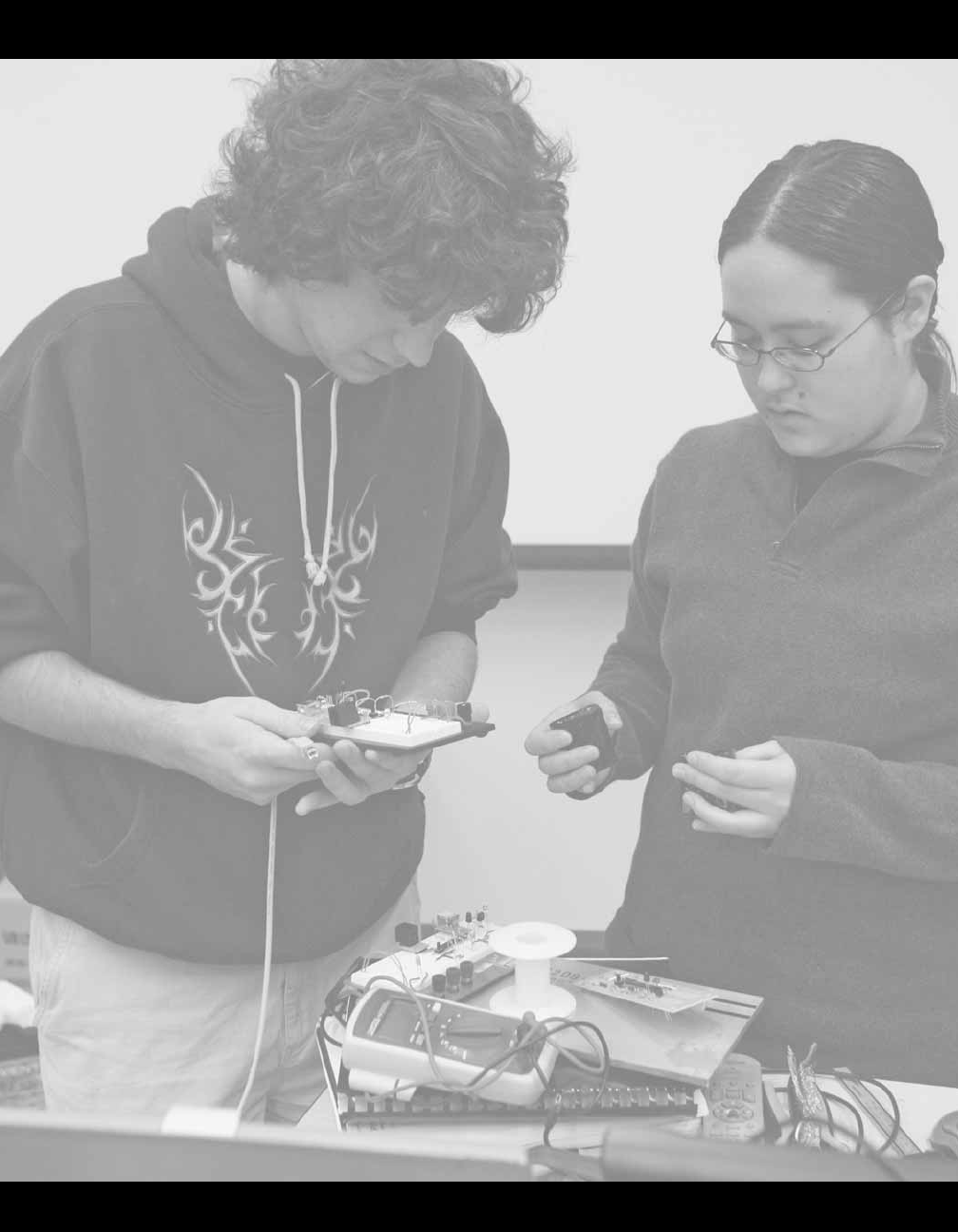
Academic Policies

Academic
Policies
One of Olin’s highest priorities is the well being
of its students, and Olin recognizes that indi-
vidual circumstances often call for individual
approaches. Olin’s faculty, staff, and adminis-
tration will always attempt to do what is right,
regardless of the formal rule. The following
policies will help to ensure that students are
treated fairly.
Attendance Policy
Students are expected to attend all classes at
Olin. Each instructor will establish and publish
the class attendance policies for reporting
anticipated absences and making up missed
work, including lab experiences and project
work. The Dean of Student Life will grant
exceptions for illness, religious observance, or
other reasons deemed appropriate.
Olin Exposition
The Olin Exposition is a public event at the end
of each semester where students present aca-
demic and non-academic work to an audience
that includes the entire Olin community and
external visitors. It is an opportunity for stu-
dents to reflect on the semester, celebrate their
achievements and share them with others,
practice communication skills, and demon-
strate their activities and abilities. Expo is an
opportunity for people outside the college to
see what Olin students can do, and it is an
important way of involving external constituen-
cies in the activities of the school. Faculty, staff,
students and external visitors are asked to
evaluate student presentations as a way of
helping students improve and also as a way of
evaluating our programs.
Normally all registered students are required to
participate in Expo, both as presenters and as
evaluators. Students who cannot attend Expo
for any reason should petition the Dean of
Student Life as early as possible for an excused
absence. Failure to participate in Expo is noted
by the faculty Expo Coordinator. Persistent fail-
ure to participate without an excused absence
may be considered a violation of the Honor
Code, particularly regarding Passion for the
Welfare of the College.
Definition of Full-Time Status
Enrollment at Olin College is for full-time study
in engineering. Students are expected to follow
the curriculum design for each class year and
carry a usual load of 16 degree credits. The
definition of full-time study is a minimum of 12
attempted degree credits each semester and a
maximum of 20 attempted degree credits each
semester. Part-time study is generally not avail-
able at Olin College; however, special cases
will be considered by the Assistant Dean of
Student Life for Advising.
Course Overload Policy
Olin students may register for a maximum of
20 credits each semester. The maximum load
of 20 credits is a total of degree and non-
degree activities. In exceptional circumstances,
students may petition the Committee on
Student Academic Performance (COSAP), with
the consent of their adviser, for approval of a
course overload. This reflects Olin’s commit-
ment to reasonable expectations. Non-degree
credits result from Passionate Pursuits. First-
year, first-semester students are limited to tak-
ing a maximum of 18 credits. This typically rep-
resents sixteen credits of standard first-year
curriculum and an optional two credit
Introductory Programming course.
Class Standing
Class standing is determined by the number of
degree credits a student has earned in relation
to the 120 required for graduation. The follow-
ing table is a breakdown of earned degree
credits and their corresponding class year and
56
CATALOG
FRANKLIN W. OLIN COLLEGE OF ENGINEERING
ACADEMIC POLICIES ■

represents a reasonable expectation of
progress toward a degree over four years.
Class Earned Degree Credits
First-Year 0–30
Sophomore 31–60
Junior 61–90
Senior > 90
Declaration of Major/Change of
Major
Students are expected to declare their major
no later than the time of registration for the
fourth semester. Major declaration forms are
available at the Student Accounts and Records
Center (StAR) website (http://star.olin.edu) and
must be signed by the student and his or her
adviser. Students declaring the Engineering
major must also complete and submit a course
plan form at the same time. The instructions
and form can also be found on the StAR
website.
Change of majors can be submitted using a
declaration of major form and a course plan
form (if appropriate). Students that change
their major should be aware of their remaining
degree requirements. Additionally, they are
responsible for tuition, room/board and fees for
any semesters beyond the eight covered by the
Olin scholarship.
Registration
Prior to each semester, there will be a designat-
ed registration period in which students will
speak with their adviser and make choices for
course selection. Registration is done on-line.
Instructions are available each semester in the
published registration booklets.
Cross-Registration Policy
Olin has cross-registration agreements with
Babson College, Brandeis University, and
Wellesley College (the BBW schools). These
agreements increase the academic offerings
available to Olin students in the natural and
mathematical sciences, arts, humanities, social
sciences and business. Olin students, with the
exception of first-semester, first-year students,
are permitted to enroll for one course each
semester at each of the BBW schools, subject
to the continuation of the cross-registration
agreements. Taking a course at a BBW school
will count toward a student’s total degree cred-
it load at Olin. Normally, Olin students are not
permitted to take courses at BBW schools
which would substantially duplicate the con-
tent of a course or set of courses available at
Olin, but may petition the Course Substitution
and Transfer Board (CSTB) for an exception to
this rule. With prior approval from the CSTB,
students may use courses taken at the BBW
schools to satisfy general course requirements,
distribution requirements, and program-
specific course requirements.
Students are responsible for all deadlines and
registration procedures related to the host
school. Information regarding procedures for
cross-registration is provided in the semesters’
registration booklet.
Note: Due to the variation
of grading deadlines at BBW schools, seniors
are strongly encouraged not to cross-register
during their final semester at Olin.
The Add Period
During the first 10 instructional days of a
semester, a student may alter her or his sched-
ule by adding and/or dropping courses with
approval from her or his adviser and the appro-
priate instructing faculty. Requests for changes
must be made during the 10-day period.
Students are responsible for submitting their
request electronically or in person at the
Student Accounts and Records Center no later
than the 10th class day. Courses cannot be
added after the 10th class day. Special circum-
stances may be granted for BBW-sponsored
courses when there is a variation in the aca-
demic calendars.
The Drop Period
After the Add Period, a student may decide to
drop a course from his or her schedule without
CATALOG
57
FRANKLIN W. OLIN COLLEGE OF ENGINEERING
■ ACADEMIC POLICIES

penalty as long as he or she maintains a mini-
mum of 12 degree credits. The drop date is the
45th instructional day of the semester
Course Withdrawal
Students may not withdraw from courses
within the Integrated Course Blocks during
their first year at Olin. Students may withdraw
from other courses up through the last day of
instruction in the semester. To withdraw from
a course, students need written approval from
her or his adviser and the appropriate instruct-
ing faculty. Students must then process the
course withdrawal at the Student Accounts and
Records Center. A grade of Withdrawn (W)
will be entered for the course and will not
affect the grade point average. Credits attempt-
ed will be noted, but course credit will not be
earned. Students are responsible for meeting
with their adviser to determine how the credits,
and/or requirement will be completed in the
future.
Olin students cross-registered at one of the
BBW schools must follow the academic policy
on course withdrawals for the host school.
Half-Semester Courses
The Add, Drop and Course Withdrawal periods
are prorated for half semester courses. The
Add Period is the first five days of the semes-
ter. The Drop Period is 10 days prior to the last
day of instruction. Course withdrawals can be
done up through the last instructional day of
the half-semester course.
Grading at Olin
Philosophy
Standards-based Grading: Course grading at
Olin will be based on student progress toward
defined course goals. Summary metrics (e.g.,
GPA) will be provided on the student’s tran-
script, but relative summary metrics (e.g., class
rank) are neither published nor tabulated. The
Dean of Faculty will annually conduct a review
of grade distributions and grading procedures.
Grading Rules and Regulations
1. Privacy: Olin will not publicly post either
grades or summary metrics (e.g., GPAs) in any
form that allows identification of any particular
individual’s performance. It is expected that
students will respect the privacy of each other’s
grades.
2. Grading Clarity Requirements: On the first
day of instruction, each Olin class will publish
the following information:
a. Learning Objectives that specify the
knowledge, skills, and attitudes that stu-
dents are expected to develop or attain in
the class. The learning objectives should
be an effective instrument for students to
understand what they will learn and how
their learning will be evaluated.
b. Grading Criteria that specify how the final
course grade is determined. Some
aspects of grading are necessarily based
on the professional judgment of instruc-
tors, informed by their experience, and
are subjective.
3. Feedback: Olin expects instructors to pro-
vide students with feedback on their perform-
ance. If an instructor feels a student will not
pass a course, or if the instructor is otherwise
concerned about a student’s performance, she
or he will issue an academic deficiency notice
in a timely manner. Copies of this notice will be
sent to the student, the student’s faculty advis-
er, and the Assistant Dean of Student Life for
Advising.
4. End of Semester Feedback to the Adviser:
Olin advisers have real-time access to advisee’s
course grades through the Student Information
System. In addition, instructors will notify
advisers of any significant concerns noted dur-
ing the semester.
5. Pass/No Record First Semester: In the first-
semester, first-year, Olin instructors may report
the student’s grade to the student and to the
adviser, but will report only a grade of Pass (P)
or No Record (NR) to the Registrar. A grade of
No Record does not affect the student’s GPA. In
58
CATALOG
FRANKLIN W. OLIN COLLEGE OF ENGINEERING
ACADEMIC POLICIES ■

subsequent semesters, Olin instructors will
report the student’s final course grade, accord-
ing to the scale outlined below, to the
Registrar.
6. Course Grades: Course grades at Olin pro-
vide students, their advisers, potential employ-
ers and graduate schools information about
overall performance. Course grades are deter-
mined based upon a mix of demonstrated
comprehension, skill, participation, and effort.
7. Grading Scale: The Olin College grading
scheme contains letter grades with a resulting
grade point average (GPA) on a four-point
scale. Students will be assessed using the fol-
lowing interpretation:
Grade Assessment Point
Description Value
A Excellent 4.0
A- 3.7
B+ 3.3
B Good 3.0
B- 2.7
C+ 2.3
C Fair 2.0
C- 1.7
D+ 1.3
D Poor 1.0
F Failing 0.0
I Incomplete (temporary grade) n/a
IF Incomplete Failing 0.0
IL Incomplete / Leave of Absence
(temporary grade) n/a
IP In Progress (temporary grade)
L/NR Leave/No Record n/a
NC
No Credit for Pass/No Credit Option
n/a
NR No Record n/a
P Pass n/a
R Course Repeated n/a
TR Transfer Credit n/a
W Withdrew from Course n/a
8. Grade Replacement: If a student successfully
achieves remediation of an eligible course (see
Remediation in the ICBs), the course grade will
be changed. The grade given as a result of
remediation activities may be a Pass (P) for a
first-year, first-semester course remediation
or no higher than a C for other course remedia-
tion.
9. Repeated Courses: If a student retakes a
course as part of remediation, the original
attempted course will show a grade of Course
Repeated (R). If a student retakes a course that
is not part of remediation, the original grade
will remain, but will not be factored into the
student’s GPA. In both scenarios, the new
grade or transfer credit will appear on the
transcript in the semester in which the course
was retaken.
10. Minimally Sufficient Grades: A grade of D
or Pass is sufficient to earn credit for a course.
A grade of D is sufficient to satisfy a course
requirement.
A grade of C- or Pass is sufficient to satisfy a
prerequisite requirement.
11. Pass/No Credit: Up to 12 credits of a stu-
dent’s distribution requirements may be satis-
fied by taking classes that are usually offered
for grades as Pass/No Credit. In such cases, a
Pass is given for performance equivalent to a
grade of C- or higher. Courses taken Pass/No
Credit may not be used to meet course require-
ments unless the course is not offered for
grades (e.g. first-semester first-year P/NR
courses).
Courses that are only offered Pass/No Credit,
Independent Study and Research do not count
toward the 12 credit limit. Students must
declare their Pass/No Credit grading option by
the drop date of each semester. The Pass/No
Credit option does not impact the GPA; either
Pass or No Credit will appear on the transcript.
Once a student decides to take a course
Pass/No Credit, he or she cannot revert back to
receive a letter grade.
12. Passionate Pursuits (including Research as
Passionate Pursuit): Passionate Pursuits are
non-degree credit, and will be listed on the
transcript if the nature of the activity and the
CATALOG
59
FRANKLIN W. OLIN COLLEGE OF ENGINEERING
■ ACADEMIC POLICIES

60
CATALOG
FRANKLIN W. OLIN COLLEGE OF ENGINEERING
ACADEMIC POLICIES ■
level of completion are sufficient to merit cred-
it. In exceptional cases, the faculty supervisor
may include an official letter of commendation
in the student’s file. This commendation letter
will be available to external parties.
13. The Olin Transcript: A student’s academic
transcript at Olin includes the following infor-
mation:
a. A list of classes the student took in each
semester, and a record of the student’s
final grades in those classes. First-semes-
ter first-year transcripts will show only
classes that were passed. Classes taken
Pass/No Credit after the first year appear
either as a Pass or as a No Credit
b. The student’s GPA.
c. A list of non-degree activities taken each
semester with a cumulative total of credits
earned. There are no grades associated
with non-degree activities.
d. Co-Curricular offerings in which the spon-
soring staff or faculty member reported
sufficient student participation for a tran-
script notation.
4. Grading and Credits of Cross-registered
Courses: Olin students who take a course at
Babson, Brandeis, or Wellesley (the BBW
schools) will receive credit for the course if
they receive a passing grade. The grade will
be recorded on their transcript and be factored
into their grade point average. Credits from
these schools will be counted on a one for one
basis at Olin. For example, if a three credit
course is taken at Babson, it will count as three
Olin credits. A one unit Brandeis or Wellesley
course is equal to four Olin credits. Courses
that use other accounting schemes may be
translated into equivalent Olin credits rounded
to the closest whole number.
Honor Code
It is expected that students will behave with
integrity and according to the Honor Code.
Incomplete Policy
In extenuating circumstances, a student may
request an Incomplete (I) grade by petitioning
the Dean of Student Life. If an Incomplete
grade is approved, the student will be granted
an extension period to complete the course-
work. The length of the extension will be
determined by the Dean of Student Life but will
not end later than the end of the subsequent
semester. A grade of I will be listed as a
temporary grade and will not affect the grade
point average. If the work is not completed
by the end of the subsequent semester, the
incomplete grade of I will be changed to IF,
Incomplete Failing, or an alternate grade upon
approval of the instructor and the Dean of
Faculty. An IF grade does affect a grade point
average. Incompletes may not be used for
remediation purposes.
An Incomplete is generally approved only
when some specific event or illness prevents
the student from completing a specific part of
the course (such as completing a paper, project
or exam.) An Incomplete will not be approved
in instances where a student is demonstrating
an overall difficulty covering or understanding
the course materials and appears to need more
time or additional instruction to learn the mate-
rial. If such general difficulty occurs in one of
the first-year ICB courses, the student should
attempt to complete the course. If the student
receives a NR in the first semester or a D+ or
below in subsequent semesters, he or she will
proceed according to the remediation policy
(see below). For all other courses, the student
should discuss available options with his or her
course instructor and adviser.
Extra Help
For all courses, faculty members provide extra
help for students as appropriate. In addition,
individual tutors are assigned by the Office of
Student Life. Students who feel that individual
tutoring would be helpful to them should
contact the Assistant Dean of Student Life for
Advising as early in the semester as the need
becomes apparent.

Remediation in the ICBs
For Integrated Course Block (ICB) courses in
the first year, Olin provides a remediation sys-
tem. The objective of remediation is to allow
students to keep pace academically with their
peers in the first year.
As the need becomes apparent, ICB faculty
members work with students to develop a
remediation policy specific to the courses they
are teaching. At the discretion of the faculty
member, students may be allowed to retake a
test, rewrite a paper, or redo other projects or
assignments. Students may get remedial assis-
tance from faculty, peer tutors or individual
tutors.
The ICB is a graduation requirement so a grade
of NR or F must be remediated. In addition, the
ICB courses are prerequisites for many other
courses at Olin, so a grade of D or D+ must be
remediated, although a student may be
allowed to go on while remediation is pending.
There are three ways a student can remediate:
Remediation exam: A student may study inde-
pendently and pass a written or oral remedia-
tion exam. The student may attempt this exam
only once, either at the beginning or the end of
the semester following the original course peri-
od. The remediation exam will be prepared and
evaluated by the original faculty member who
taught the student’s Physics, Math or
Engineering component of the ICB. Assistance
in preparing for the exam is available from des-
ignated peer tutors for Physics, Math and
Engineering.
Remediation at another institution: With prior
approval of the Course Substitution and
Transfer Board (CSTB), students may remediate
by taking a class at another institution (but not
at one of the BBW schools). The CSTB will
work with the Committee on Student Academic
Performance (COSAP) to determine the grade
required for remediation at another institution.
Retake the course: If a student does not suc-
cessfully remediate the course before it is next
offered, the student will be required to retake
and pass the failed component(s) of the ICB at
its subsequent offering.
Students successfully remediating through one
of these three options will have their original
grade replaced on their transcript. For letter
graded courses, the remediated grade can be
no higher than a C.
Grade Change Policy
Dispute of a Grade
Students wishing to dispute a grade should
first have a discussion with the instructing fac-
ulty member. If the student and faculty are in
disagreement after the discussion, the student
may appeal to the Dean of Faculty. The Dean of
Faculty will meet with the student within 14
days of the appeal and will solicit a statement
from the faculty member. Following this
process, the Dean of Faculty will review the
case and submit a recommendation to the fac-
ulty member. The faculty member will then
make a final decision, in consultation with the
Dean of Faculty.
After one calendar year (from the end of the
original grading period), all grades are final.
This applies to clerical errors, grade disputes,
remediation, and the grade replacement policy.
All grade changes must be made in writing and
signed by the Dean of Faculty.
Final Exam Policy for Excused
Absences
Students who are unable to take their final
exams for legitimate reasons and wish to
request a make-up exam generally must obtain
advance authorization from the instructing fac-
ulty members and the Office of Student Life. In
the event that advanced authorization cannot
be obtained due to extenuating circumstances,
students should contact the Office of Student
Life and the instructor(s) as soon as they are
able. If the exam is not completed prior to
the end of the grading period, a grade of
Incomplete, I, will be recorded on the student
record. An incomplete grade is a temporary
grade that does not affect a grade point aver-
age.
CATALOG
61
FRANKLIN W. OLIN COLLEGE OF ENGINEERING
■ ACADEMIC POLICIES

62
CATALOG
FRANKLIN W. OLIN COLLEGE OF ENGINEERING
ACADEMIC POLICIES ■
Academic Recommendation Board
The Academic Recommendation Board (ARB)
has the responsibility to foster change and act
as a steward of the curriculum. The ARB regu-
larly reviews the curricular structure and
course options and reviews and authorizes
changes in degree requirements. Students may
petition ARB if they need to apply for an excep-
tion to graduation requirements.
Course Substitution and Transfer
Board
The Course Substitution and Transfer Board
(CSTB) is a subcommittee of the ARB and has
the responsibility of awarding Olin credit for
classes taken at another institution. There are
three cases where a student can take a class
at another institution and get credit toward an
Olin degree: cross-registration at Babson,
Brandeis or Wellesley, classes taken during a
Study Away experience, and classes taken at
another institution during the summer, during
a leave from Olin, or before enrolling at Olin.
The CSTB also determines what distribution
and course requirements a non-Olin course
can count for. Many courses at the BBW
schools have been pre-approved; a list of
these courses is posted on the ARB website
(http://arb.olin.edu). Prior to taking a non-Olin
class not on the pre-approval list, students
should request permission from the CSTB to
count this class toward satisfying a distribution
or course requirement.
Committee on Student Academic
Performance
The Committee on Student Academic
Performance is charged by the Dean of Student
Life and is empowered to review, interpret, and
propose academic performance policies. This
committee considers petitions to waive exist-
ing academic performance regulations and acts
as an appellate body for students with academ-
ic performance grievances. The committee also
examines the records of students who are not
making satisfactory progress toward a degree.
This committee is chaired by the Dean of
Student Life or the Dean’s designee (non-vot-
ing, except in the case of a tie) and consists of
the Registrar (non-voting), the Assistant Dean
of Student Life for Advising, and three faculty
members. Students wishing to appeal a deci-
sion on policy must submit their appeal to the
Registrar within one week of the original deci-
sion.
Students should petition COSAP if they want to
exceed the approved maximum credits in any
given semester.
Student Academic Performance
The Committee on Student Academic
Performance uses the following guidelines in
determining the academic status of students.
Students not in Good Academic Standing will
be placed on probation. Students not in Good
Academic Standing for two consecutive semes-
ters will be reviewed by the committee and
may be required to withdraw. The committee
may consider extenuating circumstances in
applying these general guidelines.
Qualitative Measure of Academic Performance:
Student’s First Semester: Good Academic
Standing is defined as receiving Pass grades in
all courses by the start of the second semester.
Subsequent Semesters: Good Academic
Standing is defined as having a minimum
cumulative grade point average of 2.00 by the
end of the semester.
Quantitative Measure of Academic
Performance:
In order to complete the degree in four years
(eight semesters), each student will normally
take 16 credits (four courses) per semester.
Olin College expects students to make reason-
able progress toward their degree each semes-
ter. As a result, to remain in good standing a
student must complete a minimum of 12
degree credits each semester. The Committee
on Student Academic Performance will review
this quantitative measure in addition to the
qualitative measure of a minimum grade point
average.

Academic Readmission
In making decisions on readmission petitions,
the Committee on Student Academic
Performance (COSAP) will expect the former
student to produce timely evidence of good
academic performance in college courses com-
parable to Olin courses, employment and/or
community service references, and a formal
statement explaining changes that will con-
tribute to their academic success at Olin. Credit
for courses taken elsewhere while a student is
withdrawn from Olin will be transferable to
Olin only if approval is obtained from the
CSTB prior to enrollment in each course.
Program Group Recommendations
The Program Groups (ECE, ME, E) will periodi-
cally review the progress of every student with
a declared major. The program groups will
work with students and their faculty adviser if
performance in program-specific course
requirements is unsatisfactory or if trends indi-
cate that such performance may become unsat-
isfactory.
College Withdrawal Policy
Students may wish to leave Olin College prior
to completing their degree. Such a decision
may be difficult to make. Therefore, we encour-
age students to discuss the situation with their
faculty adviser and the Assistant Dean of
Student Life for Advising. A student should
consider whether a Leave of Absence might
provide a more suitable means for them to
address the underlying circumstances for the
withdrawal. The student’s decision to withdraw
indicates she or he does not intend to return. If
a student needs a leave of absence, she or he
should follow the procedures described below
for requesting a leave. Dropping all registered
courses does not automatically result in an offi-
cial withdrawal from the college.
Voluntary Withdrawal
A student can voluntarily withdraw from Olin
College. The student must file a College
Withdrawal Form with the Assistant Dean of
Student Life for Advising. Withdrawing for non-
medical reasons during a semester will yield
grades of W, Withdrew, on the student’s aca-
demic record. If Voluntary Withdrawal occurs
after the last instructional day of the semester,
grades from that semester will appear on the
transcript.
Medical Withdrawal
Students who need to withdraw from Olin
College for medical reasons should complete a
College Withdrawal Form with the Assistant
Dean of Student Life for Advising. If a student
intends to return to the College, he or she
should follow the procedure outlined in the
Leave of Absence policy. Medical Withdrawals
during a semester (i.e., by the last instructional
day of a semester) will result in deletion of the
semester’s registration from the student’s
record. Students may be entitled in these cir-
cumstances to a full or partial refund of certain
expenses and fees according to the guidelines
of the College’s refund policy. Medical docu-
mentation may be required to complete the
process.
Required Withdrawal
At times, the college may require a student to
withdraw from Olin College for academic or
other reasons. Students who are required to
withdraw may not reenroll at Olin without
approval from the Office of Student Life.
Leave of Absence Policy
A student may request a leave of absence for
up to 180 days in any 12-month period.
To initiate a leave of absence, a student should
meet with his or her adviser and complete a
Leave of Absence Form. The request is then
forwarded to the Assistant Dean of Student Life
for Advising for approval. Documentation of
the reason for the leave of absence (medical
or otherwise) should accompany the student’s
request for a leave. The request, when
approved, and any accompanying documenta-
tion will be forwarded to the Registrar for pro-
cessing and placed in the student’s academic
file.
In the event a Leave of Absence is approved,
the student’s status will be noted as “On
Leave.” If a leave is not approved, students
CATALOG
63
FRANKLIN W. OLIN COLLEGE OF ENGINEERING
■ ACADEMIC POLICIES

have the right to appeal the decision to the
Dean of Student Life within two weeks of the
date of the denial of leave. There are two kinds
of leaves:
1. A Leave of Absence Mid Semester: This type
of leave is requested when a semester is in
active session*. In this case, all courses for
which the student is registered will be tem-
porarily designated as Incomplete/Leave of
Absence (IL). Any course that is not subse-
quently completed will then be changed to a
grade of Leave/No Record (L/NR) and will be
recorded internally for that course.
Incomplete/Leave of Absence and Leave/No
Record grades do not affect the student’s grade
point average. The effective date of this leave
is the approval date of the leave.
Incomplete/Leave of Absence grades must be
completed no later than 90 days after the stu-
dent’s return date, or at another date deter-
mined by the faculty member and adviser.
2. A Leave of Absence Between Semesters:
This type of leave is requested when a semes-
ter is not in active session and there is a cir-
cumstance that impacts the student’s ability to
continue in the next semester. In this type of
leave, there are no grade entries made. The
student’s schedule for the ensuing semester
will be deleted. The student will be placed on
leave effective the first day of the upcoming
semester for up to 180 days in any 12-month
period.
If a student does not return from a leave of
absence, the student will be withdrawn from
the college as of the date of expected return.
All Incomplete/Leave of Absence grades will be
changed to Leave/No Record.
Return from Leave or Withdrawal
Students wishing to return from a leave of
absence or voluntary withdrawal, leave of
absence or medical withdrawal from the col-
lege should contact the Office of Student Life.
Study Away Program
One of the founding principles of Olin College
was that each student should have the oppor-
tunity to have a learning experience “away”
from the College. This ideal was articulated
early in the creation of the college with the
expressed objective of having students learn to
be citizens of the world. The Olin Away
Program was created to deliver on this princi-
ple, and provide students with the opportunity
to broaden their perspective and views of the
world.
Students in their junior year can choose
between three types of away experiences: a
Direct Exchange Program, a Pre-Approved
Program, or a Student-Designed Program.
For additional information please visit:
http://awayprograms.olin.edu
Transfer Credit
Olin College generally does not accept transfer
credit for incoming students, but the Course
Substitution and Transfer Board (CSTB) may
grant exceptions on a case by case basis for
incoming students who have demonstrated
strong performance in rigorous courses taken
at accredited institutions.
Enrolled students wishing to take a course at
another college and transfer the credits to
Olin must obtain prior approval from the CSTB.
A student will need to provide detailed infor-
mation about the course including, but not lim-
ited to, a course description and syllabus.
Pre-approval forms can be found at:
http://star.olin.edu
The CSTB will ask appropriate faculty to review
the course materials before granting approval
and determine the minimum grade standard
for transfer of the specific course. If approved,
the CSTB will notify the student in writing.
Once the course is completed, it is the student’s
responsibility to have an official transcript sent
to Olin College. Provided the student meets the
minimum grade requirement for transfer, the
course and the credits will appear on the
student’s Olin transcript. The grade does not
transfer. The Olin College curriculum is for
64
CATALOG
FRANKLIN W. OLIN COLLEGE OF ENGINEERING
ACADEMIC POLICIES ■
* This active session does not include the
study or final exam period. If a student has an
unexpected event that impacts his or her ability
to take a final exam, he or she should refer to
the Final Exam Policy for Excused Absences.

eight full semesters. Transfer credit does not
imply that a student is able to finish his or her
degree in less than eight semesters.
In order to receive a degree from Olin, students
must earn at least 60 of their credits from Olin
or BBW courses.
AP Exams and Advanced Study
Olin College does not accept AP Exam credit
for incoming students. Olin College does, how-
ever, recognize that many students enter Olin
with a strong background in mathematics and
physics. First-year students may take a place-
ment exam in the subjects of the first-year
mathematics or physics courses during orienta-
tion. Placement exams at Olin are calibrated to
a high standard.
Special Accommodations Policy
It is Olin College’s policy to comply fully with
all state and federal disability laws. Olin does
not discriminate against applicants or students
with disabilities, and will consider modification
to academic programs where necessary to
ensure that our requirements are not discrimi-
natory, as long as the modifications do not fun-
damentally alter the nature of our programs.
The Office of Student Life coordinates services
for students with learning disabilities, sensory
impairments, psychological disabilities, and
medical conditions. Students are responsible
for identifying themselves to the Assistant
Dean of Student Life for Advising and provid-
ing appropriate documentation of their disabili-
ty and need for accommodation in a timely
manner. Students requesting accommodation
should contact the Assistant Dean of Student
Life for Advising as soon as possible after
matriculation. Services for students with learn-
ing disabilities may include, but are not limited
to, academic accommodations, coaching on
organizational and time management skills,
faculty notification, and academic advising.
Services for students with physical, sensory, or
psychological impairments as well as medical
conditions may include, but are not limited to,
academic accommodations, assistance with
adaptive technology, accessibility accommoda-
tions, and academic advising. Any specific
modifications granted will be based on detailed
discussions with each student about their par-
ticular situation, and on information from a
medical care provider concerning the student’s
disability and related needs.
CATALOG
65
FRANKLIN W. OLIN COLLEGE OF ENGINEERING
■ ACADEMIC POLICIES

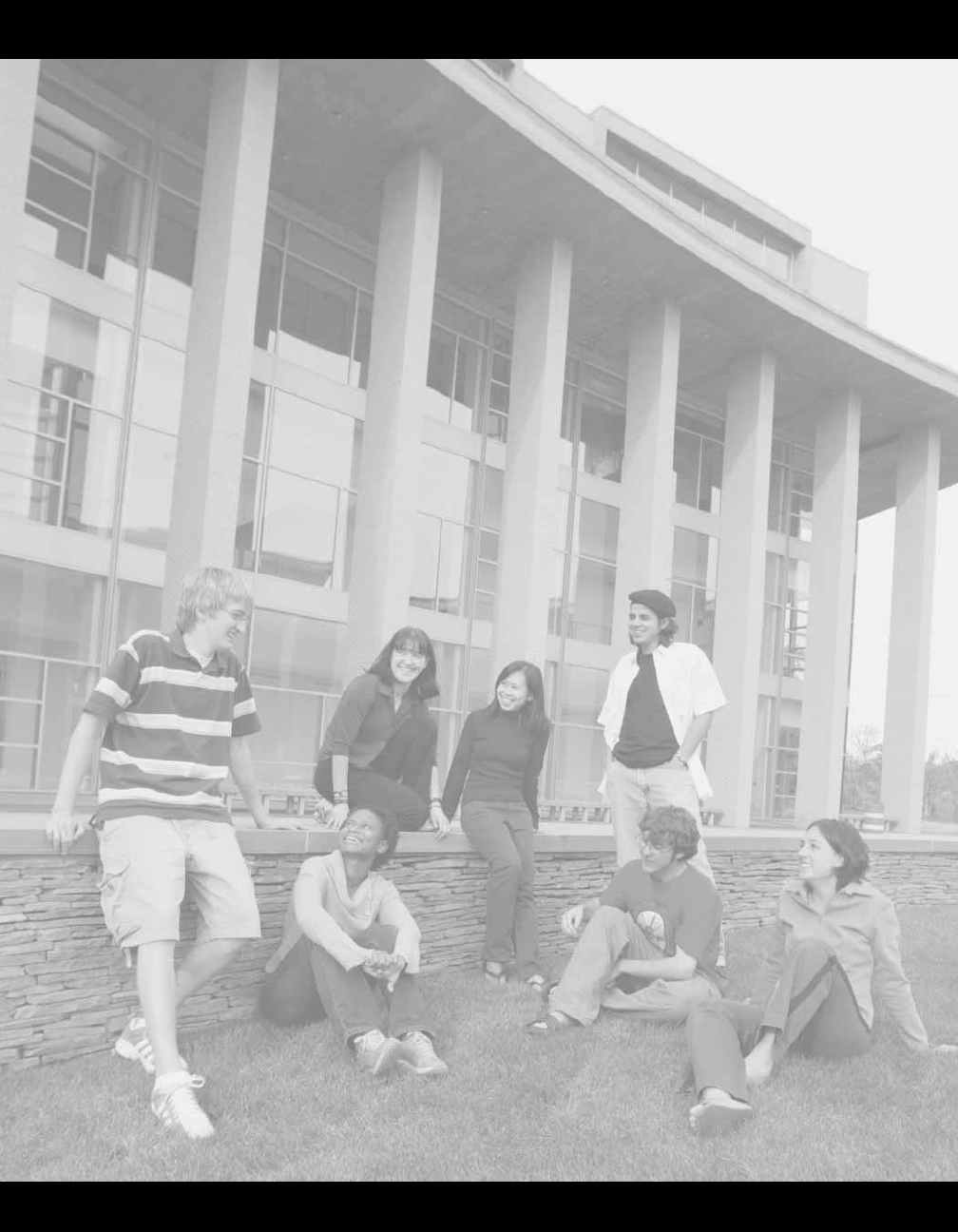
Student Life
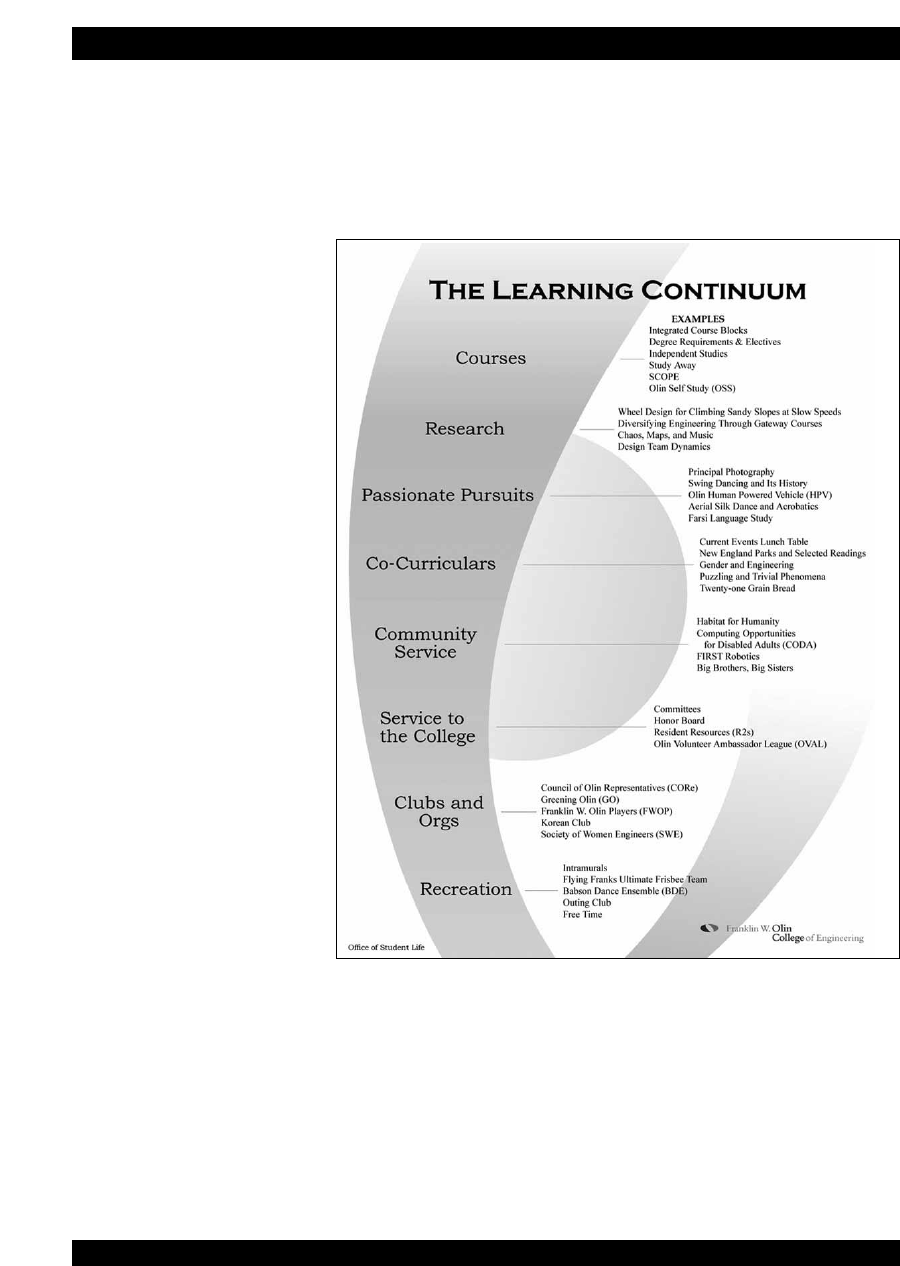
68
CATALOG
FRANKLIN W. OLIN COLLEGE OF ENGINEERING
STUDENT LIFE ■
Student Life
Overview
The first few classes at Olin
College have the rare ability
to help create the campus cul-
ture. Each student has the
chance to make a real impact
on the direction of programs,
available opportunities and
the overall atmosphere of the
new college.
While still new, Olin already
offers the support, flexibility
and services students need
for a successful, well-rounded
college career — from a wide-
range of clubs and activities
to academic advising and
health services.
The Office of Student Life also
takes student development
one step further with the Olin
College Learning Continuum.
While nearly every college in
America offers academic
courses and student organiza-
tions, seldom is much thought
given to the unstructured
zone between the curriculum
and extra-curriculum, or the
connections between them. At
Olin, we have given this zone
a lot of thought.
The Olin College Learning
Continuum consists of courses, undergraduate
research opportunities with faculty, non-degree
credit Passionate Pursuits, transcript noted
co-curricular offerings, community service,
committee work or other service to the college,
clubs and organizations, and recreation. The
Office of Student Life staff encourages student
participation along the full range of opportuni-
ties in the Learning Continuum and works to
foster connections among the elements on the
continuum.

Honor Code
A fundamental element of Olin’s culture is
trust. As such, our Honor Code requires all
members of the Olin community to conduct
themselves with honor and integrity. The code,
drawn from a few core values, consists of a
small set of intentionally broad standards by
which every action must be measured. While a
small number of policies illuminate Olin’s prin-
ciples, students live by the core values embed-
ded in the code. To read the full code, visit the
student life page of the Olin website,
http://www.olin.edu/student_life/.
Passionate Pursuits
A Passionate Pursuit is an activity in which stu-
dents propose a semester-long project, solicit
faculty participation, and establish objectives
(i.e. learning goals, type of deliverable) that
constitute satisfactory completion of the pur-
suit. In order to earn non-degree credit for a
Passionate Pursuit, students must submit a
credit proposal and give a faculty-assessed
presentation or performance at the conclusion
of the activity. Funding is available via the
Office of Student Life.
Co-Curriculars
Co-curricular offerings are non-credit activities
combining fun and intellectual awareness.
They are scheduled for a limited time (e.g. one
semester), are led by a staff or faculty member
or by a student working in concert with a facul-
ty or staff member, and are funded by the
Office of Student Life. They differ from curricu-
lar offerings in that they are not graded and
attendance is not strictly enforced. They differ
from extra-curricular activities in that they have
an intellectual component, faculty/staff leader-
ship, and limited lifespan. Examples of recent
co-curricular offerings include: Advanced
Theoretical Zymurgy, Conversations about the
Law, Current Events Table, FoodLab, Gender
and Engineering, Latin Dance, Metal Casting,
Play with Clay, Puzzling and Trivial
Phenomenon, Science Fiction Book Club, and
Whose Improv Is It Anyway?
Academic Advising
Coursework and advising are different aspects
of the same process — developing a well-edu-
cated person. Olin College views advising as a
central role of our faculty. Students’ relation-
ships with their advisers are among the most
important ones they will establish here and can
have a significant impact on their Olin educa-
tion. The advising system includes individual
advising, advising families, extended advising
families, the Sibbs program, and Annual
Reports and CVs.
Individual Advising
Every student has an Olin faculty member as
an adviser. Every adviser’s goal is to facilitate
students’ academic and personal development
throughout their education at Olin. Although
they help students with courses and other aca-
demic choices, their most vital responsibility is
to help advisees manage the difficulties and
stresses inherent in any academic setting.
Students meet with their advisers regularly all
four years, at a rate determined by the student
and the adviser.
Advisers are not around just to approve cours-
es or discuss academics. They serve a variety
of functions including mentoring, crisis aware-
ness and support, discussing Annual Reports
and CVs, providing institutional and career
information, and helping students find a
balance among curricular, co-curricular and
extracurricular activities. Students should view
advisers as helpful resources for whatever
issues they are dealing with — academic,
social or personal. When advisers do not have
the needed information or expertise, they help
find someone who does.
Students may remain with one adviser
throughout or change advisers at the formal
“adviser request period” at the end of each
academic year. A student wishing to switch
advisers at other times may discuss this with
Assistant Dean of Student Life Alison Black.
CATALOG
69
FRANKLIN W. OLIN COLLEGE OF ENGINEERING
■ STUDENT LIFE

Olin wants advising to be successful and will
do whatever we can to make this relationship
supportive, positive and effective.
Advising Families
Individual advising relationships are set within
advising families consisting of all a faculty
member’s advisees, and extended families con-
sisting of three faculty members and their
advisees. Students will often meet individually
or in advising families with their primary advis-
er. Other times they will meet with some or all
of the other advisers and students in their
extended families. Families and extended fami-
lies vary in their activities, but all provide a
structure for incoming students to meet upper-
class students, allow for cross class meetings
and discussions, give students multiple faculty
perspectives, and plan periodic social activities.
Students are strongly encouraged to take part
in initiating and organizing advising family and
extended advising family activities; funds are
available from the Office of Student Life.
Sibbs Program
The Sibbs program builds bridges (hence the
double “b”) between first-year and upper class
students. Volunteer upper-class Sibbs (often
from the same advising family) “adopt” a first-
year to help him or her adjust to the unique
culture, quirks and inside information of Olin.
They contact their incoming Sibb over the
summer to answer questions before arrival.
Early in the year, Sibb pairs get together for a
meal at least weekly. Upper-class Sibbs also
introduce their first-year Sibbs to people and
places in the area by inviting them to do sever-
al activities during the fall. The most important
role, however, is to talk with, answer questions
from, give information to, and generally be
available to the incoming student. If either
member of the Sibb pair feels that the relation-
ship is not working well, they should discuss
this with each other or contact Assistant Dean
of Student Life Alison Black.
Annual Reports and CVs
Throughout their time at Olin, students will
write and revise Annual Reports and CVs; these
documents will be shared with advisers when
appropriate. The purpose of writing these doc-
uments and discussing them with advisers is to
help students choose wisely from the myriad
of curricular, co-curricular and extracurricular
options available and make adjustments to get
the most out of their Olin experience. The CV
is a listing of the activities across the Learning
Continuum the student has participated in each
semester. CVs provide a helpful background for
meeting with advisers to plan for the future as
well as for writing resumes for job or intern-
ship applications. In the Annual Report, stu-
dents reflect on the challenges and successes
of the year and set goals for the future.
Students will have the opportunity to develop
their Annual Reports and CVs through work-
shops offered by the Office of Student Life.
Students are encouraged to keep these docu-
ments up to date and submit them to their
adviser regularly. Certain activities, such as
registering for courses or passionate pursuits,
are impacted by having Annual Reports and
CVs up to date. Students who change advisers
should submit recent copies of these docu-
ments to their new adviser by their first meet-
ing.
Prior to the commencement of their first year
at Olin, new students will be asked to submit
educational and personal goals to their adviser.
These goals can then be used to assist the
student in the development of their first Annual
Report.
Community Service
Mission
One of the guiding missions of Olin College is
to instill a spirit and practice of “giving back”
among students through significant and ongo-
ing service to the community. Philanthropy was
the central force in the F. W. Olin Foundation
and Olin College since its inception and Olin
70
CATALOG
FRANKLIN W. OLIN COLLEGE OF ENGINEERING
STUDENT LIFE ■

CATALOG
71
FRANKLIN W. OLIN COLLEGE OF ENGINEERING
■ STUDENT LIFE
College is committed to supporting and contin-
uing this tradition among its students, faculty
and staff. Olin College encourages community
service by providing financial support through
the Office of Student Life and reserving time
dedicated to community service weekly in the
schedule. To learn more about community
service at Olin and how you can be involved,
read on! For more information visit:
http://serv.olin.edu
Structure
The Organization to Support, Encourage, and
Recognize Volunteerism (SERV) helps students,
faculty, and staff get involved with a variety of
community service activities at Olin. SERV con-
sists largely of individual community service
projects which involve groups of students, fac-
ulty and staff who meet regularly to do com-
munity service. Any member of the Olin com-
munity may start a project. Each project selects
its own leader who is responsible for all
aspects of the project including getting volun-
teers, determining budget needs, coordinating
with the appropriate outside organizations and
making necessary practical arrangements.
SERV is available throughout to provide advice
and support.
Project leaders attend periodic meetings of the
Association of Project Leaders (APL). At APL
meetings, project leaders report on individual
projects and discuss common issues and con-
cerns across projects. They consider ways to
coordinate projects and generally support and
improve the functioning of community service
at Olin.
SERV is governed by seven elected student
officers and three faculty/staff advisers who
foster community awareness, increase involve-
ment in community service activities and gen-
erally work to support and coordinate commu-
nity service activities at Olin. They coordinate
with outside groups seeking volunteers, plan
one-time and whole community events, main-
tain the website (http://serv.olin.edu), charter
projects, make budgeting decisions and gener-
ally deal with community service concerns that
arise throughout the year. If you have any
questions, feel free to contact the SERV officers
for the 2007–2008 academic year.
For more detailed information about the poli-
cies and services discussed here and offered
by the Office of Student Life, please refer to the
Student Handbook.

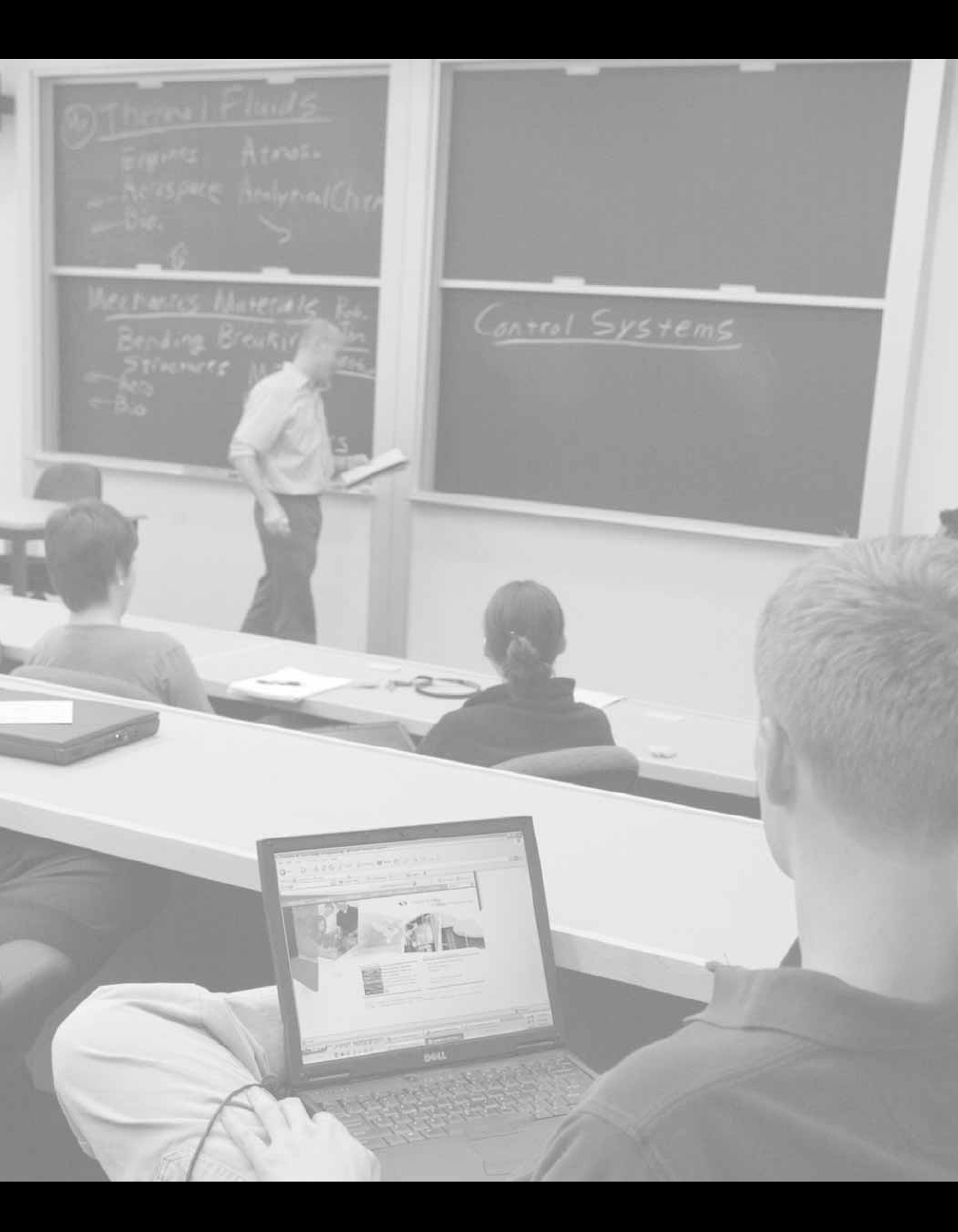
Admission, Expenses
and Need-Based Aid

74
CATALOG
FRANKLIN W. OLIN COLLEGE OF ENGINEERING
ADMISSION ■
Applying to Olin
Olin College will enroll approximately 75 top
students from all over the world for the class
of 2012. By traditional measures (course rigor,
test results and achievement) the quality of stu-
dents we seek will be outstanding; however,
we place equal importance on personal charac-
ter, creativity, risk-taking, unusual life experi-
ences and an entrepreneurial spirit.
Specifically, we are looking for:
• Exceptional academic ability and perform-
ance, especially in math and science;
• Strong written and oral communication
skills;
• Excellence in and dedication to co-curricu-
lar and extracurricular activities;
• Evidence of leadership and collaboration;
• Understanding of Olin College’s mission;
• Adventurous and entrepreneurial spirit;
• Energy, commitment to high standards,
perseverance and a sense of humor.
Olin College strives for gender balance and a
student body that is multidimensional, repre-
senting a broad range of cultural, economic
and geographic backgrounds. Olin College is
now approved by the INS to issue I-20 forms
(student visas) and seeks a multicultural pres-
ence on campus by enrolling international
students and those with significant internation-
al experience. US Permanent Residents and
Greencard holders are also eligible for admis-
sion. The application process and timeline are
the same for all applicants, regardless of their
residency status.
The Olin Application
The Olin College Application for Admission is
available exclusively online. A PDF version of
the application and required forms are also
available on our website,
www.olin.edu
, but
applicants are strongly encouraged to com-
plete the application online. There is no Early
Action or Early Decision.
Admission Process
The Application for Admission consists of
seven parts.
1. Basic biographical information
2. Application fee ($70 U.S./$80 International)
and signed Affidavit
3. Secondary school report (returned by your
counselor with official transcripts, current
senior grades and a high school profile)
4. Two teacher recommendations — one from
a core math or science teacher and one
from a teacher of your choice
5. Results of the SAT or ACT with Writing, plus
two SAT Subject Tests (Math Level 1 or 2
and a science exam of your choice). Our
SAT code is 2824; the ACT code is 1883.
6. Two essays — one 500 words and the other
300 words
7. Personal résumé of activities, honors,
awards, employment, etc.
After applications have been reviewed, approx-
imately 180 top applicants will be selected to
attend one of our two “Candidates’ Weekends”
in late February and early March. During these
weekends Candidates will participate in group
design exercises, interviews and informal dis-
cussions with Olin faculty and students. It is
from this group of Candidates that we will
select the incoming class.

Application Timetable
2007–08
December 1, 2007
Deadline for submitting application and
supporting materials
December 2007
All standardized testing must be completed
Early February 2008
Applicants notified if they have achieved
“Candidate” status
February 29–March 1, 2008
Candidates’ Weekend #1
March 7–8, 2008
Candidates’ Weekend #2
Late March 2008
Notification letters are mailed
May 1, 2008
National Candidates‘ Reply Date
Admission Visits and
Tours
Tours and information sessions are available
by appointment only. Please go to our
website at
http://www.olin.edu/admission/
visits_tours.asp
to schedule your visit.
Day and Overnight Visits
Day visits allow prospective students to attend
a class, meet current students and faculty, and
enjoy a meal in our Dining Hall. Class visits in
the fall are scheduled by appointment on
Mondays through Thursdays.
Overnight visits for high school seniors may be
scheduled on Sunday through Thursday nights
from early-to-mid fall. Space is limited, so
please schedule your visit well in advance by
emailing
. In the spring,
overnight visits are limited to admitted stu-
dents.
Office of Admission Hours
Monday through Friday: 9:00 a.m.–5:00 p.m.
Saturdays in the fall: 9:00 a.m.–12:00 p.m.
Please see the
Directions/Visiting
page on our
website for information about transportation,
lodging and dining in the area.
CATALOG
75
FRANKLIN W. OLIN COLLEGE OF ENGINEERING
■ ADMISSION

Costs and Aid
Scholarship Policy
Olin’s generous scholarship policy stems from
one of the founding principles of the college —
to provide a world-class engineering education
at a significantly reduced cost to students and
their families. All admitted students who enroll
at Olin College receive an Olin Scholarship
covering tuition during the four years of the
baccalaureate program. This scholarship is
currently valued at over $134,000.
Estimated Cost: Academic Year 2007–08
Below are estimated costs for the upcoming
academic year. We expect nominal increases in
these figures for subsequent years.
Billed Expenses
Tuition $33,600 (covered by
scholarship)
Room $7,800
Meal Plan $4,000 (Blue Plan)
(choose plan)
$3,750 (Silver Plan)
Laptop $1,250 (1
st
two of four
Purchase payments)
Health Insurance $682 (if needed)
Student Activity $175
Fee
Unbilled Expenses
Books & Supplies $750 (estimate)
Travel & $1,500 (estimate)
Incidentals
Cost of Attendance $49,757 (with Blue Meal Plan)
Olin Scholarship – 33,600
Balance $16,157
Need-Based Assistance
Olin College offers need-based financial assis-
tance in the form of federal, state and institu-
tional programs.
Families interested in applying for additional
assistance to meet costs in excess of the Olin
College Scholarship should complete the
FAFSA (Free Application for Federal Student
Aid) online. Olin’s institutional code is 039463.
For more information go to
http://www.fafsa.ed.gov/index.htm
An Example of Need-Based Aid
Eligibility for need-based aid is determined by
federal methodology, which calculates a fami-
ly’s ability to contribute. If the Expected Family
Contribution (EFC) is less than $12,657 then the
student is eligible for need-based aid from Olin
College and may also be eligible to receive fed-
eral funds as part of his or her total financial
aid package.
Cost of Attendance $49,757
Olin Scholarship –33,600
Net Cost $16,157
Summer Earnings –2,000
Campus Employment –1,500
Balance $12,657
–EFC
Unmet Need
Students and their families may also elect to
apply for educational loans to help cover a por-
tion or all of the EFC. Families who are interest-
ed in pursuing loans and/or a monthly tuition
management program are encouraged to con-
tact MEFA, the Massachusetts Educational
Financing Authority, at 1-800-449-MEFA.
Please direct any questions regarding need-
based assistance to our financial aid officer in
the Student Accounts and Records (StAR)
Center at 781-292-2340.
76
CATALOG
FRANKLIN W. OLIN COLLEGE OF ENGINEERING
COSTS AND AID ■

Outside Scholarship
Policy
All students are expected to pursue outside
merit scholarships (local, regional, and nation-
al). These scholarships bring distinction to
the student and to Olin. If the scholarship is
nonrestricted, the funds can be applied to
billed expenses including room, meal plan,
required laptop purchase and other educational
expenses. If the scholarship is restricted to
tuition only, it reduces the amount of the Olin
Scholarship accordingly. The total of all schol-
arships, grants, and self-help cannot exceed
the total Olin College student budget. Please
note that outside scholarships may affect the
amount of need-based assistance a student is
eligible to receive from Olin College.
National Merit/Achievement Finalists who
win either a National Merit or National
Achievement Scholarship from the National
Merit Scholarship Corporation or another cor-
porate sponsor are able to use this scholarship
at Olin College and will be identified as
National Merit/Achievement Scholars.
However, finalists who designate Olin College
as their first choice college but do not receive a
NMSC or corporate-sponsored scholarship will
remain National Merit Finalists, since Olin does
not currently sponsor National Merit or
National Achievement scholarships.
Olin Scholarship Policy
The Olin College tuition scholarship is for eight
consecutive semesters of full-time study.
Anyone permanently disqualified to attend or
return to Olin College for academic or discipli-
nary reasons will forfeit the remaining portion
of the scholarship. Study Away (which requires
pre-approval) or an internship for credit counts
as one of the eight scholarship semesters; the
student is expected to pay for costs associated
with any such activity, including host institution
tuition and fees (if required). For mid-semester
leaves of absence, the partial semester counts
as one of the eight scholarship semesters; pay-
ment of tuition is required for any semester(s)
beyond eight before graduation. For end-of-
semester leaves of absence, the semester on
leave does not count as one of the eight schol-
arship semesters (unless the student requests
transfer credit for this semester). Olin College
provides accommodations for documented dis-
abilities. In extenuating circumstances, excep-
tions may be granted by the Vice President for
Academic Affairs.
CATALOG
77
FRANKLIN W. OLIN COLLEGE OF ENGINEERING
■ COSTS AND AID

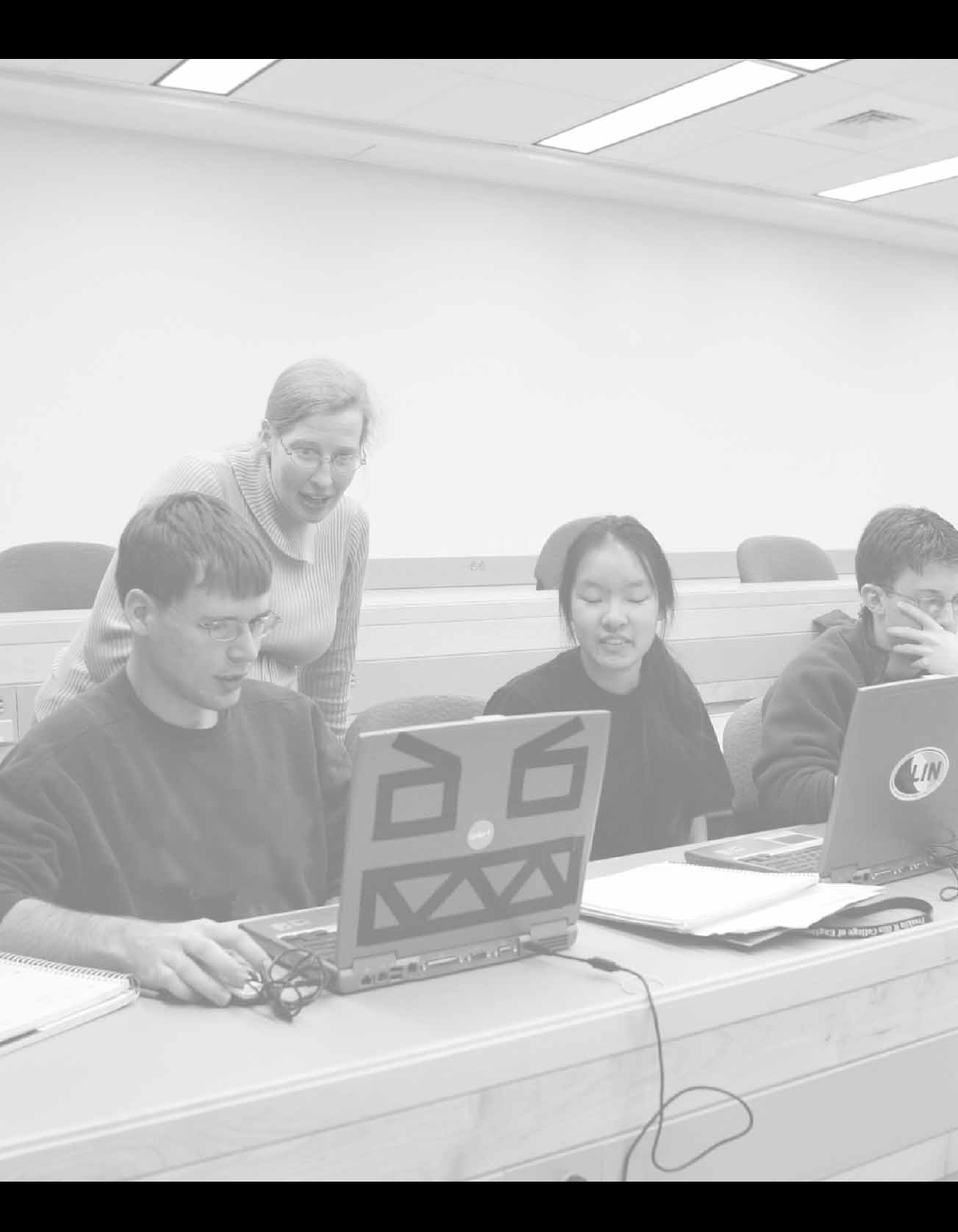
Faculty, Instructors,
and Consultants

Faculty Profiles
Sarah Spence Adams, Ph.D.
Associate Professor of Mathematics
Dr. Adams maintains an active research pro-
gram that focuses on increasing the reliability
and efficiency of wireless communications.
She earned her Ph.D. and M.S. in mathematics
at Cornell University, where she was also a
member of the Wireless Intelligent Systems
Laboratory in the Department of Electrical
and Computer Engineering. She holds a B.S.
(summa cum laude) in mathematics from
the University of Richmond. Dr. Adams has
conducted research at the National Security
Agency (NSA), the Institute for Defense
Analyses, Center for Communications
Research, and the NATO Advanced Study
Institute. Recently, she wrote a book on alge-
braic coding theory that is used to introduce
applications to abstract algebra classes. She
is an ExxonMobil Fellow in the Mathematical
Association of America’s (MAA) Project NExT
and serves on MAA national committees
involving undergraduate programs/research.
Dr. Adams recently received an NSA Young
Investigator’s Grant to support her research
in space-time coding, an NSF grant to engage
undergraduates in long-term research experi-
ences, and an NSF grant to develop a new,
multi-faceted coding theory and cryptology
course.
David Barrett, Ph.D.
Associate Professor of Mechanical Engineering
and Design and Director of SCOPE
Dr. Barrett teaches Mechanical Engineering
and Robotics at Olin. His research laboratory at
Olin works in the area of unmanned robotic
vehicles. Prior to joining the Olin faculty, Dr.
Barrett was vice president of engineering at
iRobot Corporation, where he was responsible
for identifying new business opportunities,
establishing strategic partnerships, directing
project teams and developing a wide range of
robotic systems. Before iRobot, Dr. Barrett was
a director at the Walt Disney Imagineering
Corporation. In addition to his many published
articles, Dr. Barrett holds eight patents with
previous colleagues on a variety of robotic
systems. He is a member of numerous profes-
sional societies including IEEE Robotics and
Automation, Vehicular Technology, and Ocean
Engineering Societies. Dr. Barrett received his
Ph.D. and M.S. in ocean engineering and M.S.
in mechanical engineering, all from MIT and a
B.S. in mechanical engineering from the
University of Lowell.
Brian Bingham, Ph.D.
Assistant Professor of Mechanical Engineering
Dr. Brian Bingham is an Assistant Professor of
Mechanical Engineering at Olin College. He is
also a Guest Investigator at the Woods Hole
Oceanographic Institution Deep Submergence
Laboratory (WHOI-DSL). Dr. Bingham’s
research focuses on increasing the scientific
capabilities of underwater robots, specifically
how they navigate in the deep ocean. Based
on a background in dynamics and control sys-
tems, he works on hardware (instruments) and
software (algorithms) for improving the preci-
sion and the robustness of underwater robot
navigation. Currently, Dr. Bingham is working
on bringing together chemical sensing and
real-time localization so that future
autonomous underwater vehicles (AUVs) can
make decisions based on their environment.
Dr. Bingham has participated in recent expedi-
tions collecting vent snails in the Lau Basin
(South Pacific), measuring heat-flux of
hydrothermal vents at the Juan de Fuca Ridge
(off the Seattle coast), mapping the Mid-
Atlantic Ridge and surveying ancient ship-
wrecks in the Cyclades islands and in the
Black Sea. Dr. Bingham holds Ph.D. and S.M.
degrees from MIT and a B.S. from the
University of Missouri-Rolla — all in mechani-
cal engineering.
80
CATALOG
FRANKLIN W. OLIN COLLEGE OF ENGINEERING
FACULTY PROFILES ■

CATALOG
81
FRANKLIN W. OLIN COLLEGE OF ENGINEERING
■ FACULTY PROFILES
John R. Bourne, Ph.D.
Professor of Electrical and Computer
Engineering, Professor of Technology
Entrepreneurship (Babson College) and
Director of the Sloan Center for Online
Education at Olin and Babson Colleges
An expert in online learning, Dr. Bourne joined
Olin from Vanderbilt University in 2000, where
he was professor of electrical and computer
engineering and professor of biomedical engi-
neering. At Vanderbilt he pioneered an innova-
tive learning methodology, the asynchronous
learning network (ALN). He headed Vanderbilt’s
Center for Innovation in Engineering Education
and the ALN Center. He established the
ALN Web in 1996 and launched the Sloan
Consortium, a group of over 1000 institutions
supported by the Alfred P. Sloan Foundation.
He currently serves as Executive Director of the
Sloan Consortium. Dr. Bourne recently received
the Education Activities Board Meritorious
Achievement Award in Continuing Education
from the IEEE. He received the Sloan
Consortium 2001 Award for “Most Outstanding
Achievement in ALN by an individual.”
Dr. Bourne received his Ph.D. in electrical
engineering from the University of Florida.
He is a Fellow of the IEEE and the American
Institute of Medical and Biological Engineers.
He is founder and editor-in-chief of the
Journal
of Asynchronous Learning Networks
and was
editor-in-chief of
Critical Reviews in Biomedical
Engineering
until 2006.
Debbie Chachra, Ph.D.
Assistant Professor of Materials Science
Dr. Chachra’s current research focuses on natu-
ral materials. Much of her research is on bone,
including investigating the effect of therapies
for osteoporosis on its mineralization and the
mechanical properties. She also investigates
other biological materials, such as the poly-
ester nest cell linings of
Colletes
bees. In addi-
tion to her scientific research, she is involved
in a research study looking at some issues
relating to engineering education, including
understanding why students leave engineering
school, and her particular focus is on diversity
and educational outcomes for first- and sec-
ond-generation immigrants. Prior to joining the
faculty of Olin College, Dr. Chachra was a post-
doctoral associate at MIT in the Department of
Materials Science and Engineering. She joined
MIT from the University of Toronto, where she
received her master’s degree and Ph.D. in
materials science. Dr. Chachra has a bachelor’s
degree in engineering science, also from the
University of Toronto. She was a recipient of a
National Sciences and Engineering Research
Council of Canada postdoctoral fellowship
and a Medical Research Council of Canada
graduate fellowship, as well as numerous other
academic honors.
Mark L. Chang, Ph.D.
Assistant Professor of Electrical and Computer
Engineering
Dr. Chang received his Ph.D. in electrical engi-
neering from the University of Washington.
He received his M.S. in electrical and computer
engineering from Northwestern University
and his B.S. from Johns Hopkins University.
During his studies Dr. Chang earned an Intel
Foundation Graduate Fellowship. Dr. Chang
has conducted research in developing comput-
er-aided design tools and methodologies for
easier implementation of arithmetic hardware
onto FPGA devices. His research interests
include FPGA arithmetic and architecture,
computer-aided design tools, reconfigurable
computing and VLSI design.
Rebecca Christianson, Ph.D.
Assistant Professor of Applied Physics
Originally from Minnesota, Dr. Christianson
joined the Olin College faculty after completing
a postdoctoral fellowship at Harvard University.
Her research includes confocal microscopy
studies of colloidal suspensions and thermal
transport measurements of nanofluids. Dr.
Christianson received her Ph.D. from MIT and
her B.S. in physics and B.A. in music (perform-
ance concentration) both from Stanford
University. When not doing physics, playing
her oboe or singing, she prefers to be outside
hiking, canoeing, biking or playing with her
kids.

Diana Dabby, Ph.D.
Associate Professor of Electrical Engineering
and Music
Dr. Dabby has taught at MIT, Tufts University
and Juilliard. She received her Ph.D. and M.S.
degrees in electrical engineering and computer
science from MIT and a B.S. in electrical engi-
neering from City College of New York. In addi-
tion, she holds an M.F.A. in music from Mills
College as well as a B.A. in music from Vassar
College. While at MIT, Dr. Dabby combined
music and engineering in her application of
chaos theory to musical variation. She has
given a number of concert/lectures on her work
sponsored by the National Association of
Schools of Music, MIT, Princeton, Cornell,
Dartmouth, IEEE, FIRST Place of New
Hampshire, New Horizons in Science, and
Harvard. She has been heard on NPR member
station WBUR-FM as well as at the Siemens
Foundation “Beautiful Minds, Beautiful Music”
Symposium at Carnegie Hall. As a concert
pianist, Dr. Dabby has performed solo concerts
in New York’s Weill (Carnegie) Recital Hall,
Merkin Concert Hall and at venues in Budapest
and Hong Kong, among others. As a chamber
musician, and as a composer, she has per-
formed at Boston’s Jordan Hall, Symphony Hall
and at Tanglewood. Her latest work, September
Quartet, a 5-movement work scored for voices,
winds, brass, percussion, violin and piano, was
commissioned to commemorate the 150th
anniversary of the founding of Tufts University.
Helen Donis-Keller, Ph.D.
Professor of Biology and Art
Dr. Donis-Keller was previously at the
Washington University School of Medicine,
where she was a professor of surgery and
director of the Division of Human Molecular
Genetics. She has also held leadership posi-
tions in the biotechnology industry, where she
led a group that developed the first genetic
linkage map of the human genome. Dr. Donis-
Keller holds an M.F.A. in studio art from the
School of the Museum of Fine Arts in Boston
and Tufts University and a Ph.D. in molecular
biology and biochemistry from Harvard
University. She also received an Honorary
Doctor of Science from Lakehead University.
Dr. Donis-Keller enjoys combining her interests
in art and science. Her “scientific” artwork is
featured in exhibits across the nation.
Allen Downey, Ph.D.
Associate Professor of Computer Science
Before coming to Olin, Dr. Downey taught at
Colby College and Wellesley College and
held research positions at the San Diego
Supercomputer Center and Boston University.
His research is based on the application of the
tools of empirical science to computer systems
and networks. Dr. Downey is the author of
several textbooks, including three versions of
How to Think Like a Computer Scientist,
an
introduction to computer science using Java,
C++ or Python. He received his Ph.D. in com-
puter science from University of California,
Berkeley. His B.S. and M.S. degrees are from
MIT in civil engineering.
Ozgur Eris, Ph.D.
Assistant Professor of Design and Mechanical
Engineering
Dr. Eris joined Olin from Stanford University,
where he was the associate research director
of the Center for Design Research. His current
research is in design cognition and information
systems. He has authored several award win-
ning NSF and NASA research proposals, and a
recent book on the question-asking processes
of design teams. Professionally, he has
designed systems ranging from a pneumatic
sample delivery machine to a railroad control
center. He earned a B.S. (cum laude) from the
University of Washington in mechanical engi-
neering, and M.S. and Ph.D. degrees from
Stanford University in mechanical engineering
design.
John Geddes, Ph.D.
Associate Professor of Mathematics
Prior to joining the Olin faculty, Dr. Geddes was
an assistant professor of mathematics at the
University of New Hampshire, where he
worked on laser-based chaotic communication
82
CATALOG
FRANKLIN W. OLIN COLLEGE OF ENGINEERING
FACULTY PROFILES ■

schemes and pulse dynamics in mode-locked
lasers. He currently receives funding from the
NIH for a project on the mathematics of
microvascular blood flow. Dr. Geddes graduat-
ed from Heriot-Watt University, Edinburgh,
Scotland with a B.Sc. in physics. He received
his Ph.D. in applied mathematics from the
University of Arizona.
Stephen S. Holt, Ph.D.
Professor of Physics and Babson College
Director of Science
The former Director of Space Sciences at the
NASA-Goddard Space Flight Center, Dr. Holt
is a leader in the field of high energy astro-
physics. He was the NASA project scientist on
eight NASA missions, including cooperative
scientific missions with the UK, Germany,
Japan and Russia; he was also the founding
Chief Scientist for NASA’s Space Station
Program. Dr. Holt’s many accolades
include NASA’s highest civilian honor, the
Distinguished Service Medal. Since coming to
Olin, he has received COSPAR’s International
Scientific Cooperation Medal and has been
elected to fellowship in the International
Academy of Astronautics. He has chaired the
Astrophysics Divisions of the American
Physical Society, the American Astronomical
Society, and COSPAR. His research focuses on
the detection and analysis of X-ray emission
from supernovae and black holes. Dr. Holt
received a B.S. degree with honors in engineer-
ing physics and a Ph.D. in physics from New
York University.
David V. Kerns, Jr., Ph.D., P.E.
Franklin and Mary Olin Distinguished Professor
of Electrical and Computer Engineering and
Babson College Professor of Technology
Entrepreneurship
Dr. David Kerns was the Founding Provost and
Chief Academic Officer of Olin College from
1999 to 2007. Prior to coming to Olin College,
he held the Orrin Henry Ingram Distinguished
Professorship in the Department of Electrical
Engineering at Vanderbilt University, where he
also chaired the Department, directed the
Management of Technology Program, and
served as the chief academic officer of the
School of Engineering. He is the past-president
of the IEEE Education Society, a Fellow of the
IEEE, author of numerous technical papers, and
holder of over ten patents. His research inter-
ests include entrepreneurship and intellectual
property, MEMS devices, analog circuit design
and innovation in engineering education. A
recipient of the IEEE Millennium Award, he has
also founded several successful technology
enterprises. Acclaimed for outstanding scholar-
ship and teaching, he is the co-author of two
successful textbooks: I
ntroduction to Electrical
Engineering
and
Essentials of Electrical and
Computer Engineering
. He received his B.S.,
M.S., and Ph.D. degrees from Florida State
University.
Sherra E. Kerns, Ph.D.
F. W. Olin Professor of Electrical and Computer
Engineering
Dr. Sherra Kerns is a national leader in engi-
neering education. She served as Olin’s found-
ing Vice President for Innovation and Research
from 1999 to 2007. She currently serves on the
Board of Directors of the Accreditation Board
for Engineering and Technology (ABET) and is
a past ABET Commissioner and Executive
Committee Member. Dr. Kerns also served as
110th president of the American Society for
Engineering Education (ASEE); on the NAE
Engineering 2020 Committee; and has played a
number of leadership roles in FIRST (For
Inspiration and Recognition of Technology). A
researcher in microelectronics, Dr. Kerns has
authored more than 100 published technical
journal papers and made seminal contributions
to enhancing information integrity of digital
microelectronics in space and other extreme
environments. A Fellow of the IEEE for her
technical achievements and of ASEE for her
educational contributions, Dr. Kerns is also the
recipient of the Harriet B. Rigas Outstanding
Woman Engineering Educator Award and the
IEEE Millennium Medal, among other honors.
Dr. Kerns previously served as Director of the
multi-institutional, multi-disciplinary University
Consortium for Research on Electronics in
Space (UCRES) and was chair of the
Department of Electrical and Computer
CATALOG
83
FRANKLIN W. OLIN COLLEGE OF ENGINEERING
■ FACULTY PROFILES

Engineering at Vanderbilt University. She is
also the former President of the National
Electrical Engineering Department Heads
Association. She received her A.B. from Mount
Holyoke College, M.A. from the University of
Wisconsin and Ph.D. from the University of
North Carolina, all in physics.
Christopher Lee, Ph.D
Assistant Professor of Mechanical Engineering
Prior to joining the Olin College faculty, Dr. Lee
was a lead engineer in the New Technologies
Engineering Division at the Lawrence
Livermore National Laboratory. He was respon-
sible for supporting lab programs through
computational analysis and vibration measure-
ments. His projects ranged from buildings
(vibration signature based system identifica-
tion) to micro-devices (portable bio-pathogen
and chemical detectors, accelerometers,
adaptive optics arrays) to medical systems
(catheter-based device for the treatment of
cerebral aneurysms, retinal prosthesis, novel
breast cancer imaging system). He has co-
patented a carbon-nanotube based acoustic
sensor. His current areas of research focus on
stochastic system identification for structural
damage detection, nonlinear dynamics, and
the mechanics of DNA. Dr. Lee has a B.S.E.
degree in mechanical engineering from Cornell
University. He has M.S.E. degrees in both
mechanical and aerospace engineering and a
Ph.D. degree in mechanical engineering from
the University of Michigan.
Benjamin Linder, Ph.D.
Assistant Professor of Design and Mechanical
Engineering
Dr. Linder is a designer and researcher whose
interests include sustainable design, creative
design methods and design education. He is
also actively involved in entrepreneurship
including a social venture. Dr. Linder received a
B.S.E. in mechanical engineering and a B.S.E.
in electrical engineering from the University of
Michigan where he studied engineering design.
He received his M.S. and Ph.D. in mechanical
engineering from MIT where he studied prod-
uct design and design education.
Caitrin Lynch, Ph.D.
Assistant Professor of Humanities and Social
Sciences
Dr. Lynch received her Ph.D. and M.A. in cultur-
al anthropology from the University of Chicago
and her B.A. in anthropology from Bates
College. She is the author of a book entitled
Juki Girls, Good Girls: Gender and Cultural
Politics in Sri Lanka’s Global Garment Industry
(Cornell University Press). Prior to joining the
Olin faculty, Dr. Lynch was an assistant profes-
sor of anthropology at Drew University.
Additional professional experience includes
several fellowships, including a Mellon
Postdoctoral Fellowship at Johns Hopkins
University. Her research interests include gen-
der, labor, nationalism globalization, and aging;
her areas of focus are South Asia (specifically,
postcolonial Sri Lanka) and the United States.
Robert Martello, Ph.D.
Associate Professor of the History of Science
and Technology
Prior to joining Olin, Dr. Martello was a
lecturer at MIT and was the digital history
annotations and features producer for the
Sloan Foundation’s American history textbook,
Inventing America
, published by W.W. Norton
in 2003. He was also active as an environmen-
tal consultant. His primary research interests
include the interdisciplinary examination of his-
torical narratives from technological, environ-
mental and entrepreneurial perspectives. Dr.
Martello’s current research uses Paul Revere’s
career to tell the story of America’s progress
through simultaneous political and industrial
revolutions, and he has offered public lectures
on these topics at various Boston-area institu-
tions. Dr. Martello received his Ph.D. from
MIT’s program in the History and Social Study
of Science and Technology. He received an
M.S. degree from MIT’s Department of Civil
and Environmental Engineering and a B.S.
degree from MIT in the field of earth, atmos-
pheric and planetary science.
84
CATALOG
FRANKLIN W. OLIN COLLEGE OF ENGINEERING
FACULTY PROFILES ■

Richard K. Miller, Ph.D.
President and Professor of Mechanical
Engineering
As Dean of the College of Engineering at the
University of Iowa, where he served before
joining Olin, Dr. Miller created the nation’s first
Technological Entrepreneurship Certificate
Program for engineers. His research interests
include structural dynamics and nonlinear
mechanics. He is the author or co-author of 100
reviewed journal articles and other technical
publications. Other interests include innovation
in undergraduate education and entrepreneur-
ship. Dr. Miller has won five teaching awards at
two universities. He earned his B.S. degree in
aerospace engineering from the University of
California, Davis. He earned his M.S. degree in
mechanical engineering from MIT, and his
Ph.D. in applied mechanics from the California
Institute of Technology.
Bradley A. Minch, Ph.D.
Associate Professor of Electrical and Computer
Engineering
Prior to joining the Olin College faculty, Dr.
Minch was an assistant professor at Cornell
University in the School of Electrical and
Computer Engineering. During his time at
Cornell, he was the recipient of three teaching
awards and one freshman advising award.
In 2000 he received an Early CAREER Award
from the NSF. Dr. Minch’s research interests
are in the areas of analog and mixed-signal
integrated circuit design. Dr. Minch received
his Ph.D. from the Computation and Neural
Systems program at the California Institute of
Technology, where he worked in the laboratory
of Professor Carver Mead. He received his B.S.
in electrical engineering from Cornell
University.
Michael Moody, Ph.D.
Vice President for Academic Affairs, Dean of
Faculty and F.W. Olin Professor of Mathematics
Dr. Moody joined Olin College from Harvey
Mudd College, an engineering-focused mem-
ber of the Claremont colleges in California. At
Harvey Mudd, Dr. Moody was the Diana and
Kenneth Jonsson professor of Mathematics
and chair of the mathematics department.
While there, he played a major role in a com-
prehensive curriculum design effort and built
the mathematics department into one of the
finest in the country. Dr. Moody received his
B.A. degree from the University of California
at San Diego in 1975, and completed a Ph.D.
in applied mathematics at the University of
Chicago in 1979. In 1981 he joined the faculty
at Washington State University. His appoint-
ment at Harvey Mudd began in 1994. Dr.
Moody’s research in biomathematics focuses
on genetic models for evolving populations.
His developmental work in teaching is concen-
trated on designing and implementing curricu-
lar models and technological tools to improve
mathematics education for engineers and sci-
entists. At Olin, he is responsible for creating a
strong academic and administrative infrastruc-
ture to advance the college’s unique education-
al mission.
Christopher Morse, Ph.D.
Visiting Assistant Professor of Chemistry
Before coming to Olin College, Dr. Morse was
a faculty member in the chemistry department
at Tufts University where his courses covered
both graduate and undergraduate curricula.
At Tufts he served as the Graduate Training
Coordinator, with the responsibility for the
pedagogical training of the graduate students,
especially those interested in careers in acade-
mia. He also successfully ran the Summer
Institute on College Teaching for seven years,
a program that trained graduate students in
educational skills, and then paired them with
veteran faculty members to co-teach courses.
Before Tufts, Dr. Morse was at MIT where he
received his doctoral degree in inorganic
chemistry in the lab of Alan Davison as a
National Science Foundation Predoctoral
Fellow. While at MIT, he also served as the
chemistry liaison and taught chemistry
courses through the Experimental Study
Group. During his summers, Dr. Morse taught
chemistry for Project Interphase, which pre-
pared underrepresented minorities from rural
and urban areas for the rigors of first-year
courses. For this effort, he was awarded the
CATALOG
85
FRANKLIN W. OLIN COLLEGE OF ENGINEERING
■ FACULTY PROFILES

86
CATALOG
FRANKLIN W. OLIN COLLEGE OF ENGINEERING
FACULTY PROFILES ■
Goodwin Medal for excellence in teaching by
a graduate student. He also holds an A.B. from
Dartmouth College. At Olin, Dr. Morse teaches
courses in general and organic chemistry. He
is currently working on a textbook for a course
about art, art history and art preservation from
a chemical perspective. Dr. Morse remains
interested in pedagogy training and his current
focus is on using cooperative education to
teach critical thinking through chemistry and
the role of math skills for success in the sci-
ences.
José Oscar Mur-Miranda, Ph.D
Assistant Professor of Electrical and Computer
Engineering
Before coming to Olin, Dr. Mur-Miranda was an
associate professor of Electrical Engineering at
the Inter American University of Puerto Rico,
Bayamón Campus. Prior to that, he was a
research consultant in energy harvesting
systems at the Centre Nacional de
Microelectrònica in Barcelona, Spain. He
received his Ph.D. in electrical engineering and
computer science from MIT, with a dissertation
on electrostatic vibration-to-electric energy
conversion under Professor Jeffrey H. Lang.
He earned his B.S. and M.S. degrees from MIT,
both in electrical engineering. Dr. Mur-Miranda
has been actively involved in teaching since
1995 and has taught courses in electronic sys-
tems, electric circuits, electronic devices, com-
munications, control and signal processing,
and fields, forces and motion. He has also
taught physics to incoming freshmen in MIT’s
Interphase summer program. He served in the
Professional Education Policy Committee of the
Electrical Engineering and Computer Science
Department at MIT. Dr. Mur-Miranda is passion-
ate about the welfare of students both inside
and outside the classroom. His teaching style
has been recognized by his students and peers
as effective and engaging. Dr. Mur-Miranda has
designed and implemented industrial process
control and automation systems for various
pharmaceutical companies. His electrostatic
vibration energy harvester is the first published
design of its kind in the literature. His current
research interests lie in the areas of energy
harvesting and MEMS design, focusing on
electromechanic energy transduction. Dr.
Mur-Miranda is a proud Catalonian, born in
Barcelona, Spain, from a Puerto Rican mother
and a Spanish father from Aragón. He was
raised between Spain and Puerto Rico until he
became an “adopted” Bostonian in 1990.
Gill Pratt, Ph.D.
Professor of Electrical and Computer
Engineering
Dr. Pratt was previously an associate professor
of Electrical Engineering and Computer Science
at MIT. During his time at MIT, he was the
recipient of an award for excellence in teaching
and an NSF CAREER award. Dr. Pratt’s research
is in the area of robotics. He also has a strong
interest in early engineering education and the
societal aspects of technology. Dr Pratt
received his B.S., M.S., and Ph.D. in electrical
engineering and computer science from MIT.
His Ph.D. work was in the area of signal encod-
ing in the nervous system.
Joanne C. Pratt, Ph.D.
Associate Professor of Biological Sciences
Dr. Pratt joined Olin College from National
Jewish Medical Research Center (NJC) in
Denver, CO where she was an Instructor in the
Division of Cell Biology and the Department of
Pediatrics. Prior to her position at NJC, she was
an Instructor in Pediatrics at Dana-Farber
Cancer Institute and Harvard Medical School,
where she completed her postdoctoral training.
She also spent a year at Hôpital Saint-Louis in
Paris, France. As a principal investigator, she
has received grants from The Cancer League of
Colorado and The Association for International
Cancer Research to fund her research. She was
awarded a National Research Science Award
Individual Fellowship as well as a fellowship
from The Medical Foundation. Dr. Pratt’s
research interests are focused on the factors
that control the growth and functional pro-
grams of white blood cells. Her specific area of
expertise is in the role of adapter proteins in
the regulation of biochemical pathways that
translate extracellular signals into nuclear
events in T cells. This research is relevant to

CATALOG
87
FRANKLIN W. OLIN COLLEGE OF ENGINEERING
certain forms of cancer, such as leukemia and
lymphoma, as well as AIDS and autoimmune
diseases. Dr. Pratt holds a Ph.D. in immunology
from the University of Pennsylvania and an
A.B. in biology from Smith College.
Stephen Schiffman, Ph.D.
Associate Professor of Entrepreneurship at
Olin and Babson Colleges
Prior to joining the Olin faculty, Dr. Schiffman
was the dean of the Undergraduate Program at
Babson College and a senior partner at Olin
College. In his two years as a Senior Olin
Partner, Dr. Schiffman worked closely with the
faculty to develop and improve the Olin cur-
riculum. He has been a Babson faculty member
in Entrepreneurship, Mathematics and MIS
since 1986. He was the architect of Babson’s
revised undergraduate curriculum, which
launched in the fall of 1996. In 1997, the Pew
Charitable Trusts recognized this effort by
selecting Babson for a Pew Leadership Award
for renewal of undergraduate education. Dr.
Schiffman holds a Ph.D. in mathematics from
Dartmouth College as well as an M.S. in man-
agement from the Sloan School at MIT. He
has taught at the University of Colorado and
Colorado College. Prior to joining Babson, he
worked at Digital Equipment Corporation.
Christina Shea, M.F.A.
Visiting Writer
Ms. Shea is an independent writer, a novelist,
and author of
Moira’s Crossing
(Simon &
Schuster, 2000), which was a Barnes & Noble
Discover New Writers selection. She is also the
coauthor of numerous Frommer’s guides to
Hungary and is currently at work on her second
novel. She has been the recipient of a Bunting
Fellowship at Radcliffe College as well as a
Soros Foundation grant. In addition to her
work at Olin, she is a core faculty member in
the MFA program in Creative Writing at Lesley
University. She has been associated with Olin
since 2002, when she came aboard for two
years as writing consultant. In 2005, she
returned to teach a creative writing elective,
and since then has signed on to teach creative
writing to first years and to mentor independ-
ent study in writing. She received her B.A. from
Kenyon College and her M.F.A. from University
of Michigan.
Alisha Lilly Sieminski, Ph.D.
Assistant Professor of Bioengineering
Dr. Alisha Lilly Sieminski joined Olin after
being a Ruth L. Kirschstein National Research
Service Award post-doctoral fellow in the
Biological Engineering Division at MIT. She
holds a Ph.D. in bioengineering from the
University of Pennsylvania and a B.S. in
chemical engineering from MIT. Dr. Sieminski’s
research interests revolve around how cells
interact with and perceive their immediate
surroundings — with a focus on cell mechanics
and cell-biomaterial interactions. Since coming
to Olin, Dr. Sieminski has enjoyed developing
new bioengineering courses focused on trans-
port in biological systems, tissue engineering,
cell mechanics, and biological thermodynam-
ics.
Mark Somerville, Ph.D.
Associate Professor of Electrical Engineering
and Physics
Dr. Somerville joined Olin from Vassar College,
where he was assistant professor of physics.
He strongly believes in the educational value
of involving students in hands-on research and
in integrating communication skills into the
curriculum. His research focuses on the physics
of semiconductor devices. Dr. Somerville holds
M.S. and Ph.D. degrees in electrical engineer-
ing from MIT, as well as an M.A. in physics
from Oxford University. He earned a B.S. in
electrical engineering and a B.A. in english
from the University of Texas at Austin. He
was a Rhodes Scholar.
Lynn Andrea Stein, Ph.D.
Professor of Computer and Cognitive Science
Dr. Stein joined Olin from MIT, where she was
an associate professor of Computer Science
and directed a research group on interactive
intelligent computer systems. Dr. Stein’s pio-
neering approach to the teaching of computer
■ FACULTY PROFILES

science is based on this interactive model
rather than the traditional linear view of com-
putation. She studies ways to make computers
smarter and humans more effective. She has
built humanoid robots and intelligent rooms,
next-generation (semantic) web infrastructure
and philosophical theories. She is the recipient
of the NSF Young Investigator Award and
MIT’s Spira Teaching Award, and IEEE Senior
Member and a Fellow of the KISS Institute for
Practical Robotics. She has a B.S. (cum laude)
in computer science from Harvard and
Radcliffe Colleges and M.S. and Ph.D. degrees
in computer science from Brown University. In
the 2007–2008 academic year, Dr. Stein will be
on sabbatical leave at Harvard University’s
School of Engineering and Applied Sciences,
but she welcomes contact from the Olin com-
munity during this time.
Jonathan Stolk, Ph.D.
Associate Professor of Mechanical Engineering
and Materials Science
Dr. Stolk joined Olin College from Bucknell
University, where he was a visiting assistant
professor in the Chemical Engineering
Department. Dr. Stolk holds M.S. and Ph.D.
degrees in materials science and engineering
from the University of Texas at Austin and a
B.S. in mechanical engineering from the
University of Texas at Arlington. His materials
science research interests include the synthesis
of nanoscale metal alloys and electroactive
metal-polymer composites; and his work in
education includes the design and implementa-
tion of self-directed learning environments, and
investigations of the effects of disciplinary inte-
gration, student autonomy, and project-based
learning on student motivation and develop-
ment.
Brian D. Storey, Ph.D.
Associate Professor of Mechanical Engineering
Dr. Storey holds a Ph.D. from the University of
California, Berkeley, a M.S. from the University
of Illinois at Urbana-Champaign and a B.S.
from the University of Texas at Austin, all in
mechanical engineering. Dr. Storey’s research
interests are in the broad areas of fluid dynam-
ics and computational science, including appli-
cations such as geophysical flows, cavitation,
and microfluidics. Current research projects
involve electrokinetic and electrochemical
flows in microfluidic devices. Dr. Storey has
received NSF funding to support undergradu-
ate research at Olin.
Burt Tilley, Ph.D.
Professor of Mathematics
Dr. Tilley received a Ph.D. in applied mathemat-
ics from Northwestern University, a B.S. in
electrical engineering and a B.A. in modern
languages from the University of Lowell. Dr.
Tilley joined Olin College from the New Jersey
Institute of Technology. He was the recipient of
an NSF NATO postdoctoral research fellowship
at the Hydrodynamics Laboratory at the École
Polytechnique in France. Dr. Tilley’s general
research interests include the stability and
interfacial dynamics of thin film flows, the
dynamics of fluid systems in the presence of
large electric fields, mathematical modeling
and industrial applied mathematics. He is on
the organizing committee for the Mathematical
Problems in Industry Workshop, and is a mem-
ber of the editorial board of the Fields Institute
electronic research journal Math-in-Industry
Case Studies.
Jessica Townsend, Ph.D.
Assistant Professor of Mechanical Engineering
Before joining Olin, Dr. Townsend was a
research associate in the Department of
Aeronautics and Astronautics at MIT. She was
also a post-doctoral associate at the FAA/NASA
Center for Excellence for Aviation Noise and
Emissions Mitigation at MIT. Her doctoral work
was also done at MIT in the Gas Turbine
Laboratory where she developed, tested and
modeled evaporatively cooled turbine blades
for advanced aircraft engines. Prior to returning
to school for her doctorate, Dr. Townsend spent
three years in industry at Hamilton Sundstrand
Power Systems, a manufacturer of auxiliary
power units for commercial and military air-
craft. She was the recipient of the AIAA
Foundation Wilbur and Orville Wright and
88
CATALOG
FRANKLIN W. OLIN COLLEGE OF ENGINEERING
FACULTY PROFILES ■

CATALOG
89
FRANKLIN W. OLIN COLLEGE OF ENGINEERING
■ ACADEMIC PARTNERS
Gordon C. Oates Air breathing Propulsion
Awards. Dr. Townsend also received an
American Association of University Women
Engineering Dissertation Fellowship. Her
research interests include turbine blade cool-
ing, nanofluids, and thermal-fluid systems. She
received her M.S. in mechanical engineering
from the University of California, Davis and
B.S. in mechanical engineering from the
University of Massachusetts Amherst.
Raymond Yim, Ph.D.
Assistant Professor of Electrical and Computer
Engineering
Raymond Yim received his B.Eng. and M.Eng.
from McGill University in Canada, and Ph.D.
from Harvard University in 2006. He has previ-
ously worked at the High Capacity Transport
group in Nortel Networks, and at the Digital
Communications and Networking Group in
Mitsubishi Electric Research Laboratory
(MERL). His recent research has focused on
the design of distributed protocols that enable
cooperative communications, as well as distrib-
uted reverse-link rate control algorithms in IS-
856 CDMA systems. His broader research inter-
ests include cross-layer design for wireless net-
works, distributed control and resource alloca-
tion in ad-hoc and sensor networks, large-scale
networks, pricing and multi-user information
theory.
Yevgeniya V. Zastavker, Ph.D.
Associate Professor of Physics
Before joining Olin, Dr. Zastavker was a visiting
assistant professor of Physics at Wellesley
College where she taught physics and per-
formed biophysics research. Born and raised in
Kiev, Ukraine she came to the United States in
1990 having received two years of education
at the Kiev Pedagogical College and a degree
from one of Kiev’s schools of music. She grad-
uated from Yale University with a B.S. in
physics and holds a Ph.D. in biological physics
from MIT. Her current research interests are
twofold: Dr. Zastavker is investigating physico-
chemical properties of various biological and
synthetic self-assembling membranes that
have significant biomedical and industrial
applications; she also performs science and
engineering education research in collabora-
tion with colleagues from the Civil Rights
Project at Harvard University and TERC, Inc.
Dr. Zastavker recently represented the United
States at the IUPAP (International Union of
Pure and Applied Physics) First and Second
International Conferences on Women in
Physics. She continues to work on the issues of
women and minorities in science and engineer-
ing both through her research and active par-
ticipation in various professional societies. Dr.
Zastavker has received numerous outstanding
reviews for her teaching both at MIT and
Wellesley College.
Academic
Partners
Woodie Flowers, Ph.D.
Distinguished Olin Partner
Dr. Flowers is the Pappalardo professor of
Mechanical Engineering at MIT. He received a
B.S. from Louisiana Tech University and S.M.,
M.E. and Ph.D. degrees from MIT. His interests
include creative design processes, product
development systems, and innovations in edu-
cation. At MIT, he has received several honors
for extraordinary contributions to undergradu-
ate education including a MacVicar Faculty
Fellowship. Currently, Dr. Flowers is a director
of three companies and serves as National
Advisor for FIRST.
Joni Moody, J.D.
Senior Partner for Legal Studies
Ms. Moody’s practice is limited to criminal
defense (appellate only) and immigration law.
She serves on the appellate panel for the
Committee for Public Counsel Services, a state
supported agency that provides legal services
for indigent criminal defendants. She is admit-
ted to practice in Massachusetts, and before
the United States District Court, D. Mass., and

90
CATALOG
FRANKLIN W. OLIN COLLEGE OF ENGINEERING
the First Circuit. Memberships include the
American Immigration Lawyers Association,
the National Association of Criminal Defense
Lawyers, and the Federal Bar Association, as
well as Suffolk County Litigation Inns of Court.
Ms. Moody is a graduate of Roger Williams
University Law School in Rhode Island. Prior to
attending law school she was a graduate stu-
dent academic advisor for ten years. At Olin
she advises students who are considering a
career in law and assists them with the law
school admission process.
Janey Pratt, M.D.
Senior Olin Partner in Health Sciences
Dr. Pratt is a General Surgeon specializing
in bariatric and breast surgery at the
Massachusetts General Hospital (MGH). She
is the director of the nutrition support unit as
well as the associate director for surgical serv-
ices at the MGH Weight Center. She teaches
medical students from Harvard and is currently
an instructor in surgery at Harvard Medical
School. Dr. Pratt holds a B.A. degree from
Wellesley College in chemistry and an M.D.
from Tufts University School of Medicine.
Dr. Pratt advises Olin students interested in
pursuing health science post-graduate careers,
including M.D. and M.D./Ph.D. degrees. Using
her background in innovative medical technol-
ogy and surgery, Dr. Pratt is a resource for stu-
dents interested in medical technology. She is
also involved in an advising family at Olin and
assists classes when medical topics arise. She
teaches all incoming freshmen a course in first
aid for engineers and also with the help of stu-
dent instructors trains all incoming freshmen
to use an AED and do CPR. She works closely
with Professor Gill Pratt in advising medically
related SCOPE projects.
Mark Rice, Ph.D.
Professor of Technology Entrepreneurship
Mark P. Rice is the Murata Dean of F. W. Olin
Graduate School of Business and the Jeffry A.
Timmons Professor of Entrepreneurial Studies
at Babson College. He is also professor of
Technology Entrepreneurship at Olin. Dr. Rice
is co-author of
Radical Innovation: How Mature
Companies Can Outsmart Upstarts
, which was
published by Harvard Business School Press.
His research on corporate innovation and
entrepreneurship has been published widely —
in academic and practitioner journals including
Organization Science, R&D Management,
Journal of Marketing Theory and Practice,
IEEE Engineering Management Review,
Academy of Management Executive, and
California Management Review. Dr. Rice con-
sults and teaches in the areas of innovation
management, entrepreneurship, technology
strategy, and new business incubation. Dean
Rice previously served as director of the
nationally recognized Rensselaer Polytechnic
Institute (RPI) Incubator Program and as co-
founder and director of the Severino Center for
Technological Entrepreneurship at RPI. He has
been a director and chairman of the National
Business Incubation Association, which hon-
ored him in 1998 with its Founder’s Award.
With Dr. Jana Matthews, he co-authored
Growing New Ventures — Creating New Jobs:
Principles and Practices of Successful Business
Incubation
. Before returning to academia, Dean
Rice was an investment broker and the director
of mergers and acquisitions for a business bro-
kerage firm. In the late 1970s and early 1980s,
Dr. Rice was co-founder and President of
Power Kinetics, Inc., a solar energy R&D
and manufacturing company. In 2002 Rice
received the Edwin M. and Gloria W. Appel
Entrepreneurship in Education Prize. Dr. Rice
holds B.S. and M.S. degrees in mechanical
engineering and a Ph.D. in management from
Rensselaer Polytechnic Institute.
ACADEMIC PARTNERS ■

Instructors,
Academic Visitors
and Technical
Staff
David Anderson
Master Instructor of Mechanical Design and
Fabrication
Prior to joining Olin, Mr. Anderson was an
optomechanical engineer with Network
Photonics, a start-up company developing all-
optical switches for Dense Wavelength Division
Multiplexing (DWDM) Networks. He was a
founding employee and played an instrumental
role in engineering the product from initial con-
cept to production. Mr. Anderson’s areas of
interest and expertise include design, analysis
manufacturing and testing of precision
mechanical systems. He frequently contributes
software reviews to mechanical engineering
trade journals. While at Olin, he has designed
and developed a number of prototypes includ-
ing an underwater device for freeing whales
from lobster trap buoy line entanglement, ini-
tial concept robot prototypes, optical sensing
devices and structures for marine applications.
He received his B.S. in mechanical engineering
from the University of Colorado at Boulder.
Bruce Andruskiewicz
Instructor of Machining
Before joining Olin College, Mr. Andruskiewicz
worked in industry at Packard Machinery,
where he served as service manager and
applications engineer. In this role he was
responsible for providing technical support
and customer training, as well as servicing and
installing machinery, including CNC machining
centers, turning centers, manual mills, lathes,
and support equipment. Mr. Andruskiewicz is
a Class A machinist who has held industry
positions for over twenty five years with com-
panies such as Laurel Brooke, Inc., Minuteman
Labs, McPherson, Inc. and Tech-Ridge. He is a
graduate of the University of Massachusetts
Amherst.
Sadie Aznavoorian-Cheshire, Ph.D.
Biology Laboratory Specialist
Dr. Aznavoorian-Cheshire’s primary research
interests are in the mechanisms of tumor cell
invasion and metastasis, with an emphasis on
extracellular matrix (ECM)-mediated regulation
of tumor cell migration and protease produc-
tion. Dr. Aznavoorian-Cheshire received her
Ph.D. in microbiology from Boston University
Graduate School of Medical and Dental
Sciences, where she examined the interactions
of carcinoma cells with basement membrane
proteins. She pursued post-doctoral studies at
the National Institutes of Health, Laboratory of
Pathology, examining the stimulated migration
of melanoma cells by host-derived factors and
its possible role in promoting invasion of the
basement membrane barrier separating epithe-
lium from interstitial tissue. As a Staff Scientist
at the University of Alabama at Birmingham,
Dr. Aznavoorian-Cheshire studied the matrix
metalloproteinase-mediated degradation of
interstitial type I collagen by oral squamous
carcinoma cells, and its regulation by the
binding of b1 integrins to collagen. This was
followed by a Research Assistant Professor
position in the Department of Cancer Biology
at UMass Medical School where Dr.
Aznavoorian-Cheshire’s studies focused on reg-
ulation of growth and motility of prostate carci-
noma cells by integrins of distinct subclasses.
Aaron Boxer
Visiting Engineer
In addition to his appointment at Olin, Mr.
Boxer is a Consulting Engineer at Millogic
Corporation. He has been designing digital
electronics for over 30 years at a number
of companies including Digital Equipment
Corporation, 3COM and AMCC. He has also
been involved in five high-tech startup efforts.
Mr. Boxer’s engineering accomplishments
include the first single-board floating point
array processor, one of the early cache-
CATALOG
91
FRANKLIN W. OLIN COLLEGE OF ENGINEERING
■ INSTRUCTORS AND CONSULTANTS

coherent distributed memory multiprocessors,
one of the first Gigabit Ethernet switches and
several digital design patents. His work has
also been published in IEEE Spectrum and sev-
eral engineering trade journals. Mr. Boxer’s
engineering interests include the problems of
design and verification that confront large
chip design projects. His educational interests
include helping students learn how to be suc-
cessful engineers in both large companies and
small startups. He also hopes to help students
see how much fun engineering can be. Mr.
Boxer holds a B.S. and an M.E. in biomedical
engineering from Rensselaer Polytechnic
Institute.
Lucy E. Dunne, Ph.D.
Visiting Assistant Professor of Engineering
Design
Dr. Dunne’s research lies in the interdisciplinary
field of wearable technology design, which
bridges such disparate fields as fashion design,
electrical engineering, computer science,
ergonomics, and textile engineering. She
received her Ph.D. in computer science from
University College Dublin, and her M.A. and
B.S. (hons) degrees in apparel design from
Cornell University. She also holds an A.A.S
degree in electronic technology. Dr. Dunne
has worked and researched in fashion design,
soldier systems, biomedical technology, and
smart clothing. Her current research (while
generally eclectic) focuses on bio-monitoring
through body-garment interactions, and on
the design of truly wearable technology. This
includes the social, psychological, and physical
aspects of worn objects and body adornment,
as well as the optimization of sensing tech-
niques for the noisy, imprecise environment
of wearable technology.
Gillian Epstein, Ph.D.
Consultant in Writing
Prior to joining Olin College, Dr. Epstein was a
senior consultant and instructor for FreshPond
Education, a professional development compa-
ny. While at FreshPond Education, she devel-
oped and led team-driven development pro-
grams that trained participants to create chal-
lenging curriculum projects in the humanities,
implement a vigorous peer review process and
use online publishing tools to share curriculum
research and lesson development. Prior to her
position with FreshPond Education, Dr. Epstein
was an instructor of composition and literature
at the University of California, Berkeley, where
she won a teaching award in 1999 and a
Mellon research fellowship in 1999–2000. Dr.
Epstein earned her Ph.D. from the University
of California, Berkeley and her B.A. from
Wesleyan University, both in english. Her
academic interests include nineteenth-century
American literature, novel theory and feminist
theory.
Steven K. Gold, M.D.
Instructor of Entrepreneurship
Dr. Gold is an entrepreneur who has co-found-
ed and served as CEO of several early stage life
science, software, and Internet ventures. His
experience includes designing and launching
new enterprises, and developing and commer-
cializing innovative products and services. Dr.
Gold is the inventor of six patented and patent-
pending technologies, and is the author of a
best-selling book on the start-up process, enti-
tled
Entrepreneur’s Notebook: Practical Advice
for Starting a New Business Venture
. After
starting his undergraduate years as a mechani-
cal engineering student and studying oceanog-
raphy aboard a research vessel in the North
Atlantic, he earned a B.S.E. in entrepreneurial
management from the Wharton School of the
University of Pennsylvania. Dr. Gold also has
a M.D. from Brown University Medical School,
and spent time studying pediatrics and
pediatric surgery at the Karolinska Institute
in Stockholm, Sweden. At Olin, Dr. Gold
teaches the Foundations of Business and
Entrepreneurship course, and is an advisor to
emerging businesses associated with the Olin
Foundry. He is an advocate for entrepreneur-
ship in general, and entrepreneurship for
engineering and science students in particular
— believing that entrepreneurship offers an
exceptional way to transform ideas into prod-
ucts and services that benefit society. Dr. Gold
is currently CEO of Thincfast Corporation, a
92
CATALOG
FRANKLIN W. OLIN COLLEGE OF ENGINEERING
INSTRUCTORS AND CONSULTANTS ■

technology investment company focused on
developing life science and web-based service
opportunities.
Georgi Gospodinov, Ph.D.
Visiting Fellow in Mathematics
Dr. Gospodinov’s interests lie in the field of
3- and 4-dimensional geometry and topology,
knot theory, and non-linear dynamics. His
recent work focuses on contact geometry
and classification results in that field, with a
passion for certain mathematical aspects of
financial math and stochastic processes.
Dr. Gospodinov was born and grew up in
Sofia, Bulgaria, where he attended the German
Language High School full-time and the
English Language High school part-time. He
received a full scholarship to attend Whittier
College in Calif., where he majored in math
and physics, and studied chaos theory,
philosophy, and sociology. He then went on to
pursue his Ph.D. in pure math from Brandeis
University. During his doctoral studies, he also
studied radio astronomy and yoga. Some of
Dr. Gospodinov’s most treasured memories
include attending a Floer Homology and
3-Dimensional Topology conference in
Budapest, Hungary, where he met a number
of great people and found out that math could
be fun, especially when balanced out by danc-
ing, the Euro Soccer Cup, and experiencing an
amazing culture, which reminded him a great
deal of his own.
Matthew Neal
Materials Science and Chemistry Laboratory
Specialist
Before joining Olin College in 2006, Mr. Neal
was engaged in various aspects of research,
development, and manufacturing of supercon-
ducting, magnetic, and micro-electromechani-
cal systems (MEMS) devices. Mr. Neal received
his S.M. in electronic materials from MIT,
where his research was on the processing and
characterization of superconducting thin films.
He also graduated from Washington State
University with a B.S. in physical metallurgy.
Mr. Neal has been a member of three start-up
companies, developing high temperature
superconducting wire, thin film superconduct-
ing devices, and MEMS devices. He was
also a materials scientist for the former
Superconducting Supercollider Laboratory
studying eddy current losses in superconduct-
ing magnets and magnetoresistance in steel
beam tubes. He has also been a vacuum
process engineer in a high volume manufactur-
ing facility producing thin film recording heads.
CATALOG
93
FRANKLIN W. OLIN COLLEGE OF ENGINEERING
■ INSTRUCTORS AND CONSULTANTS

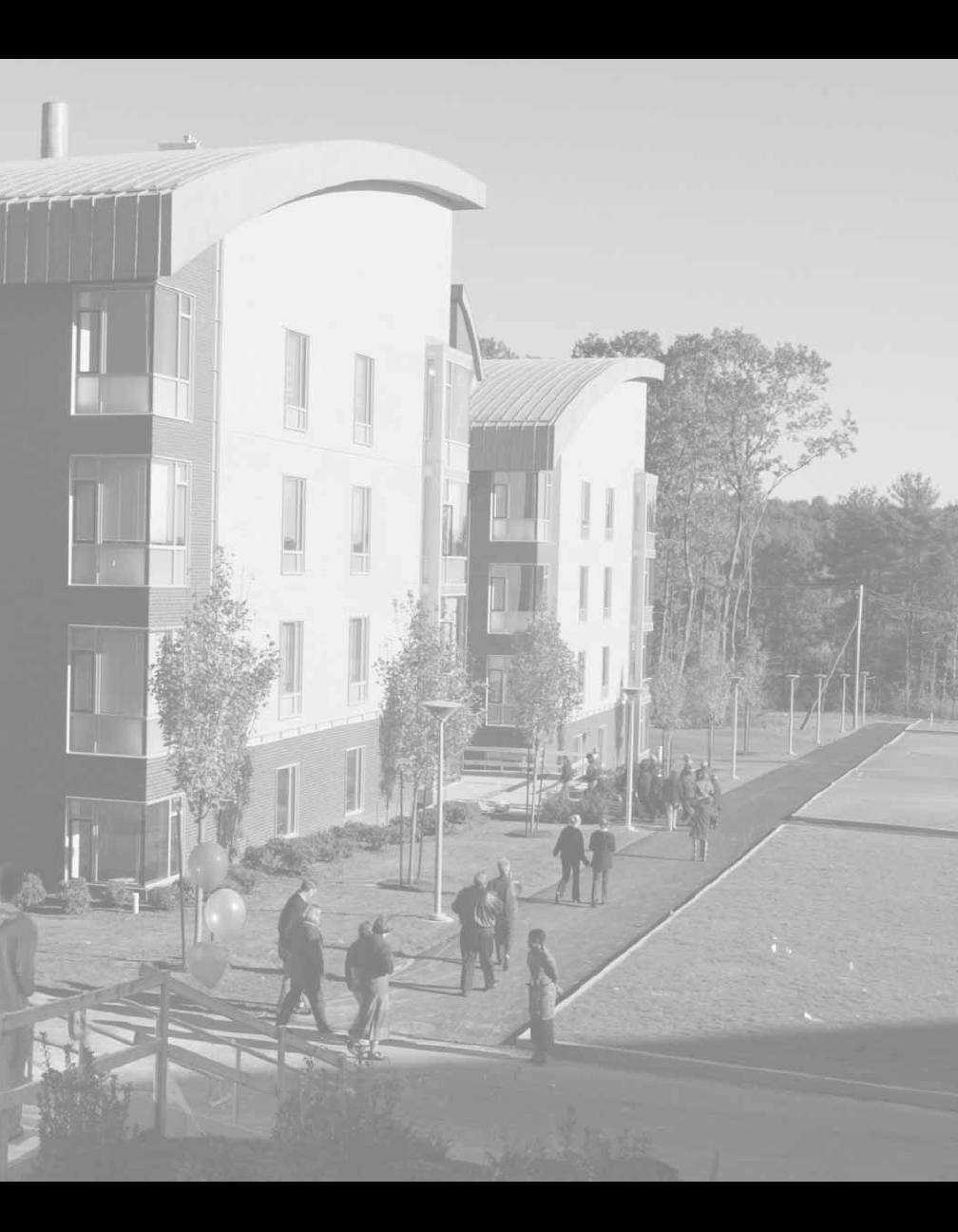
Board of Trustees,
President’s Council,
and Senior
Administration

Board of Trustees
William R. Cotter, J.D.
President Emeritus, Colby College
Mr. Cotter retired in November 2005 as
President of the Oak Foundation in Boston,
MA, an international philanthropic organization
focusing on social and environmental issues
around the globe. He remains as Chair of the
Oak Foundation’s Advisory Board, and is a con-
sultant to the Robertson Foundation in New
York. He served from 1979–2000 as President of
Colby College in Waterville, Maine, where he
remains a life trustee. Prior to joining Colby,
Mr. Cotter was President of the African-
American Institute in New York. He has also
served as assistant attorney general in north-
ern Nigeria, as an associate with a Wall Street
law firm in New York, as Representative of the
Ford Foundation for Colombia and Venezuela,
and as a White House Fellow. He has received
numerous honors and awards, including five
honorary degrees. Mr. Cotter serves on the
boards of several academic, philanthropic, and
non-governmental organizations. His published
writings concern the history of the abolition of
slavery in the United Kingdom and the U.S.,
foreign policy relating to Africa, and U.S. high-
er education. He is a graduate of Harvard
College (A.B. 1958) and Harvard Law School
(J.D. 1961). He and his wife Linda (Wellesley
’58; Harvard Graduate School of Education, ’60)
live in Concord, Massachusetts.
Tamara P. Davis, M.A.
Managing Director, Corporate Governance
Practice, Levin & Company, Inc.
Tamara P. Davis is the Managing Director and
leader of the Corporate Governance Practice at
Levin & Company, Inc. in Boston. In this role,
she consults with CEOs and Boards of national
entrepreneurial life science companies about
Board composition and effectiveness, gover-
nance best practices, and building Boards as
strategic assets. Previously, Ms. Davis served
as President, Chief Executive Officer, and
Director of UST Leasing Corporation, an invest-
ment banking/financial services company in
Boston. She was also formerly an Assistant
Dean of Humanities at Santa Ana College in
California and an educator within the Los
Angeles City Schools system. Ms. Davis is cur-
rently Chairman of the Massachusetts State
College Building Authority, a former Vice
Chairman of the Massachusetts Educational
Financing Authority, and a former Director of
the Massachusetts Board of Higher Education.
She also serves or has served on several cor-
porate, academic and nonprofit Boards. Ms.
Davis earned an M.A. (summa cum laude) from
California State University, Northridge and a
B.A. from University of California, Los Angeles.
C. Scott Gibson
CEO, Gibson Enterprises
Mr. Gibson is CEO of Gibson Enterprises, a
venture capital firm. He has spent more than a
decade as an investor and serving as chairman
of Radisys Corporation and five other public
companies, as well as a director of several non-
profits. Prior to founding Gibson Enterprises,
Mr. Gibson was the co-founder and president
of Sequent Computer Systems, which reached
$800 million in annual sales before being sold
to IBM. Previously, Mr. Gibson was employed
for seven years by Intel Corporation, where he
held various management positions, including
general manager of the Memory Components
Operation and marketing manager for the
Development Systems Operation. Mr. Gibson
received his M.B.A. in Finance and his B.S.
in electrical engineering from the University
of Illinois. He was awarded the Lifetime
Achievement Award from Oregon
Entrepreneurs Forum in 2001 and was recog-
nized as American Electronics Association’s
Oregon High Tech Executive of the Year in
1990.
William F. Glavin, M.B.A.
President Emeritus, Babson College
Mr. Glavin retired in 1997 as President of
Babson College, where he served for eight
years. As Babson’s ninth President, he is credit-
ed with advancing the school’s curriculum and
96
CATALOG
FRANKLIN W. OLIN COLLEGE OF ENGINEERING
BOARD OF TRUSTEESS ■

national reputation. Mr. Glavin joined Babson
after holding several leadership positions,
including Vice Chairman at the Xerox
Corporation. Prior to joining Xerox in 1970,
he held a number of senior executive positions
with IBM. Mr. Glavin has received numerous
honors and awards, including honorary Doctor
of Laws degrees from both The College of the
Holy Cross and Babson College, as well as
the Distinguished Alumni Award from the
University of Pennsylvania. He has served on
the board and advisory councils of several
corporations and academic institutions. He
received his B.S. from The College of the Holy
Cross and his M.B.A. from the Wharton School
of the University of Pennsylvania.
Carla L. Gude, M.A.
Former Vice President of Technology, IBM
Ms. Gude was Vice President of Technology,
IBM Corporate Staff, Somers, NY. She is an
experienced executive and information sys-
tems professional with 32 years of experience
with IBM in a wide variety of management and
executive positions for software product devel-
opment, information technology and corporate
technical strategy. In her many years with IBM
she served in various positions including vice
president of Systems Software, director of
Enterprise Workgroup Networking Software,
director of Process Support and Application
Architecture, and manager of Information
Systems. She is a member of several non-
profit health care Boards. Ms. Gude received
her B.A. from Vassar College and her M.A.
from Cornell University.
Paul C. Jennings, Ph.D.
Professor of Civil Engineering and Applied
Mechanics, Emeritus, California Institute of
Technology
Professor Jennings received his B.S. degree
in civil engineering from Colorado State
University and his M.S. and Ph.D. degrees,
also in civil engineering, from the California
Institute of Technology. After serving in the
United States Air Force as a member of the
faculty of the Air Force Academy, he joined the
faculty of Caltech in 1966. He served as chair-
man of the Division of Engineering and Applied
Science from January 1985 to November 1989.
He was Caltech’s vice president and provost
from November 1989 to February 1995.
Following that he became acting vice president
for Business and Finance until September of
1995; he held this post again in 1998–1999.
From 2004 to 2007 he again became Caltech’s
provost. He is a member of the National
Academy of Engineering, a past President of
the Earthquake Engineering Research Institute,
a past President of the Seismological Society
of America, and a Fellow and past-chair of the
California Council on Science and Technology.
Professor Jennings is the author of numerous
technical papers on earthquake engineering
and dynamics of structures and has served as
earthquake engineering consultant on the
design of high-rise buildings, offshore drilling
towers, nuclear power plants and other major
projects. He was a member of the Board of
Inquiry on the Loma Prieta earthquake appoint-
ed by California’s Governor Deukmejian. He is
the chair of Pasadena’s City Hall Restoration
Oversight Committee and he has served on
several committees of the National Academy
of Engineering and the National Research
Council, including chairing the Draper Prize
Committee, chairing the Committee on Natural
Disasters, and chairing the Committee on
Criteria for the Management of Los Alamos
and Lawrence Livermore National Laboratories.
His awards include the Newmark Medal and
the Huber Prize of the American Society of Civil
Engineers and the Honor Alumnus and
Achievement in Academia Awards from
Colorado State University. He is a Fellow of
both the American Academy of Arts and
Sciences and the Association for the
Advancement of Science.
Robert N. McBurney, Ph.D.
Chief Scientific Officer and Senior VP, Research
& Development, BG Medicine, Inc.
Dr. McBurney is chief scientific officer and
senior VP, Research and Development, at
BG Medicine, Inc., a biotechnology company
focused on discovering novel molecular
biomarkers and commercializing innovative
CATALOG
97
FRANKLIN W. OLIN COLLEGE OF ENGINEERING
■ BOARD OF TRUSTEES

molecular diagnostic products that improve
healthcare. He has over 30 years of experience
in biomedical research and management. His
responsibilities have ranged from conducting
independent, internationally-recognized med-
ical research as an academic, to leading an
emerging U.S. biopharmaceutical company,
Cambridge NeuroScience, Inc., as its president
and CEO. A biophysicist by training, Dr.
McBurney served on the faculty of the Medical
School of the University of Newcastle upon
Tyne (UK) for nine years and was assistant
director of the Medical Research Council’s
Neuroendocrinology Unit at Newcastle General
Hospital. He has also served on the research
staff at the National Institutes of Health in
Bethesda, MD, the Physiological Laboratory of
Cambridge University (UK) and the Medical
School of the University of New South Wales
(Australia). Dr. McBurney has initiated and
managed multiple projects to discover and
develop novel pharmaceutical treatments for
disorders of the nervous system, including
treatments to limit brain damage following
stroke and head injury. He also has extensive
experience in the formation and business
development activities of start-up biotech
companies and serves as chairman of the
Board of Differential Proteomics, Inc. He is for-
mer judge for the MIT $100K Entrepreneurship
Competition, the nation’s premier business
plan competition teaching students how to turn
their ideas into companies. An author of many
scientific papers, Dr. McBurney received his
Ph.D. from the University of New South Wales
in physiology.
Lawrence W. Milas, L.L.B.
President and Director, F. W. Olin Foundation,
Inc.
Mr. Milas has been a Director of the F. W. Olin
Foundation, Inc. since 1974 and has served as
President since 1983. During his tenure the
Foundation made more than $200 million in
building grants to colleges and universities
across the country. In 1993 Mr. Milas proposed
the establishment of Franklin W. Olin College
of Engineering to the Foundation Board. He
has led the development effort since the Board
approved the concept in 1997 and served as
the Founding Chair of the College from 1999
thru 2006. He was a partner in the former New
York City law firm of Baer Marks & Upham,
where he specialized in tax and trusts and
estate law. Currently, he is Of Counsel to
Thelen Reid Brown Raysman & Steiner LLP.
Mr. Milas has received honorary degrees from
Washington and Jefferson College, Whitman
College, Roanoke College and the F. W. Olin
Graduate School of Business at Babson
College. He is a recipient of the Babson Medal
from Babson College and served several terms
on Babson’s Board of Trustees. A 1958 gradu-
ate of Babson College (with distinction), he
received his LL.B. degree from Columbia
University in 1963.
Richard K. Miller, Ph.D.
Ex-Officio
President, Franklin W. Olin College of
Engineering
Professor of Mechanical Engineering
Before joining Olin College as its first
president, Dr. Miller served as dean of the
College of Engineering at the University of
Iowa from 1992–99. He spent the previous
17 years on the faculty of the University of
Southern California in Los Angeles and the
University of California, Santa Barbara. He has
published extensively in the field of applied
mechanics and has been recognized for teach-
ing excellence. He serves on the board and
advisory councils of several academic institu-
tions and one corporation. He received the
Distinguished Engineering Alumni Award from
the College of Engineering at the University
of California, Davis, where he received a B.S.
(with highest distinction) in 1971. He also
received an M.S. from MIT in 1972 and a Ph.D.
from Caltech in 1976. Dr. Miller received the
Legacy of Iowa Engineering Award from the
University of Iowa College of Engineering in
2006.
98
CATALOG
FRANKLIN W. OLIN COLLEGE OF ENGINEERING
s
BOARD OF TRUSTEESS ■

CATALOG
99
FRANKLIN W. OLIN COLLEGE OF ENGINEERING
■ BOARD OF TRUSTEES
William B. Norden, J.D.
Chairman of the Board
Director, Secretary and Counsel, F. W. Olin
Foundation, Inc.
Partner, Thelen Reid Brown Raysman & Steiner
LLP
Mr. Norden became Chairman of the Board of
the College in 2006. He is a partner in the law
firm of Thelen Reid Brown Raysman & Steiner
LLP in New York City and has extensive experi-
ence in legal matters related to trusts, estates
and charitable organizations. He has been a
director of the F.W. Olin Foundation, Inc. since
1988 and has served as secretary and counsel
to the Foundation since 1983. Mr. Norden also
serves on the Board of the Samuel and Rae
Eckman Charitable Foundation, Inc., the
New York City Fire Museum and the Honor
Emergency Fund of the Fire Department of the
City of New York. He received his B.S. in eco-
nomics from Brooklyn College in 1967 and his
J.D. from the New York University Law School
in 1969.
John W. Prados, Ph.D., P.E.
Vice President Emeritus and University
Professor, University of Tennessee
President Emeritus, ABET
Dr. Prados is vice president and University pro-
fessor emeritus at The University of Tennessee,
where he spent more than 50 years. He is a
former editor of the Journal of Engineering
Education of the American Society for
Engineering Education (ASEE) and is a
past President of ABET, Inc. (formerly, the
Accreditation Board for Engineering and
Technology). Dr. Prados has served as director
and treasurer of AIChE; executive counselor of
Tau Beta Pi; president and treasurer of Sigma
Xi, The Scientific Research Society; Chair of
the Engineering Accreditation Commission of
ABET; senior education associate at the NSF;
and advisor and consultant to more than 30
universities and state education agencies in
the U.S. and abroad. His awards and honors
include the L.E. Grinter Distinguished Service
Award of ABET; the James T. Rogers Award
of the Commission on Colleges, Southern
Association of Colleges and Schools, for out-
standing leadership in regional accreditation;
and the Lifetime Achievement Award in
Chemical Engineering Pedagogical Scholarship
from ASEE. He received his B.S. at the
University of Mississippi and his M.S. and
Ph.D. at The University of Tennessee, all in
chemical engineering, and is a registered
professional engineer in Tennessee.
Henry E. Riggs, M.B.A.
Founding President Emeritus, Keck Graduate
Institute of Applied Life Science
Mr. Riggs is the Founding President Emeritus
of Keck Graduate Institute of Applied Life
Science, founded in 1997 in Claremont, CA.
From 1988-97 he was president of Harvey
Mudd College. From 1974–88 he was the
Thomas Ford professor of Engineering
Management at Stanford University, where he
was also vice president for development,
1983–88. Earlier in his career he held officer
positions in two high technology companies.
Mr. Riggs hold a B.S. degree in engineering,
an MBA (with high distinction) from Harvard
University, and honorary doctorates from
Harvey Mudd College and Keck Graduate
Institute. He is the author of five books and
numerous articles and papers.

President’s
Council
The President’s Council is a group of distin-
guished advisors who volunteer their time to
counsel the president on a full range of issues
relating to curriculum, student life, administra-
tion and finance, governance, admission and
other topics important to the college.
John E. Abele
Cofounder and Director of Boston Scientific
Corporation
James E. Ashton, Ph.D.
Chairman of five companies in Materials,
Software, and Manufacturing and President of
Ashton Capital Partners
Atul Bhatnagar, MS.E.E.
Vice President of Products, DiVitas Networks
George R. Berbeco
President, The Devon Group and Chairman,
Bay Colony Development Corp.
Sunlin Chou, Ph.D.
Former Senior Vice President and General
Manager, Technology and Manufacturing
Group, Intel
James C. Curvey
Vice Chairman, Fidelity Investments
Stephen W. Director, Ph.D.
Provost and Senior Vice President, Drexel
University; former Dean of Engineering at the
University of Michigan
James J. Duderstadt, Ph.D.
President Emeritus and University Professor
of Science and Engineering, University of
Michigan
Sherwin Greenblatt, M.S.
Director, MIT Venture Mentoring Service;
former President, Bose Corporation; former
Executive Vice President, MIT
Daniel Hastings, Ph.D.
Dean for Undergraduate Education and
Professor of Aeronautics, Astronautics and
Engineering Systems at MIT
George N. Hatsopoulos, Ph.D.
Chairman and CEO Pharos, LLC and Founder
and Chairman Emeritus of Thermo Electron
Corporation
Wayne C. Johnson, M.B.A.
Chair
Vice President, University Relations Worldwide,
Hewlett-Packard Company
R. Mike Lockerd, PE (Ret.)
Executive Director, North Texas Regional
Center for Innovation & Commercialization
Venkatesh “Venky” Narayanamurti, Ph.D.
John A. and Elizabeth S. Armstrong Professor
of Engineering and Applied Sciences; Dean
of the School of Engineering and Applied
Sciences at Harvard University; and a professor
in Harvard’s Physics Department
100
CATALOG
FRANKLIN W. OLIN COLLEGE OF ENGINEERING
PRESIDENT’S COUNCIL ■

CATALOG
101
FRANKLIN W. OLIN COLLEGE OF ENGINEERING
■ PRESIDENT’S COUNCIL
John J. Piret, D.Sc.
Partner, Newbury Piret & Co., Inc.
Melvin R. Ramey, Ph.D.
Professor Emeritus of Civil and Environmental
Engineering at the University of California at
Davis and renowned teacher and student
adviser
Kwan Rim, Ph.D., CBE
Chairman, Samsung Foundation for
Sungkyunkwan University
Sheri D. Sheppard, Ph.D.
Professor of Mechanical Engineering, and
Co-Director, Center for Design Research,
Stanford University; and Consulting Scholar at
the Carnegie Foundation for the Advancement
of Teaching
Lee S. Shulman, Ph.D.
President of the Carnegie Foundation for the
Advancement of Teaching and Charles E.
Ducommun Professor of Education Emeritus,
Stanford University
Ralph Z. Sorenson, D.B.A.
General Partner of the Sorenson Limited
Partnership and President Emeritus, Babson
College
B. Samuel Tanenbaum, Ph.D.
Professor Emeritus and former Dean of Faculty
at Harvey Mudd College in Claremont, CA
Gregs G. Thomopulos, M.S.
Chairman & CEO, Stanley Consultants, Inc.
Jeffry A. Timmons, D.B.A.
Franklin W. Olin Distinguished Professor of
Entrepreneurship and Founding Director of the
Price-Babson and SEE Programs at Babson
College
Carol Tomlinson-Keasey, Ph.D.
Founding Chancellor of University of California
at Merced, the UC’s 10th campus located in the
Central Valley of California
Irving Wladawsky-Berger, Ph.D.
Vice President Technology and Strategy, IBM
Server Group
Lilian Wu, Ph.D.
Program Executive, University Relations and
Innovation, IBM Corporate Technology
William A. Wulf, Ph.D.
University Professor, University of Virginia,
Charlottesville VA, and Former President,
National Academy of Engineering, Washington
DC

Senior
Administration
Richard K. Miller, Ph.D.
President and Professor of Mechanical
Engineering
Dr. Miller was appointed the first president of
the Franklin W. Olin College of Engineering on
February 1, 1999. He also holds an appoint-
ment as a professor of mechanical engineering.
Before joining Olin College, he served as dean
of the College of Engineering at the University
of Iowa from 1992–99. At Iowa he initiated a
comprehensive curriculum revision, a major
facilities expansion and modernization project,
the first major private capital campaign for
the College of Engineering, an innovative
Technological Entrepreneurship Certificate
program, and an increase in external research
funding by more than 50 percent. He spent the
previous 17 years on the engineering faculties
at the University of Southern California (where
he held the position of associate dean for aca-
demic affairs) and the University of California,
Santa Barbara. With research interests in earth-
quake engineering and aerospace structural
design, he has served as a consultant to many
aerospace companies and directed research
programs funded by the National Science
Foundation, NASA, and industry. Dr. Miller has
published extensively in the field of applied
mechanics, and has won five awards for teach-
ing excellence. He earned a B.S. in aerospace
engineering from the University of California,
Davis in 1971, and is the recipient of the 2002
Distinguished Engineering Alumni Award from
that institution. He received an M.S. in mechan-
ical engineering from MIT in 1972, and a Ph.D.
in applied mechanics from Caltech in 1976.
He is a member of the Board of Trustees of
Babson College, the Board of Directors of The
Stanley Group, and serves on several advisory
boards for the government, non-profit organi-
zations and universities. He is also a member
of AIAA, ASCE, ASEE, and ASME.
Stephen P. Hannabury, M.B.A.
Vice President for Administration and Finance
Mr. Hannabury was appointed vice president
for administration and finance on August 11,
1999. Since then he has been responsible the
design and construction of the Olin campus,
the development of all administrative and
financial processes and systems, and the
establishment of all operational support func-
tions. In his role as the College’s chief financial
officer, he is responsible for overseeing the
management of the College’s endowment, the
management of the College’s debt portfolio,
and for all other financial and financial-planning
activities. Among the other areas reporting to
him are Campus Services, Human Resources,
Dining Services, Public Safety, Risk
Management and other operational areas of
the College. Prior to joining Olin, Hannabury
spent fifteen years at Boston University in a
variety of positions, including Assistant Dean
of the School of Management. Other experi-
ence includes working as a civil engineer and
as the director of a non-profit public sailing
organization. He received his B.S. in Civil
Engineering from Northeastern University and
an M.B.A. from Boston University. He serves as
the Treasurer of the Association of Independent
Technological Universities, is on the Board of
the Boston Consortium of Higher Education,
and on the Global Venture Capital Advisory
Board for Commonfund Capital, Inc.
Charles S. Nolan, Ph.D.
Vice President of External Relations and
Dean of Admission
Dr. Charles Nolan became the vice president
for External Relations and dean of Admission
on June 1, 2006. He was the former vice
provost for Enrollment Management at Santa
Clara University in Santa Clara, California. For
four years prior to that appointment, Dr. Nolan
was the founding dean of Admission at Olin
College. He has over 30 years of experience in
the field of admission and recruiting, serving
as director of Admission at Bentley College,
director of Undergraduate Admission at
Boston College, assistant provost and Dean
of Undergraduate Admission at Washington
102
CATALOG
FRANKLIN W. OLIN COLLEGE OF ENGINEERING
SENIOR ADMINISTRATION ■

University in St. Louis and dean of
Undergraduate Admission at Babson College,
where he successfully led an enrollment pro-
gram that substantially increased applications
and the SAT scores of incoming freshmen. He
is highly regarded nationally for his achieve-
ments in modern recruiting techniques. Dr.
Nolan received a Ph.D. in higher education
administration from Boston College and a B.A.
in history from Curry College. He has served as
a consultant for several colleges and universi-
ties, spoken at regional and national confer-
ences on innovative ways to involve the whole
campus in attracting and retaining high quality
students and co-authored a chapter on admis-
sion published in
Global Cases in
Benchmarking.
Michael E. Moody, Ph.D.
Vice President for Academic Affairs, Dean of
Faculty and F.W. Olin Professor of Mathematics
Dr. Moody joined Olin College from Harvey
Mudd College, an engineering-focused mem-
ber of the Claremont colleges in California. At
Harvey Mudd, Dr. Moody was the Diana and
Kenneth Jonsson professor of Mathematics
and chair of the mathematics department.
While there, he played a major role in a com-
prehensive curriculum design effort and built
the mathematics department into one of the
finest in the country. Dr. Moody received his
B.A. degree from the University of California
at San Diego in 1975, and completed a Ph.D.
in applied mathematics at the University of
Chicago in 1979. In 1981 he joined the faculty
at Washington State University. His appoint-
ment at Harvey Mudd began in 1994. Dr.
Moody’s research in biomathematics focuses
on genetic models for evolving populations.
His developmental work in teaching is concen-
trated on designing and implementing curricu-
lar models and technological tools to improve
mathematics education for engineers and
scientists. At Olin, he is responsible for creat-
ing a strong academic and administrative
infrastructure to advance the college’s unique
educational mission.
Roger (“Rod”) C. Crafts, Jr., Ed.D.
Dean of Student Life
Dr. Roger (“Rod”) C. Crafts, Jr. joined Olin
College from Brandeis University, where he
was Dean of Student Affairs from 1984 to 2000.
He has also held student affairs positions at the
University of Rhode Island and Indiana
University. Dr. Crafts is known nationally for his
creative innovations in the delivery of student
services and his dedicated and cohesive staff.
At Brandeis, Dr. Crafts was instrumental in
enhancing the sense of community for under-
graduate and graduate students and increasing
the undergraduate retention rate by more than
ten percent. He also substantially improved
coordination among the seven departments
within the Division of Student Affairs. Under
his leadership, Brandeis revamped its student
disciplinary system, joined the prestigious
University Athletic Association, and established
an Intercultural Center. At Olin, he is responsible
for helping to establish and preserve a rich and
diverse campus life that enhances student aca-
demic experiences. Among the areas reporting
to him are academic advising, residence life,
new student orientation, intramurals and recre-
ation, student activities, the honor code and
board, health services, psychotherapy and psy-
chiatric services, community service, spiritual
life, performing arts, registrar and student
accounts. Dean Crafts holds a B.A. in biology
from Earlham College and M.S.Ed. and Ed.D.
degrees from Indiana University.
Joanne Kossuth, M.S.
Associate Vice President for Development and
Chief Information Officer
As Associate Vice President for Development,
Ms. Kossuth has primary responsibility for pro-
gram development, integration and coordina-
tion of Olin’s efforts in fundraising. In addition
to her development duties, she is responsible
for fostering non-academic relationships with
neighboring institutions, including Babson,
Wellesley and Brandeis. She also holds the title
of chief information officer at the college. In
this role, she has had a unique opportunity to
design fully converged leading-edge technolo-
gy facilities at Olin College from scratch, as
CATALOG
103
FRANKLIN W. OLIN COLLEGE OF ENGINEERING
■ SENIOR ADMINISTRATION

well as to implement best IT practices from a
‘clean slate.’ Her IT leadership led to her being
named one of Computerworld’s Premiere 100
CIOs in 2005. Her previous experience includes
systems manager at Fisher College, director of
Information Technology at Wheelock College
and director of Computer Support Services at
the Boston University School of Management.
Ms. Kossuth’s professional background
includes a B.A. from Holy Cross College and an
M.S. from Lesley University with a concentra-
tion in developing and implementing informa-
tion systems for small businesses. She also
received technical certifications in areas such
as network and security engineering from
Novell, SANS, and Microsoft. She has been
involved for a number of years in EDUCAUSE,
a nonprofit association whose mission is to
advance higher education by promoting the
intelligent use of information technology. She
was selected as Chair of the 2020 committee
focused on insuring the future relevance of
EDUCAUSE to its members. Ms. Kossuth
currently serves as the Vice Chair of the 2008
EDUCAUSE Annual Program Committee for
EDUCAUSE and will be the Chair and host of
the 2009 Program Committee for the annual
conference in Denver. Her publications
include: “Attracting Women to Technical
Professions,” and “Building Relationships
Means Better IT Contracts,” both published
in EDUCAUSE Quarterly, as well as chapter
two on “Emerging Trends and Technologies”
in
Campus Communication Systems:
Converging Technologies
published by
ACUTA and chapter 32 in
Learning Spaces
edited by Diana Oblinger and published by
EDUCAUSE as an e-book. Ms. Kossuth pres-
ents frequently at conferences on topics
focused on emerging technologies, conver-
gence, performance management, staffing
and retention, and leadership development. In
addition, Ms. Kossuth is Chair of the Board of
NERCOMP (Northeast Regional Computing
Program), an EDUCAUSE affiliate of more than
260 institutional members. She also serves as a
member of the Town of Needham’s Technology
Advisory Committee.
104
CATALOG
FRANKLIN W. OLIN COLLEGE OF ENGINEERING
SENIOR ADMINISTRATION ■
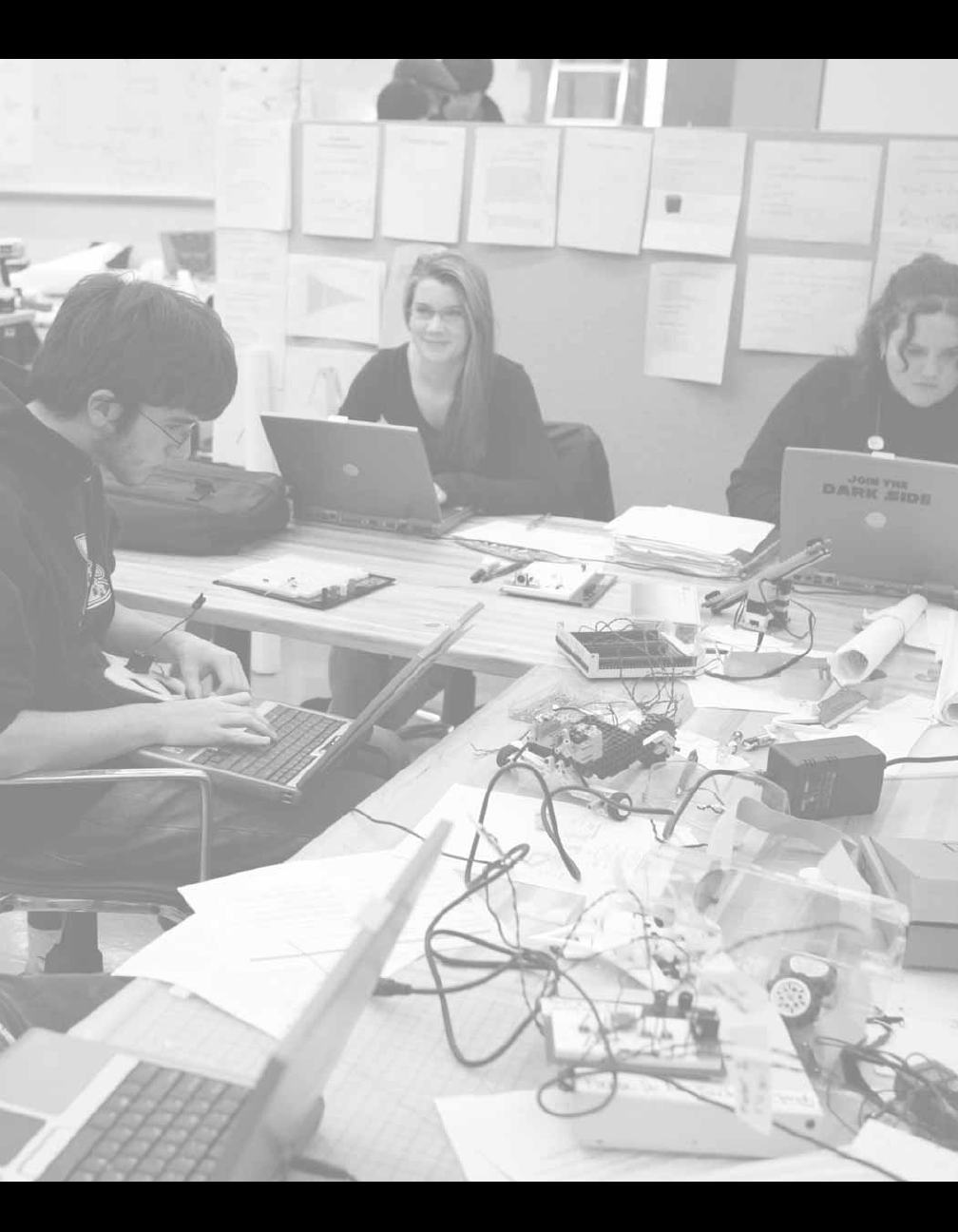
Appendices

Academic
Partnerships
The purpose of Olin’s academic partnerships is
to enhance Olin students’ opportunities for
learning, growth, and career development.
A close partner is also our closest neighbor,
Babson College. Babson, known for its commit-
ment to innovation and entrepreneurship, is
the perfect partner for an engineering college
that wants to incorporate business and
entrepreneurial thinking into its curriculum.
Wellesley College and Brandeis University are
also strong partners and provide our students
access to a wide range of exceptional courses.
Babson College
Partnership
The Olin/Babson partnership builds on exciting
synergies between business and engineering
to enhance the resources and opportunities
available to both institutions for innovative
teaching, learning and research. Olin faculty
work closely with the Babson faculty to devel-
op modules in entrepreneurship and business
basics that are integrated into the Olin curricu-
lum. Babson College has recently introduced
a M.S. in Management in Technological
Entrepreneurship tailored for Olin students.
The two institutions have also made several
joint faculty appointments, and sponsor a joint
academic center, the Sloan Center for Online
Education (SCOLE).
Cross-registration
Agreements
Olin has cross-registration agreements with
Babson College, Wellesley College, and
Brandeis University to increase the academic
offerings available to Olin students in the natu-
ral sciences, arts, humanities, and social sci-
ences. These agreements also bring students
from Wellesley, Brandeis and Babson to our
courses, thereby enriching the academic envi-
ronment at Olin. Through international study
opportunities — including a number of joint
agreements and special arrangements coordi-
nated by the Olin Study Away Program — the
opportunities for learning and growth literally
extend from the Olin campus to the whole
world.
Partnerships with
Industry
As students move through the Olin program,
the college’s hands-on approach is designed to
provide increasing opportunities for corporate
experiences and real-world learning. Olin has
reached out to the local high-tech community,
home to some of the most innovative compa-
nies in the world, to provide these learning
experiences, including internships and corpo-
rate sponsorship of research and design proj-
ects. Moreover, Olin is seeking to involve cor-
porations and corporate leaders in the develop-
ment of the college in such areas as curricu-
lum, career planning, and student recruitment.
Many of the most innovative companies have
representatives on Olin’s President’s Council.
106
CATALOG
FRANKLIN W. OLIN COLLEGE OF ENGINEERING
APPENDICES ■

Accreditation
Statement
Franklin W. Olin College of Engineering is
accredited by the New England Association
of Schools and Colleges, Inc. through its
Commission on Institutions of Higher
Education. Accreditation of an institution
of higher education by the New England
Association indicates that it meets or exceeds
criteria for the assessment of institutional qual-
ity periodically applied though a peer review
process. An accredited college or university
is one which has available the necessary
resources to achieve its stated purposes
through appropriate educational programs, is
substantially doing so, and gives reasonable
evidence that it will continue to do so in the
foreseeable future. Institutional integrity is also
addressed through accreditation.
Accreditation by the New England Association
is not partial but applies to the institution as a
whole. As such, it is not a guarantee of every
course or program offered, or the competence
of individual graduates. Rather, it provides rea-
sonable assurance about the quality of oppor-
tunities available to students who attend the
institution.
Inquiries regarding the accreditation status by
the New England Association should be direct-
ed to the administrative staff of the institution.
Individuals may also contact:
Commission on Institutions of Higher
Education
New England Association of Schools and
Colleges
209 Burlington Road
Bedford, MA 01730-1433
(781) 271-0022
ABET
Accreditation
Status
Olin’s curriculum provides the depth, breadth,
cohesion and rigor necessary to produce fully
qualified engineering graduates. The three
major degree programs (Electrical and
Computer Engineering, Engineering, and
Mechanical Engineering) have been designed
to meet the criteria outlined by the
Accreditation Board for Engineering and
Technology (ABET).
ABET accredits programs based on a campus
visit and thorough review of graduates’ records
and educational outcomes assessments. Olin’s
programs were reviewed by ABET in the fall
of 2006, and the Engineering Accreditation
Commission of ABET will issue its final report
in the early fall of 2007.
CATALOG
107
FRANKLIN W. OLIN COLLEGE OF ENGINEERING
■ APPENDICES

Policy on Equal
Opportunity
In accordance with its own values and with
federal and state regulations, Franklin W. Olin
College of Engineering does not discriminate
on the basis of race, color, creed, national or
ethnic origin, sex, gender identity, religion, dis-
ability, age, sexual orientation, disabled veter-
an status, veteran of the Vietnam Era status,
marital or citizenship status (except in those
special circumstances permitted or mandated
by law). This nondiscrimination policy encom-
passes the operation of the College’s educa-
tional programs and activities including admis-
sion policies, scholarship program, athletic and
other College-administered programs. It also
encompasses the employment of College
personnel and contracting by the College for
goods and services. The College is committed
to taking affirmative action to employ and
advance in employment qualified women and
members of minority groups identified in state
and federal Affirmative Action laws and execu-
tive orders, persons with disabilities (including
qualified special disabled veterans), and veter-
ans of the Vietnam Era. Further, the College
pledges to provide all members of its commu-
nity with a work and academic environment
free of intimidation, coercion, unfair treatment
or discrimination. The College seeks to create
and maintain an environment that is free from
inappropriate discrimination including harass-
ment.
The College’s policy of nondiscrimination is
consistent with Title IX of the Educational
Amendments of 1972, Title VI of the Civil
Rights Act of 1964, Title VII of the Civil Rights
Act of 1964, Executive Order 11246, the Equal
Pay Act, the Age Discrimination in Employment
Act, the Americans with Disabilities Act,
Section 504 of the Rehabilitation Act of 1973,
Section 503 of the Rehabilitation Act of 1973,
Section 402 of the Vietnam Era Veterans
Readjustment Assistance Act of 1974, the
Immigration Reform and Control Act of 1986,
the relevant Governor’s Executive Orders, and
Chapter 151B of the Massachusetts General
Laws.
If any member of the College community feels
that they have been discriminated against by a
student, she or he should contact the Office of
Student Life at 781-292-2323 to discuss possi-
ble referral of the matter to the Honor Board. If
any member of the College community feels
that they have been discriminated against by
an employee, she or he should contact the
Manager of Human Resources at 781-292-2429
to discuss investigation of the matter.
108
CATALOG
FRANKLIN W. OLIN COLLEGE OF ENGINEERING
APPENDICES ■

FRANKLIN W. OLIN COLLEGE OF ENGINEERING
■ CALENDAR
Academic Calendar for 2007–08
July–August Summer reading:
Ship of Gold in the Deep Blue Sea
by Gary Kinder
August 25(Sa) Arrival Day for Class of 2011; residence halls open at 9:00 a.m.; Welcoming
luncheon, afternoon program and dinner for new students and parents;
Farewell to parents; Orientation begins after dinner
August 26(Su)–29(W) Orientation: Academic Advising, Team Building and Leadership Skills
August 28(Tu) Upperclass students begin arriving after 5:00 p.m.
August 30(Th) First day of instruction, First Semester
September 3(M) [Labor Day – no classes]
September 17(M) Constitution Day
October 8(M) [Columbus Day – no classes]
October 9(Tu) Olin Monday – Monday class schedule in effect
October 11(Th) Career Initiatives Day – no classes
October 12(F)–14(Su) Family Weekend
October 18(Th) 33rd instructional day
October 28(Su) Admission Open House
November 14(W) Presidential Lecture Series (11 a.m.-Noon)
November 19(M)–23(F) [Thanksgiving Recess – no classes]
December 11(Tu) Last day of instruction, First Semester
December 12(W) Study Day
December 13(Th)–17(M) Final Exams
December 18(Tu) Exposition Preparation Day
December 19(W)–20(Th) Olin Exposition
December 21(F) Residence halls close at 5:00 p.m. for intersession
December 21(F)–January 21(M) [Intersession – no classes]
January 20(Su) Residence halls open at 5:00 p.m.
January 22(Tu) First day of instruction, Second Semester
February 18(M) [Presidents’ Day – no classes]
February 19(Tu) Olin Monday – Monday class schedule in effect
February 29(F)–March 1(Sa) Candidate Weekend I for Class of ‘12
March 7(F)–8(Sa) Candidate Weekend II for Class of ‘12
March 7(F) 33rd instructional day
March 17(M)–21(F) [Spring Break – no classes]
April 2(W) Big Conversation Series – no classes
April 17(Th) Olin Monday – Monday class schedule in effect
April 21(M) [Patriot’s Day – no classes]
May 1(Th) Last day of instruction, Second Semester
May 2(F)–5(M) Study Days
May 6(Tu)–9(F) Final Exams
May 12(M) Olin Exposition – Underclass projects and presentations
May 13(Tu) Olin Exposition – SCOPE presentations
May 14(W) Olin Exposition – Arts Celebration, Presentation of Special
Projects/Competitions, Capstone Information Sessions and Advising Meetings
May 18(Su) Commencement for Class of ‘08
May 19(M) Residence Halls close at 5 p.m.
FRANKLIN W. OLIN COLLEGE OF ENGINEERING
CATALOG
109
As of August 25, 2007. For the most current calendar visit:
http://www.olin.edu/student_life/calendar2007-2008.asp

Student Absence for
Religious Observances
Massachusetts state law regarding student
absence due to religious beliefs has been
adopted by Olin College as follows: “Any
student who is unable to attend classes or
participate in any examination, study, or work
requirement on a particular day because of his
or her religious beliefs is excused from any
such activity. The student will be given the
opportunity to make up the work that was
missed, provided that the makeup work does
not create an unreasonable burden upon the
College. The College will not level fees or
charges of any kind when allowing the
student to make up missed work. In addition,
no adverse or prejudicial effects will result
because students have made use of these
provisions.” The following partial listing is
provided for your information:
2007
September12 (sundown)–14 Rosh Hashanah
September 13 Ramadan begins
September 21 (sundown)–22 Yom Kippur
September 26 (sundown)–28 Sukkot
October 3 (sundown)–5 Shmini Atzeret
October 13 Eid-ul-Fitr (Ramadan
ends, approximate)
December 8 Immaculate
Conception
December 8 Bodhi Day
December 25 Christmas
2008
February 6 Ash Wednesday
March 20 (sundown)–21 Purim
March 20 Holy Thursday
March 21 Good Friday
March 23 Easter
April 19 (sundown)–26 Passover
May 1 Ascension Thursday
May 20 Buddha Day
June 8 (sundown)–10 Shavuot
110
CATALOG
FRANKLIN W. OLIN COLLEGE OF ENGINEERING
CALENDAR ■
